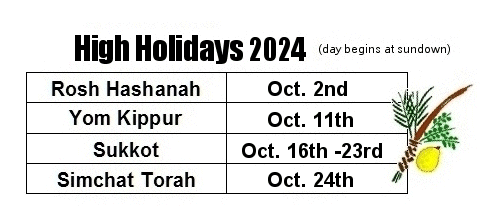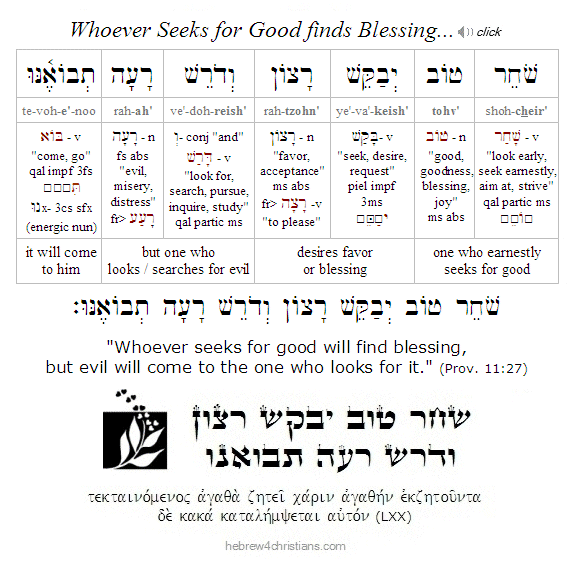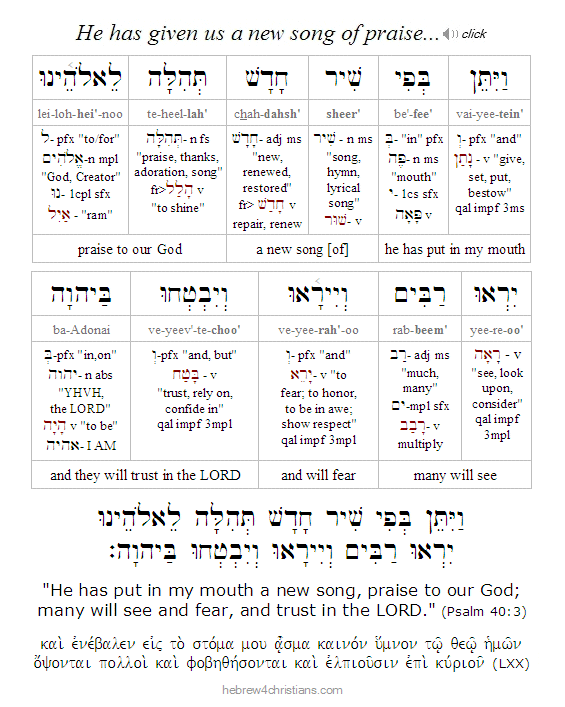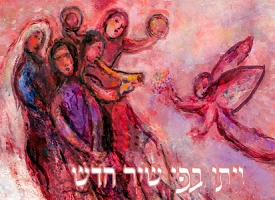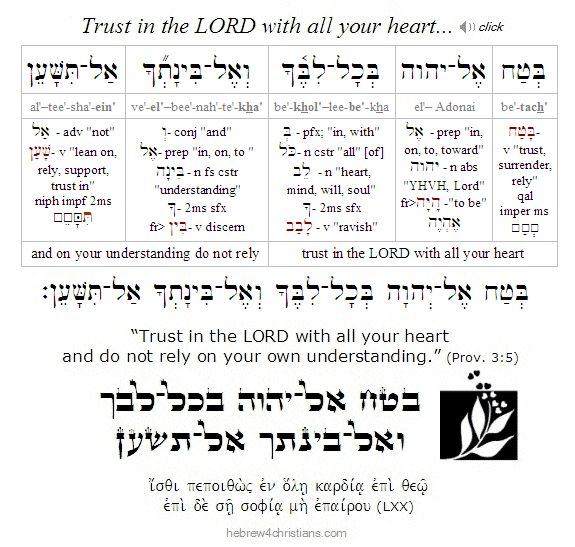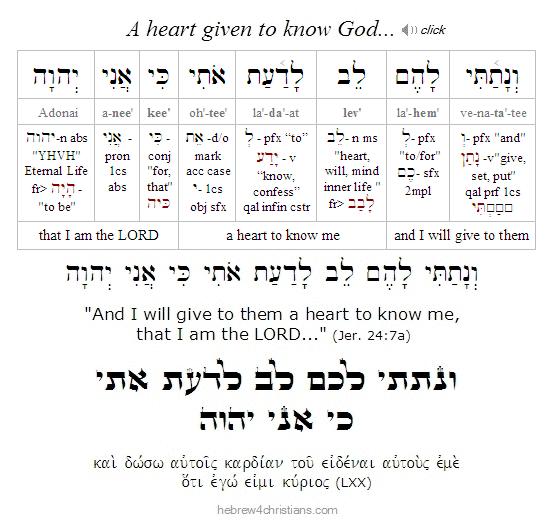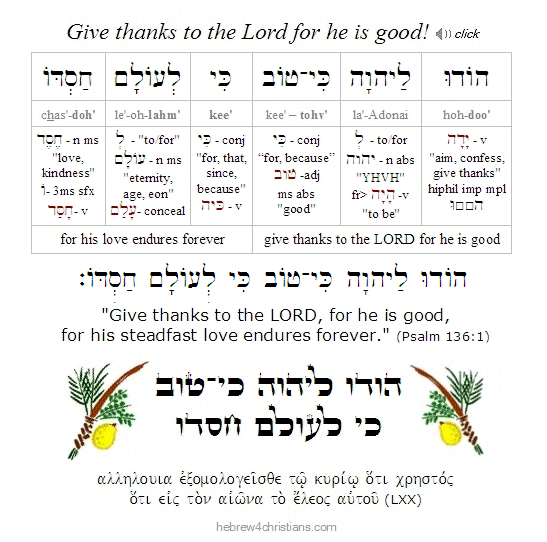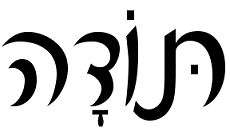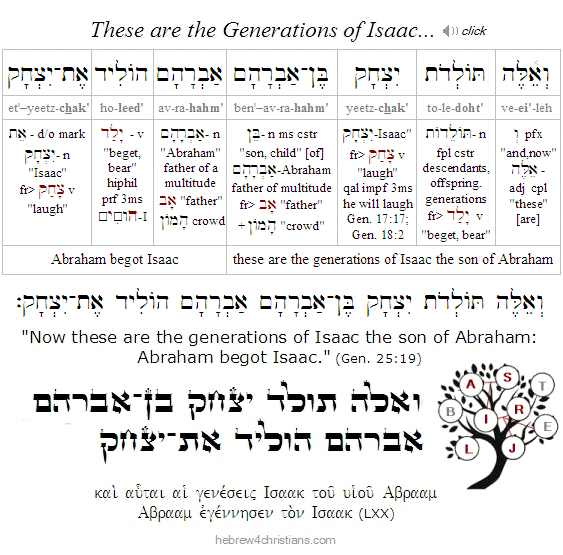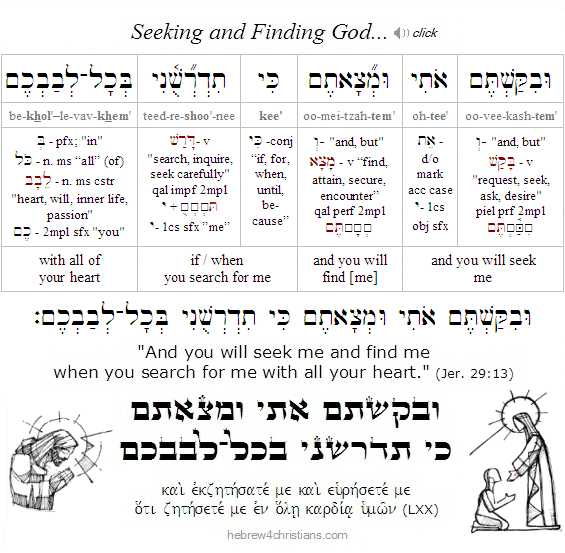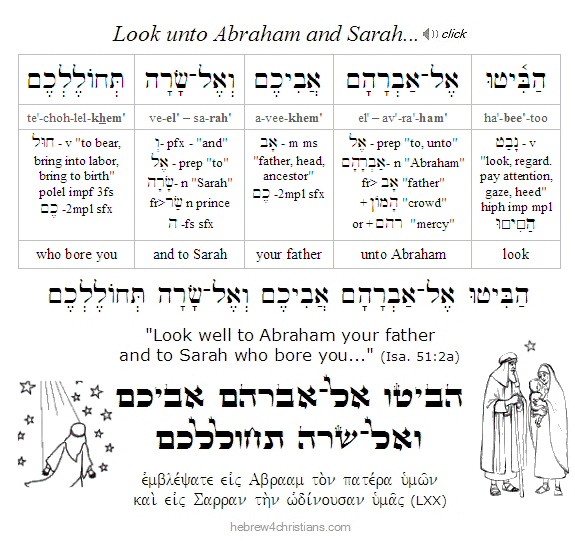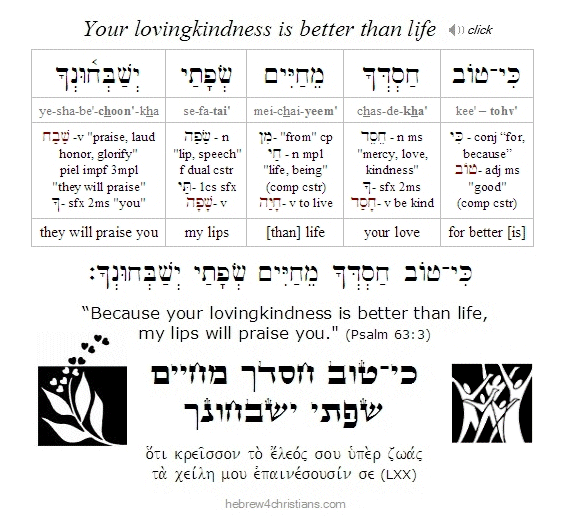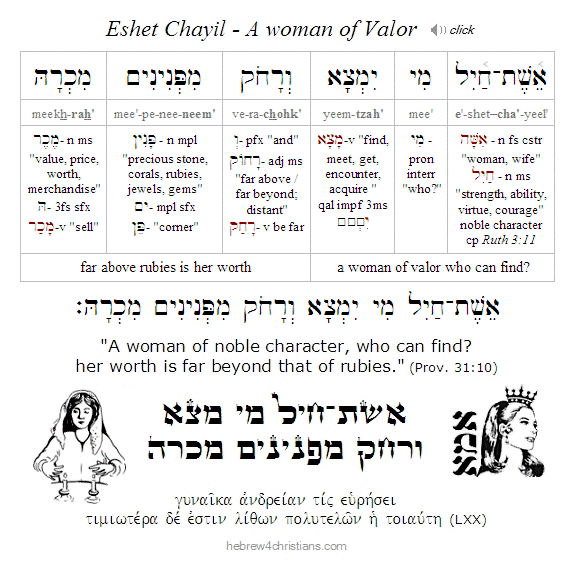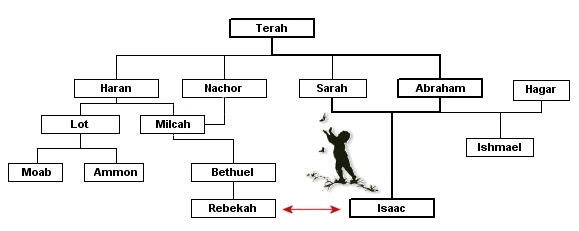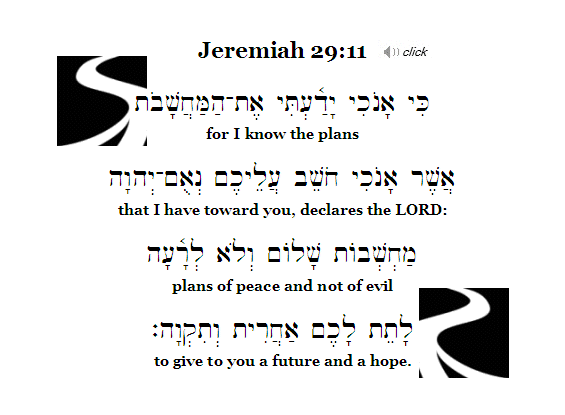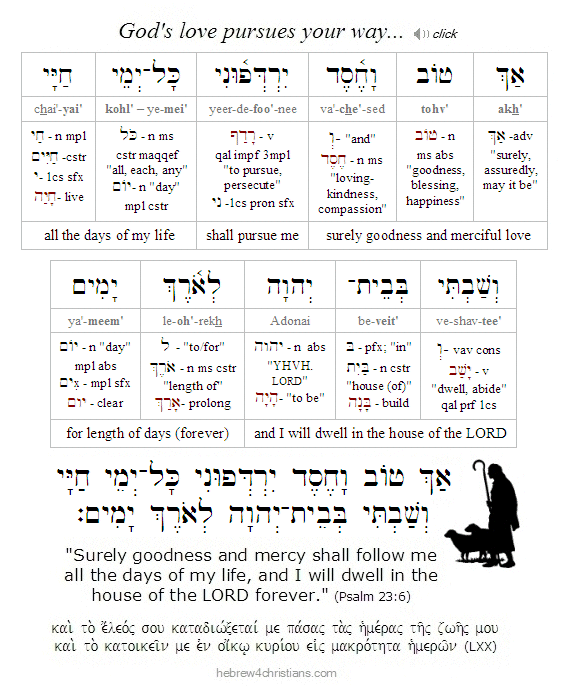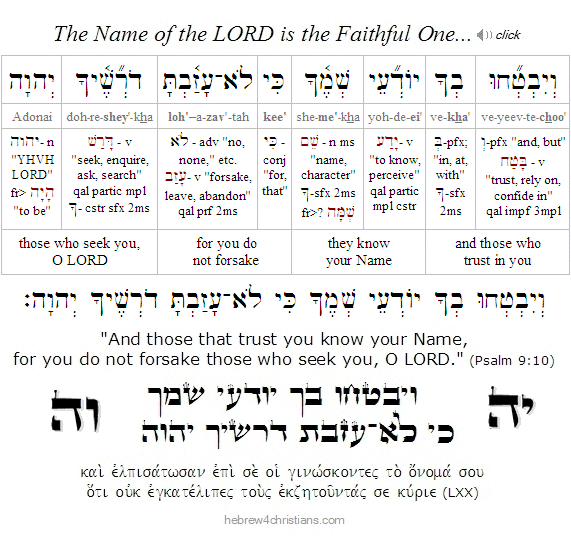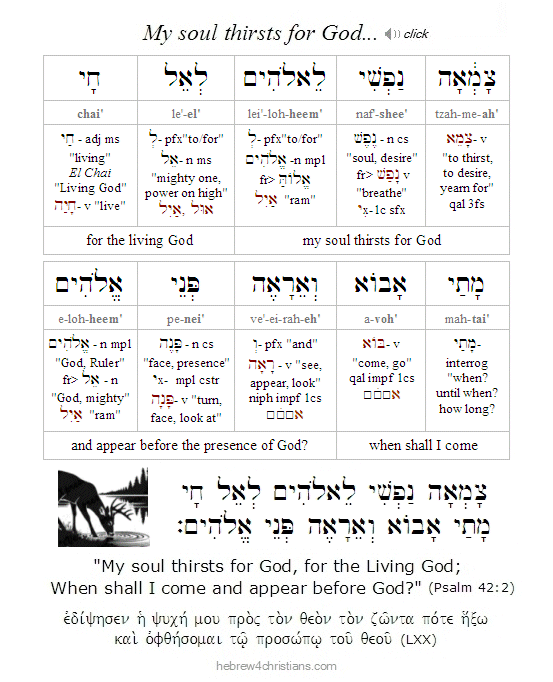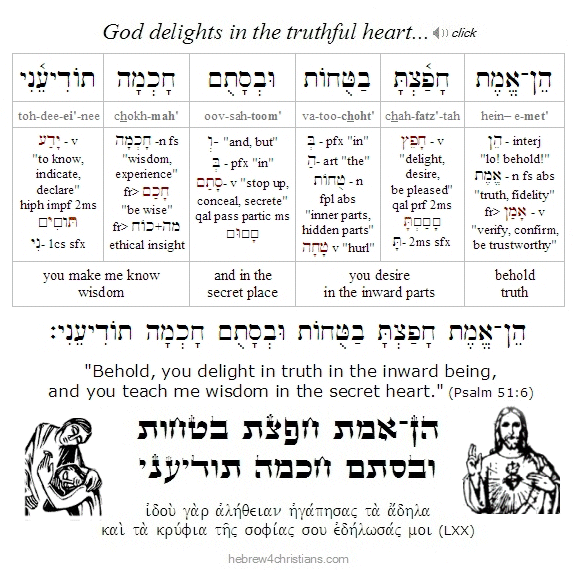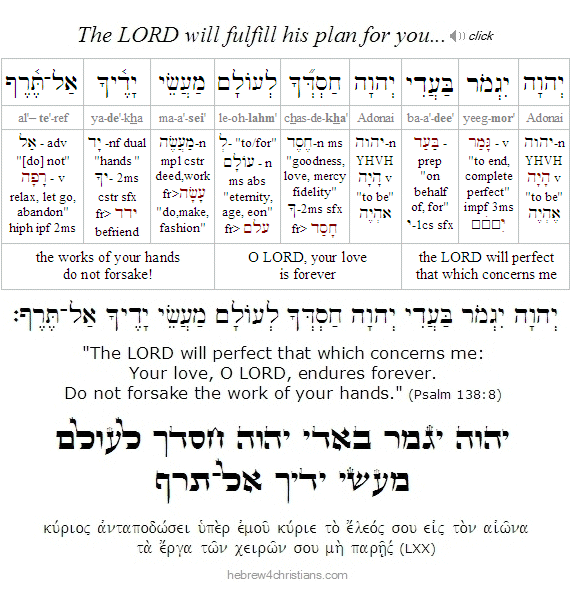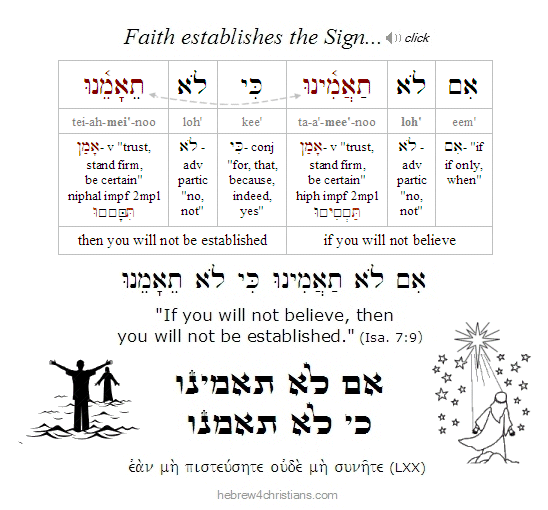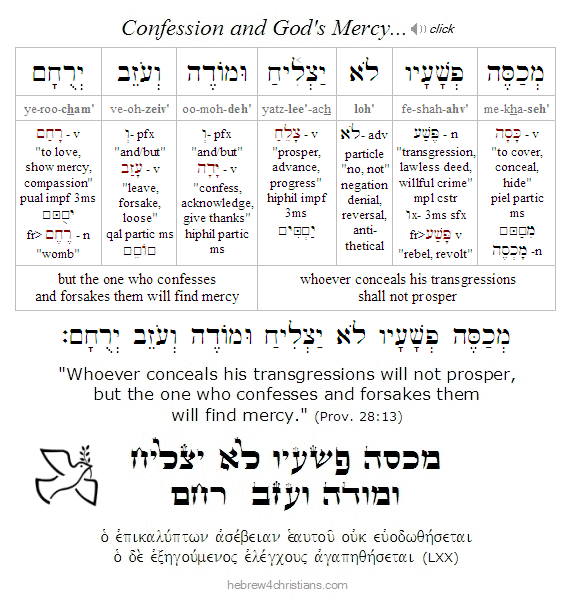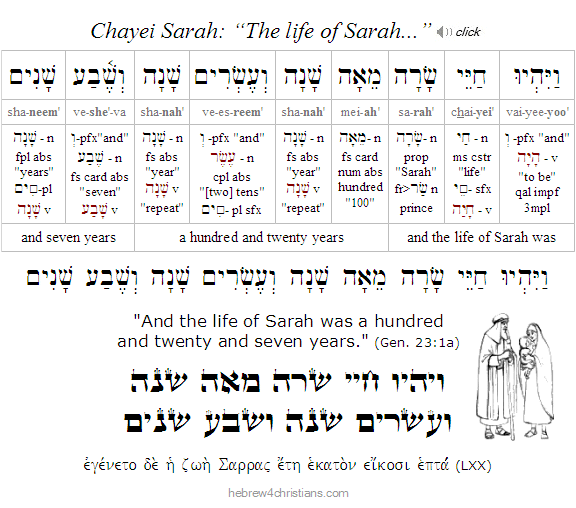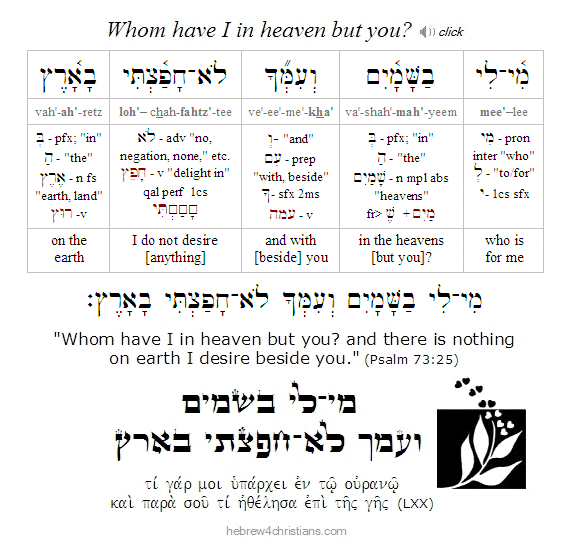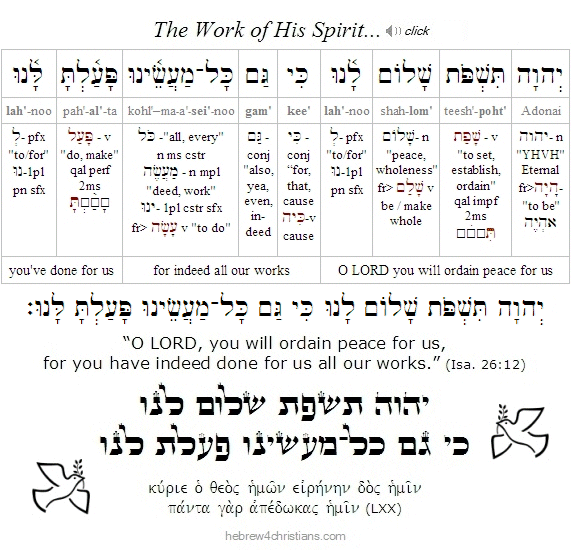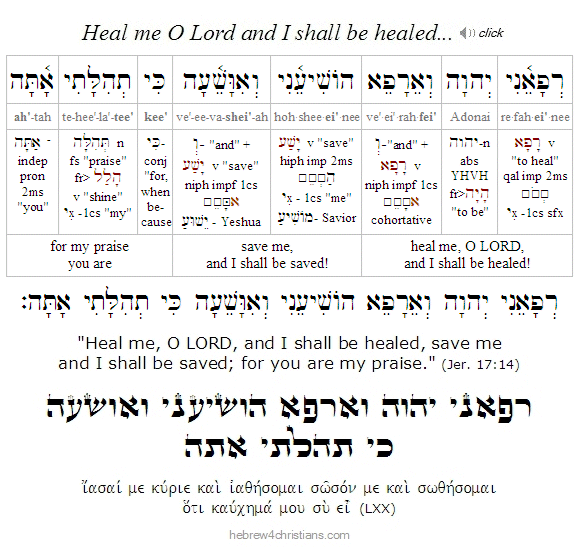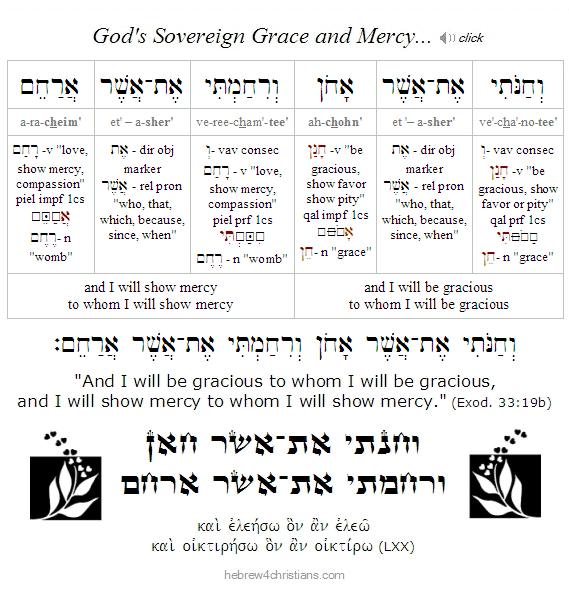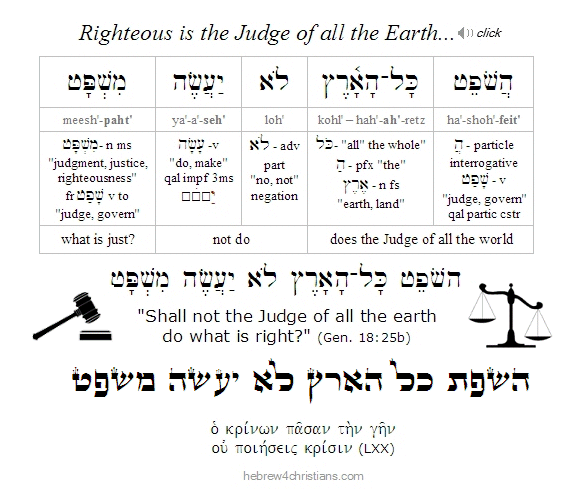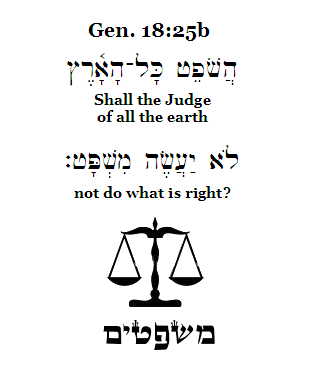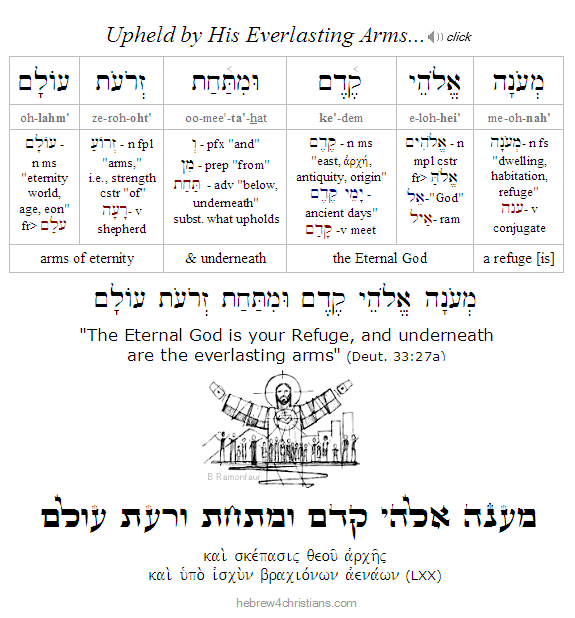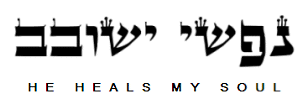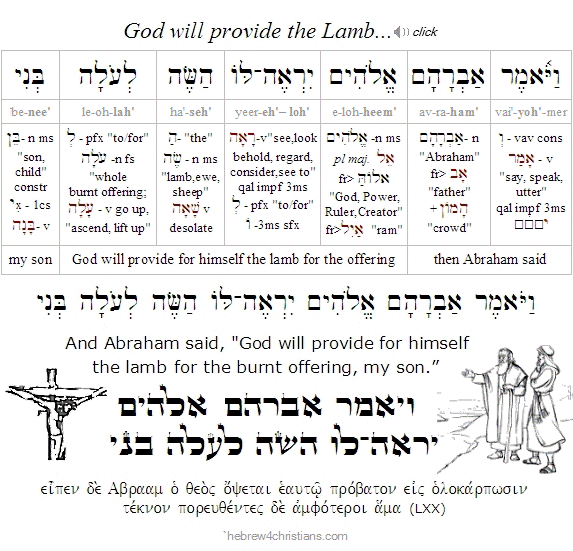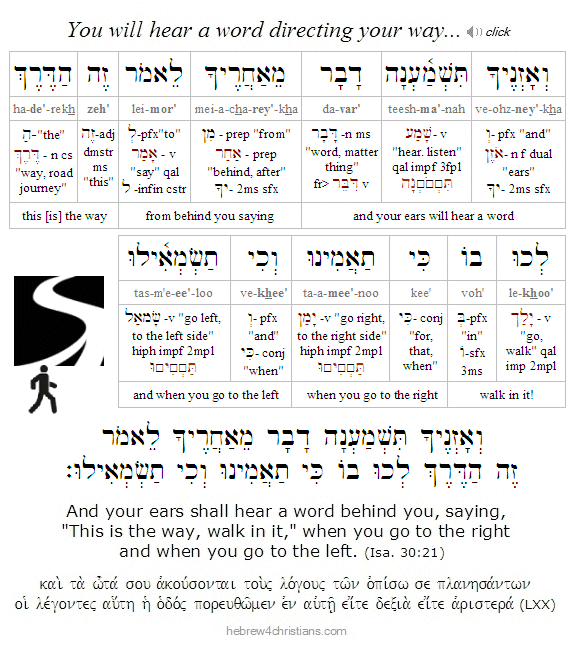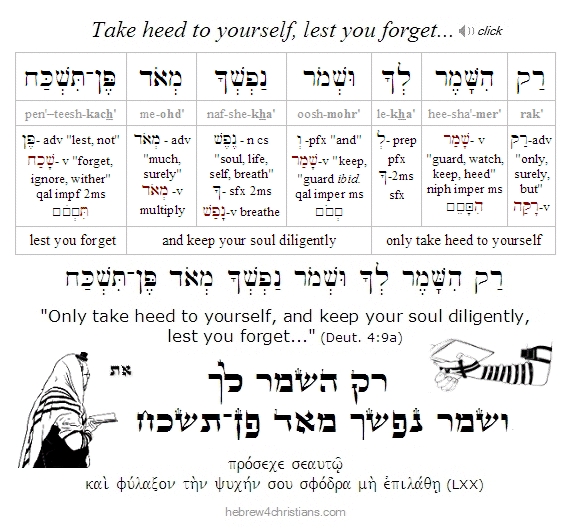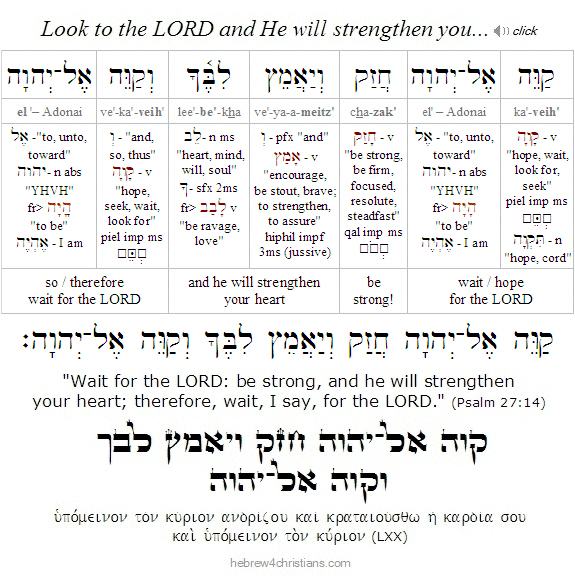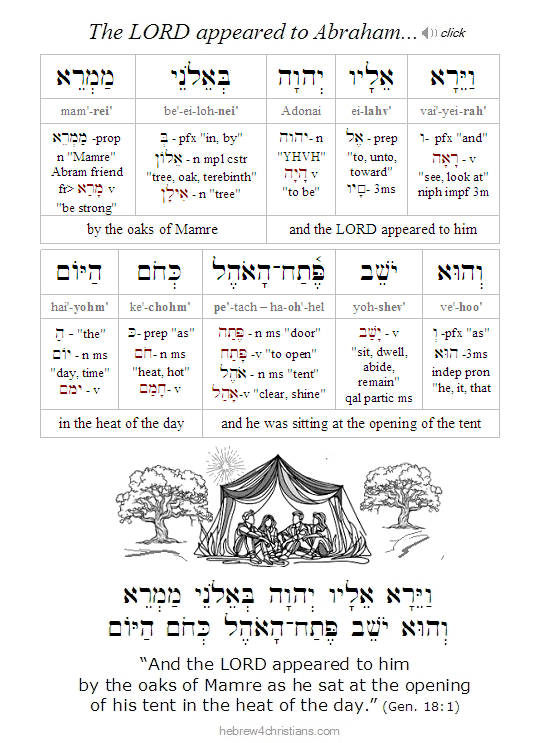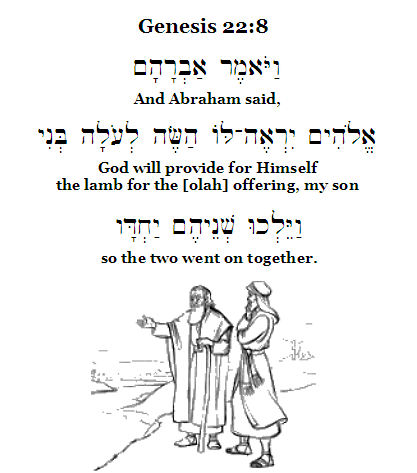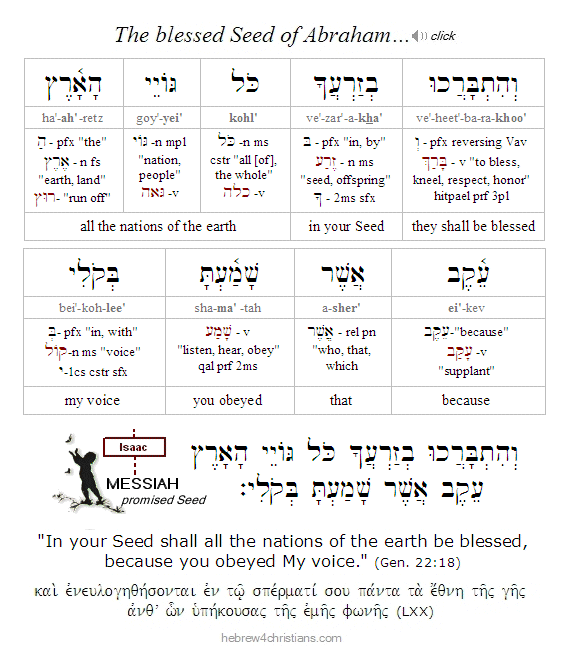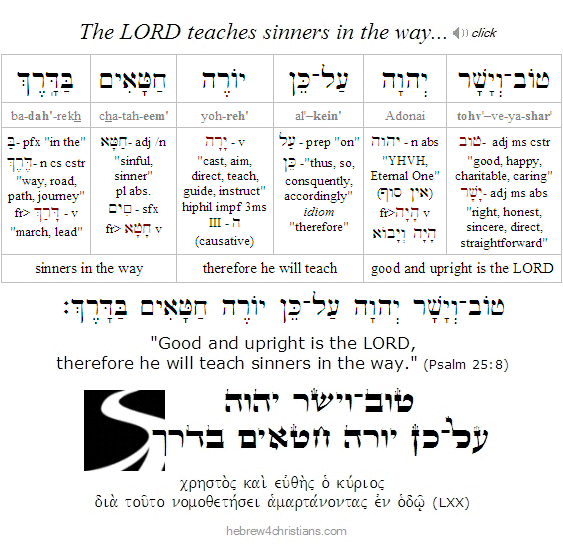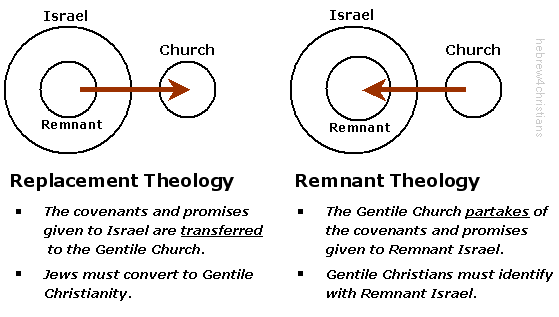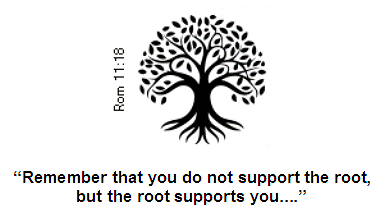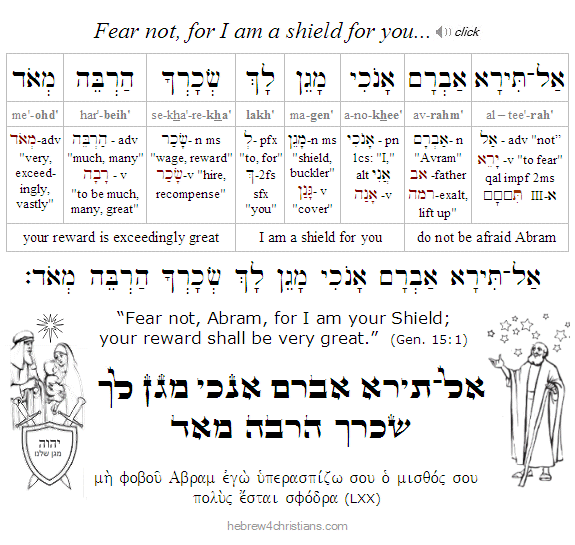|
Jewish Holiday Calendar
For November 2024 site updates, please scroll past this entry....
The Torah divides the calendar into two symmetrical halves: the Spring and the Fall, indicating the two advents of Messiah. The Biblical year officially begins during the month of the Passover from Egypt (called Rosh Chodashim, see Exod. 12:2), and the spring holidays of Passover, Unleavened Bread, and Firstfruits both recall our deliverance from Egypt and also our greater deliverance given by means of the death, burial, and resurrection of the Messiah, the great Passover Lamb of God. Yeshua was crucified on erev Pesach, buried during Unleavened Bread, and was resurrected on Yom Habikkurim (Firstfruits). The holiday of Shavuot (i.e., "Pentecost") both commemorates the revelation of the Torah at Sinai as well as the revelation of the Ruach HaKodesh (Holy Spirit) at Zion, in fulfillment of the promise given by our Lord....
The intermediate months of summer end with the advent of the sixth month of the calendar, called the month of Elul, which recalls the time Moses interceded on behalf of Israel after the sin of the Golden Calf. To commemorate this time of our history, we likewise focus on teshuvah (repentance) in anticipation of Rosh Hashanah and especially in anticipation of Yom Kippur, the great "Day of Atonement." In Jewish tradition the 30 days of Elul are combined with the first ten days of the seventh month (called the "Days of Awe") to set apart "Forty Days of Teshuvah" leading up to the Day of Forgiveness for Israel. Immediately following Yom Kippur, the mood changes as we begin preparing for a joyous week-long celebration called Sukkot (i.e., "Tabernacles") that concludes with the holiday of Simchat Torah.
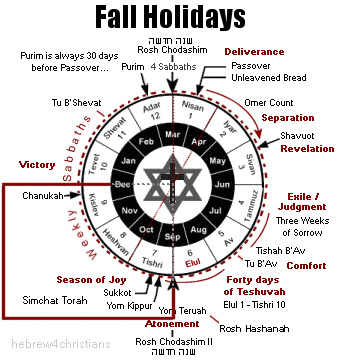 |
The Fall Holidays:

The fall festivals prophetically indicate the Day of the LORD, the second coming of Yeshua, the great national turning of the Jewish people, and the establishment of the reign of the Messiah upon the earth during the Millennial Kingdom in the world to come.
Note that in accordance with tradition, holiday dates begin at sundown. Moreover, some holidays may be postponed one day if they happen to fall on the weekly Sabbath:
1. Month of Elul (Mon. Sept. 2nd [eve] - Wed. Oct. 2nd [day])
2. Month of Tishri (Wed. Oct. 2nd [eve] - Thur. Oct. 31st [day]) - Fall holidays begin
3. Month of Cheshvan (Thur. Oct. 31st [eve] - Sat. Nov. 2nd [day])
- Five Sabbaths: Noach, Lekh-Lekha, Vayera, Chayei Sarah, Toldot
- Yom Ha'Aliyah - Honoring Israel's immigrants (Thur. Nov. 7th; Cheshvan 7)
- Sigd - 50th day after Yom Kippur; Ethiopian Jewish holiday (Tues. Nov. 26th)
4. Month of Kislev (Sat. Nov. 2nd [eve] - Mon., Dec. 30th [day])
- Four Sabbaths: Vayetzei, Vayishlach, Vayeshev, Miketz
- Winter Solstice: Fri. Dec. 20th, Kislev 20)
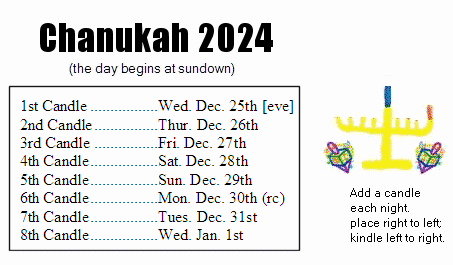
- Dates for Chanukah 2024 (5785):
- 1st Chanukah candle - Wed. Dec. 25th [i.e., Kislev 25] Christmas
- 2nd Chanukah candle - Thur. Dec. 26th [i.e., Kislev 26]
- 3rd Chanukah candle: Fri. Dec. 27th [i.e., Kislev 27]
- 4th Chanukah candle: Sat. Dec. 28th [i.e., Kislev 28]
- 5th Chanukah candle: Sun. Dec. 29th [i.e., Kislev 29]
- 6th Chanukah candle: Mon. Dec. 30th [i.e., Kislev 30]
5. Month of Tevet (Mon., Dec. 30th [eve] - Wed. Jan. 29th [day])
- Dates for Chanukah (continued):
- 7th Chanukah candle: Tues. Dec. 31st [i.e., Tevet 1]
- 8th Chanukah candle: Wed. Jan. 1st 2025 [i.e., Tevet 2] Zot Chanukah
- Secular New Year: Wed. Jan. 1st, 2025 (Tevet 1, 5785)
- Four Sabbaths: Vayigash, Vayechi, Shemot, Va'era
- Asarah B'Tevet - Fri. Jan. 10th (dawn); fast over the seige of Jerusalem
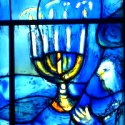 |
Note: For more about the dates of these holidays see the Calendar pages....
November 2024 Updates
Note: If any page content appears to be missing, please refresh the page...
Isaac's Troubled Family..
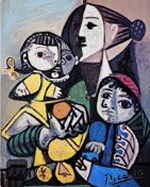
11.29.24 (Cheshvan 28, 5775) Like Abraham's wife Sarah, Isaac's wife Rebekah (רִבְקָה) had trouble getting pregnant, though Isaac determined never to resort to the use of a concubine as did his father. Indeed, the story of Hagar and Ishmael apparently haunted Isaac throughout his life. Therefore the Torah records that Isaac "entreated" (יֶעְתַּר) the LORD on behalf of his wife. The sages note that this verb (עתר) means to slaughter, alluding to sacrifice, and the midrash explains that Isaac ascended Mount Moriah, pitched a tent, and there offered a lamb during his prayers. This must have been terribly difficult for Isaac, since the trauma of the Akedah never left him. Nevertheless, Isaac's intercession for his wife proved fruitful, and Rebekah later conceived twins (Gen. 25:21).
Rebekah's pregnancy was not an easy one, however, and the children "struggled within her" (the Hebrew verb used here (רָצַץ) comes from a root that means "to run," suggesting that the children were "running in different directions" within the womb; see Rom. 9:11-12). According to Jewish tradition, Rebekah feared she might miscarry and decided to go to the School of Shem (i.e., Malki-Tzedek) to inquire of the LORD. There she was told that "two nations" were in her womb, and "two peoples from within you shall be divided"; the one shall be stronger than the other, the older shall serve the younger" (Gen. 25:23; cp. Rom. 9:11-12). When the children were born, the first came out hairy and was named Esau (perhaps from the Hebrew word esev (עֵשֶׂב), "grass"), whereas the second came out with his hand on his brother's heel, and was named Ya'akov (יַעֲקב, "grappler," from the word ekev (עָקֵב, "heel"). When the boys grew up, Esau was a skillful hunter, an outdoorsman, while Jacob was a quiet man, studying Torah in the tents of Abraham and Isaac (Gen. 25:27). In later Jewish tradition, Esau represented the nation of Rome (and especially Roman Christianity), whereas Ya'akov represented the nation of Israel.
Perhaps opposites attract. The Torah states that Isaac loved Esau whereas Rebekah loved Jacob (Gen. 25:28). Isaac grew up as the quiet, disciplined, and dutiful son of Abraham, and he perhaps saw something in his son Esau which he himself lacked. Rebekah, on the other hand, grew up adventuresome, strong, and outgoing, and she perhaps saw something in her son Jacob which she lacked. At any rate, the sibling rivalry was deep and abiding in the family, and perhaps reflected the problematic differences between the parents themselves. As we will see, Isaac and Rebekah were opposites, just as were their twin sons.
The Torah gives an episode in the lives of the two boys to indicate something of their respective characters. Once when Jacob was cooking lentil stew, Esau came in from the field quite exhausted. Esau said to Jacob, "Let me eat some of that red stew, for I am exhausted!" (Gen. 25:29-30). Some scholars note that Esau's words should be rendered, "Let me swallow from that red-red" (הַלְעִיטֵנִי נָא מִן־הָאָדֹם הָאָדֹם הַזֶּה), suggesting that he was in such a hurry to meet his bodly needs that he didn't even bother calling it "stew" (the Torah parenthetically notes here that this was the reason Esau was later known as "Edom" (אֱדוֹם, "red")). Jacob, however, decided to take advantage of his brother's carnal weakness by manipulating Esau into "selling" him his birthright. The Torah gives a realistic view of this exchange: while Esau "despised" his status as the firstborn son, Jacob was cunningly manipulative and exploited his brother's weakness.
Some time later, when Isaac "was old and his eyes were dimmed from seeing," he sought to bless Esau as the family heir before he died (Gen. 27:1-4). The midrash states that Isaac's eyes were dimmed on account of the ordeal of the Akedah. When he was bound to the altar, Isaac looked up and saw the Throne of Glory with the angels of God circling about. Some of the angels' tears fell on Isaac's eyes, and from that time his eyes had begun to darken. Perhaps Isaac "saw" God as Elohim (אֱלהִים) - the Judge and Ruler of the Universe - but became blind to God as YHVH (יהוה), the Source of Compassion and mercy. The "afterimage" of the Akedah never left him - despite the divinely supplied substitute of the ram - and haunted him later as a form of blindness. Isaac revealed that he was "blind" to the character of Esau, "blind" to his wife's vision regarding Jacob, and so on.
When Rebekah overheard Isaac's plans, she decided to "trick" her husband into conferring the blessing upon Jacob instead of Esau. For his part, Jacob was left with a serious dilemma: Either he had to defy his mother or else deceive his father. And of course Rebekah knew that Isaac would discover the deception after the fact. Rebekah's deception of her husband was intended to show him that he was gullible and thereby easily deceived by Esau's hypocrisy. It was an object lesson, if you will, rather than a outright case of lying. After all, Esau was soon to arrive - venison in hand - and the charade would be exposed for all to see... Apparently Rebekah's plan was to "open the eyes" of her myopic husband, revealing to him that he had been guilty of sacrificing the righteous son Jacob for the sake of deceptive Esau (for more on this, see the "Deception of Esau").
The trickery proved to be tragic, however, for everyone involved. Jacob desperately wanted the love and approval of his father, but he sought to get it through false pretenses. "Come close and kiss me my son..." (Gen. 27:26). This was Jacob's deep desire, and yet after "grappling" the blessing from his father he ironically lost his father's embrace. Indeed, Jacob lost not only his father's embrace, but his mother's as well (after fleeing to Haran, Jacob never saw his mother again). Moreover, Jacob's pathetic attempt to "be Esau" severed any hope of a relationship with his twin brother, who afterwards became his sworn enemy. Away from home and on the run, Jacob's life was also marked with painful irony. He was later deceived by his father (in-law) Laban, his wife Leah, his firstborn son Reuben, and even by his own children (regarding the death of Joseph, his firstborn son from Rachel). And Rebekah's subterfuge cost her dearly, too: after the charade was exposed, Esau turned against her (Gen. 27:45), Jacob was lost to her forever, and her marriage undoubtedly suffered as a result of the duplicity....
When Esau returned from his hunting expedition to receive the blessing, the truth came out, but Isaac tremblingly acknowledged to his son: גַּם־בָּרוּךְ יִהְיֶה / "... he (Jacob, not Esau) shall be blessed" (Gen. 27:33). Isaac "trembled exceedingly" because he realized that he had been laboring under an illusion all these years. He now finally understood the truth about his sons and ratified heaven's decision. It is ironic that when Isaac had his sight, he favored Esau, but when he lost his (physical) vision he was enabled to give Jacob the blessing as the patriarch of Israel.
After Esau realized the implications, he used wordplay used to vent his anger: When he learned that Jacob had taken away his blessing, he exclaimed, "Is he not rightly named "heel holder" (i.e., יַעֲקב, "Jacob," from the word עָקֵב, "heel")? For he has taken me by the heel (יַּעְקְבֵנִי) these two times. He took away my birthright, and behold, now he has taken away my blessing" (Gen. 27:36). Then he cried out, "Have you only one blessing, my Father? Bless me too, my Father!" And Esau wept aloud." This was a terribly poignant moment. Esau didn't accuse his father of being gullible or foolish, but simply implored him for his blessing all the more. Tragically, Esau learned the value of the blessing too late. Despite his many tears, he could not reverse the decree from heaven (see Heb. 12:16-17).
The sages talk about the "voice of Jacob" (קוֹל יַעֲקֹב) and the "hands of Esau" (יְדֵי עֵשָׂו) (Gen. 27:22). Both sons were counterparts of one another, though each needed the qualities of the other to be complete. Esau needed to learn the ways of Jacob - to love Torah, to respect the call of the family to be God's agents in the world, to value the things of heaven, and so on, whereas Jacob needed to learn the ways of Esau - to be a man of action, to work with his hands, to deal with the rough-and-tumble world at large. After Jacob fled to Haran to escape the clutches of his aggrieved brother, he learned to be a shepherd, a husband, and a father. In this way Jacob also learned the value of the blessing given to Esau, although this too was discovered needlessly late in his life.
In Jewish tradition, Abraham is known primarily for the quality of chesed (חֶסֶד), "kindness," "openness," "expansiveness," hospitality, and generosity. His tent flaps were always open to all who happened to come his way. He was outgoing, welcoming, and solicitous for the welfare of others. His son Isaac, on the other hand, is known primarily for his quality of gevurah (גְּבוּרָה), "strength," "focus," concentration, and discipline. Isaac meditated alone in the fields, stayed close to his tent, and never ventured outside the Promised Land. The sages note that chesed unrestrained by gevurah is unbalanced (leading to indiscriminate leniency and gullibility), whereas gevurah unrestrained by chesed is also unbalanced (leading to stern judgmentalism or cruelty). Whereas Abraham was willing to sacrifice his beloved son at Moriah (chesed), Isaac was willing to be sacrificed (gevurah). The ideal is to have both chesed and gevurah function together (חסד וגבורה) to create an inner balance. This ideal is sometimes called tiferet (תִּפְאֶרֶת) and is thought to have been the characteristic later evidenced by Jacob (i.e., after he was renamed "Israel" at Peniel). The enmity of Esau (the extreme of gevurah) haunted Jacob for years, even to the point of wrestling with the Angel of LORD over the issue (Gen. 32:24-29). From such wrestling (i.e., between the ideal of justice and the ideal of chesed) came an inner resolution -- the true blessing from God that resulted in a "limp" -- and the new name of "Israel" (יִשְׂרָאֵל, Gen. 32:28).
Some have speculated what it would have been like for the twins if Isaac and Rebekah had a better relationship. Was their marriage mirrored in the lives of their sons? Why didn't Rebekah tell Isaac about the prophecy about the "elder serving the younger" -- or if she had told him, why didn't Isaac listen to her? And why didn't Isaac tell Rebekah about his plan to bless Esau as the heir of the family? Was Rebekah justified deceiving her husband? Was Jacob justified for believing the promise God had made to his mother that he would be the heir of the family? And why did each parent favor a different child, thereby creating a ferocious sibling rivalry? Rebekah perhaps encouraged Jacob's duplicity because she felt ignored or disrespected by her husband. She therefore found an ally in her son -- a "tool" she could use to find leverage and a voice in the family. But Isaac perhaps encouraged Esau's profanity because he never resolved his inner turmoil regarding the Akedah. Perhaps he inwardly chafed at the ideal of strict justice and wanted to be set free.... After all, Isaac was wounded and left nearly blind from the encounter of God as Judge, but somehow he could not embrace God's sacrificial love for himself...
It's clear that the families of the patriarchs had serious struggles and were often quite dysfunctional. When we idealize these people, however, we tend to forget their humanity, and they may appear disconnected from us - on a higher spiritual level. For example, Isaac is often characterized as the obedient son who was willing to be sacrificed at Moriah at the hands of his loving father, whereas Abraham is characterized as being so "sold out" to God that he was willing to sacrifice the son he so dearly loved. Now while it is gloriously true that the sacrifice of Isaac presents a clear foreshadowing of the greater "Akedah message" of the Gospel (John 3:16), there is a human side to this story that is sometimes overlooked. Jewish tradition states that Sarah died from the shock of the Akedah, leaving both Abraham and Isaac bereaved. Isaac's "personal holocaust" at the hands of his father caused him to suffer from post traumatic stress disorder that profoundly affected him for the rest of his life: He struggled as a son (he fled from his father Abraham after the Akedah), as a husband (he seemed unable to communicate with his wife), and as a father (his preference of Esau over Jacob caused a terrible rift in the family). Most of all Isaac struggled to understand God's love, despite God's justice...
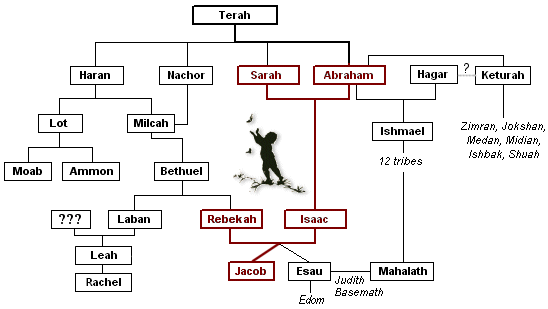 |
The story of Isaac's family is ultimately one of hope for us all. Isaac was deeply wounded but ultimately found healing, just as his son Jacob later wrestled through his family issues to become "Israel." Take heart, chaverim: God can use us for His kingdom purposes despite whatever dysfunctionality might be in our family backgrounds.
Hebrew Lesson:
Proverbs 11:27 Hebrew Reading (click):
Prayers in the dark...

11.29.24 (Cheshvan 28, 5775) "I believe that you have complete power and authority over the world and its evil, Lord, but I am unsure how that operates in light of its seeming absence.... You stop the mouth of lions, yet the lion's den is astir; you heal the sick, yet we bury our dead; you say we are saved, yet much within us remains broken... My faith tries to see beyond the pale of this temporal world and its shadows, yet I am still bound by it, still subject to its vanity, still in a place of exile. When I look for you here, in this moment, I find my heart homesick and yearning; I seek your face... I call you Father but I feel orphaned in this world... It is not why I suffer that I want to know, Lord, but whether I suffer for you."
"Though the fig tree should not blossom, nor fruit be on the vines, the produce of the olive fail and the fields yield no food, the flock be cut off from the fold and there be no herd in the stalls, yet I will rejoice in the LORD; I will take joy in the God of my salvation (אֱלהֵי יִשְׁעִי), literally, "the God my Jesus" (Hab. 3:17-18). In Your light may we see light...
Hebrew Lesson
Isaiah 12:2 reading (click for audio):
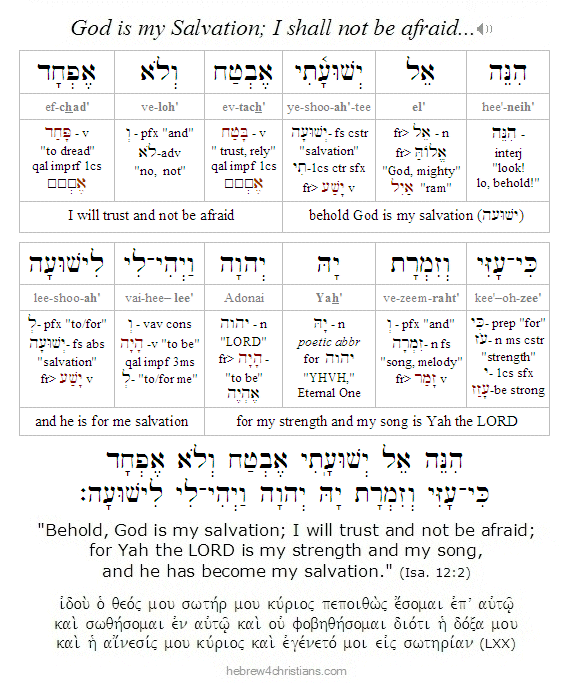 |
Broken and Remade...

The following is related to this week's Torah reading, parashat Toldot...
11.29.24 (Cheshvan 28, 5785) "See to it that no one fails to obtain the grace of God; that no root of bitterness (שׁרֶשׁ פּרֶה) springs up and causes trouble, and by it many become defiled; that no one is immoral or profane like Esau, who sold his birthright for a single meal. For you know that afterward, when he desired to inherit the blessing, he was rejected, for he found no chance to repent, though he sought it with tears" (Heb. 12:15-17; Gen. 27:38).
The LORD says, "my people have committed two evils: they have forsaken Me, the fountain of living waters (מְקוֹר מַיִם חַיִּים), and hewed out cisterns for themselves, broken cisterns that can hold no water" (Jer. 2:13). Spiritually speaking, there are two basic sorts of breaking. One is to be broken by the inevitable sin and ruin of this world, and the other is to be made lev-nishbar (לֵב־נִשְׁבָּר), a broken heart, before the LORD. The former breaking comes from the vain attempt to find life in the broken vessels of this world, and "repentance" is expressed as remorse over perceived temporal loss. This sorrow eventually leads the soul to death (2 Cor. 7:10). To be inwardly broken, on the other hand, requires mourning over your life and returning to God for deliverance (Matt. 5:4). In hunger and thirst for God's righteousness the soul finds eternal satisfaction, since God alone provides the vessel of "living water" we need to live (John 4:14; 7:38). We all must drink from God's fountain of life (מְקוֹר חַיִּים), lest we suffer spiritual dehydration and death....
Are you haunted by an inner ache for love, joy, peace, and life? "Blessed are those who hunger and thirst for righteousness, for they shall be satisfied" (Matt. 5:6). Our inner poverty and need is a disguised grace; our desire for healing reveals the Spirit's invitation. Faith begins with the recognition of our need, since only then will we come to Yeshua for the "Bread of Life" (לֶחֶם הַחַיִּים) and the "Living Water" (מַיִם חַיִּים).
Everything we truly need is found in him, though we must reach out in faith: "For without faith (אֱמוּנָה) it is impossible to please him, for whoever would draw near to God must believe that he exists, and that he rewards those who seek him" (Heb. 11:6). God rewards those who seek him; he answers the heart's cry; he responds to all who trust in his love and salvation. Therefore "ask, and it will be given to you; seek, and you will find; knock, and it will be opened to you. For everyone who asks receives, and the one who seeks finds, and to the one who knocks it will be opened" (Matt. 7:7-8). We are not saved by faith in our own faith, but in the Reality and Power of the LORD God who alone can raise the dead to new life... He gives to the trusting heart a new song of praise for the blessing of His salvation.
Hebrew Lesson
Psalm 40:3 Hebrew reading (click):
Beans for Blessings...
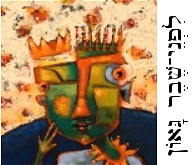
"How can you expect to dwell with God forever, if you so neglect him here?" - Jonathan Edwards
11.29.24 (Cheshvan 28, 5785) From our Torah this week (i.e., parashat Toldot) we read: "Then Jacob gave Esau bread and lentil stew (לֶחֶם וּנְזִיד), and he ate and drank and rose and went his way. Thus Esau despised (בָּזָה) his birthright (בְּכרָה)" (Gen. 25:34). Esau esteemed the honor of being the firstborn son (i.e, bechor: בְּכוֹר) the high priest of the family as worth a "bowl of beans" when compared with the drive of his lower nature, and so he tragically forfeited the blessing of God...
Far from regarding service to God as a divine privilege and wonderful opportunity to benefit his family, Esau wanted to be free of such responsibilities and therefore discredited the meaning and promise of faith. Note that the Hebrew word for "lentil stew" (or pottage) is nazid (נָזִיד), which comes from a Hebrew word that means "to boil up" in pride (i.e., zid: זִיד). Sadly, Esau was consumed with his own interests and regarded them as more important than the things of God.
Note further that most English translations of the Hebrew text (i.e., Gen. 25:34) seem to suggest that because he bartered his birthright, Esau had therefore disparaged it, but the text implies continuity: in other words, after he ate, drank, and went his way, then Esau rationalized (or justified to himself) his bad decision by discounting its importance.
Hebrew Lesson
Jonah 2:8 reading (click):
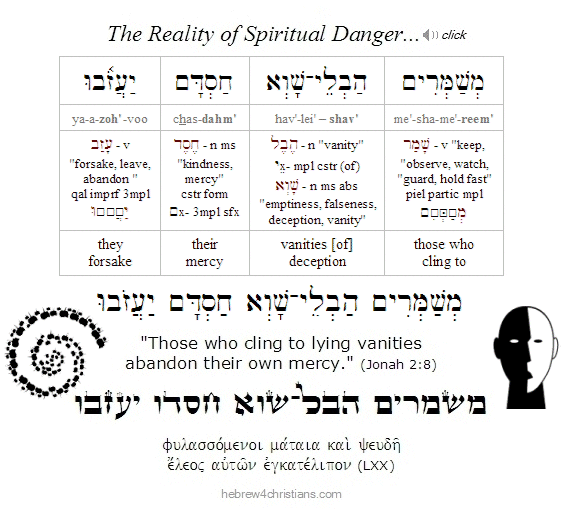 |
Hakarat Tovah - הַכָּרַת-טוֹבָה
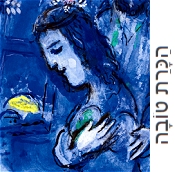
11.28.24 (Cheshvan 27, 5785) The Hebrew word hakarah (הַכָּרָה) means to recognize or to be conscious. Hakarat tovah means recognizing or being conscious of the good, i.e., gratitude. Hakarat tovah is one of the middot ha-lev (qualities of heart) that should mark the lives of those who are grace-based and focused. Gratitude is the product of joy (χαρα) obtained from the gift of being conscious of God's grace (χαρις).
When the firstfruits (i.e., ha'bikkurim: הביכורים) were offered at the Temple, a declaration of "hakarat tovah" was made that expressed thanks for the good the LORD has done for the Jewish people since the days of Ya'akov (Jacob) to the present hour (Deut. 26:3-11). The declaration was intended to raise consciousness by giving voice to the heart and sanctifying the act of giving. It's not enough to "go through the motions" of a ritual: We must become conscious of the good we have received by engaging the heart's response.
Some of the sages have said that hakarat tovah is the foundation of our service to the LORD, called avodat Adonai (עובדת יהוה). Gratitude is the basic response to being conscious of reality -- the reality of God's unending care and sustenance..... Being ungrateful, or kefuy tovah (כְּפוּי טוֹבָה) is a sign that you are not seeing reality correctly. It is an insincere way of seeing, a spiritual impairment, a sickness of heart, that leads you into darkness...
With all that said, please know that I sincerely appreciate that many of you have shown us kindness and mercy over the years of doing ministry. I am deeply touched by your love. We cannot be here without one another, and you are sustaining us. Thank you. - John
Hebrew Lesson
Psalm 100:4 reading (click):
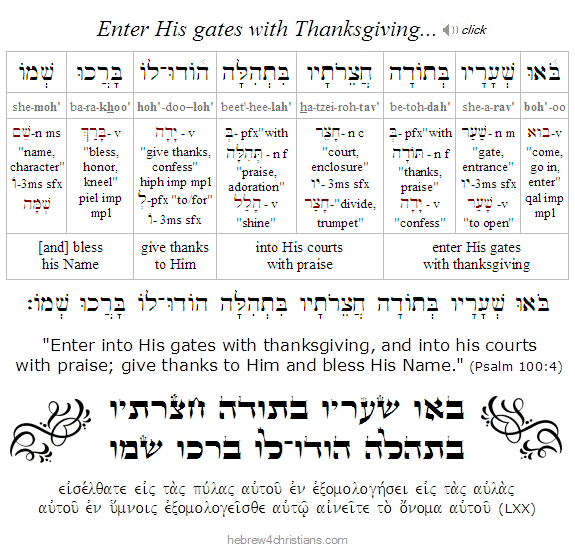 |
Rebekah's Struggle...
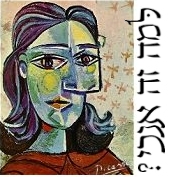
11.28.24 (Cheshvan 27, 5785) When the twins fought within her womb, Rebekah asked, lamah zeh anochi ("Why do I exist?"), and then the LORD gave her the prophecy: ve'rav ya'avod tza'ir "the older (or "stronger) shall serve the younger" (see Gen. 25:23). God had chosen one of her two children to become the heir of the covenantal promise, and she therefore may have thought it was her purpose or mission in life to help make that happen...
Rebekah's elaborate scheme to trick her husband by exchanging the twins for the blessing was doomed from the outset, since God needed to open the blind eyes of Isaac to truly bless Jacob as the family heir (Gen. 28:1-4). Rebekah's mistake was that she thought it was her job to intervene, or to "help God" by resorting to human intervention somewhat like her mother-in-law Sarah earlier had sought to "help God" by giving Hagar as a surrogate wife to Abraham to produce the heir. It is a difficult thing to let go and to trust that the Lord will take care of everything. Lamah zeh anochi Why do I exist, except to bear witness to God's providential plan and to trust in God's power to work all things together for good?
Such a plaintive question, lamah zeh anochi (לָמָּה זֶּה אָנֹכִי) "Why do I exist?" When she was young, Rebekah seemed strong, secure, and courageous. For example, after meeting Eliezer she unhesitatingly declared her willingness to leave all that she knew to go to a strange land and to marry an unknown man -- all for the promise of an unseen good.
Nevertheless Rebekah was tested. First, she (like Sarah) was barren and for 20 years ached for a child with Isaac. Second, her pregnancy was difficult and the Lord foretold her that though she would have twins, there would be an ongoing conflict between them that would trouble their lives. Third, after bearing the children, Rebekah's turmoil continued: her husband discounted her faith; her sons pathetically competed for the approval of their father; and she was torn to choose to stand with Jacob even if that jeopardized her relationship with both Esau and Isaac. And later, after the scheme to exchange Jacob for Esau was exposed, her worst fear was realized: she indeed lost both of her sons (Esau because of her betrayal, and Jacob after he fled to Mesopotamia).
Struggle after struggle: lamah zeh anochi? Why is this happening to me? Why did I deserve such a fate? Why, but to partake of the truth to suffer for the sake of the deliverance of God's ultimate blessing for the world. Like Rebekah, we have an important part to play, though assuredly we will be tested and experience challenges along the way. Lameh zeh anochi? To learn to trust God for all that happens in life... Amen.
Hebrew Lesson
Proverbs 3:5 reading (click):
Note that the children "struggled" within her - the Hebrew verb means they collided and ran into one another. Rebekah's was in the midst of an inner battle, and her question was spiritually focused. She first affirmed that life is a blessing (אִם־כֵּן) and then asked why she was in such a state (לָמָּה זֶּה אָנֹכִי). She first sought God for answers, and then God told her that something wonderful was to come, though it would not come without a struggle...
The Will to Believe...
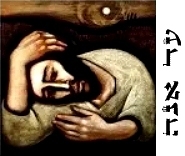
"When you have to make a choice and don't make it, that is in itself a choice." - William James
11.27.24 (Cheshvan 26, 5784) The central issue of your spiritual life is the willingness to do God's will, or the willingness to believe, since these amount to the same thing.... Believe what? That God is real, that He has (personally) called you by name, that he has particularly redeemed you by Yeshua's own blood poured out for your sins, and that therefore that your identity and life are bound up with his mercy and truth... Perhaps this message seems too good to be true, and yet it is the heart's duty to take hold of hope and to refuse to yield to despair, as it is written: "Let not love and truth forsake you; bind them around your neck; write them on the tablet of your heart" (Prov. 3:3).
The spiritual danger here is being "pulled apart" in opposite directions, dissipating the soul so that it will not be unified, focused and directed. Both loving and hating the good is a state of painful inner conflict, ambivalence, and self-contradiction. "Who can bring a clean thing out of an unclean? there is not one" (Job 14:4), yet this is our starting point: "I find it to be a law that when I want to do right, evil lies close at hand" (Rom. 7:21). We are often willing and unwilling, or neither willing nor unwilling, and this makes us inwardly divided, weak, fragmented, anxious, and "soulless." An honest faith that "wills one thing" binds the soul into a unity, or an authentic "self." As King David said, "One thing have I asked of the LORD, that will I seek after: that I may dwell in the house of the LORD all the days of my life, to gaze upon the beauty of the LORD and to inquire in his temple" (Psalm 27:4).
The way to be healed of a divided heart is to earnestly make a decision: "Draw near to God, and he will draw near to you" (James 4:8). There are no conditions given here -- other than your raw need to connect with God for help. "Purify your hearts, you double-minded ones" (δίψυχοι, lit. "two-souled ones"); make up your mind and be unified within your heart: "How long will you go limping between two different opinions?" (1 Kings 18:21). You are invited to come; God has made the way; your place at the table has been set and prepared...
Our Heavenly Father "sees in secret.." As William James once said: "The deepest thing in our nature is this region of heart in which we dwell alone with our willingnesses and our unwillingnesses, our faiths and our fears" (James: Is Life Worth Living, 1896). Or as Albert Camus later wrote, "There is but one truly serious philosophical problem, and that is suicide. Judging whether life is or is not worth living amounts to answering the fundamental question of philosophy" (Myth of Sisyphus, 1942).
It is there, in the secret place of the heart, that the sound of the "knock" is either heard or disregarded (Rev 3:20); the stakes are nothing less than everything. May the Lord give us the willingness to do His will and the courage to believe in His love. And may God deliver us from doubt and from every other fear. May we all be strong in faith, not staggering over the promises, but giving glory to God for the miracle of Yeshua our LORD. May we all be rooted and grounded in love so that we are empowered to apprehend the very "breadth and length and height and depth" of the love of God given to us in Messiah, so that we shall all be filled with all the fullness of God (Eph. 3:14-19). Amen.
Hebrew Lesson
Proverbs 3:3 reading (click):
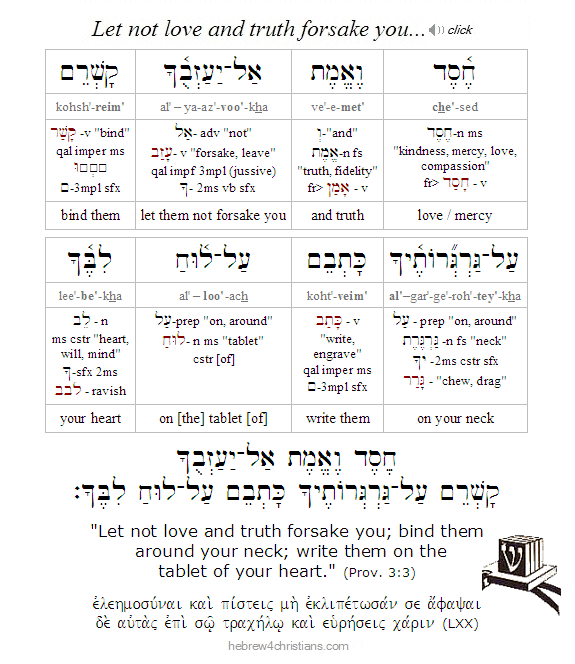 |
Finding Real Treasure...
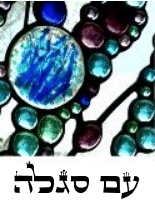
11.26.24 (Cheshvan 25, 5785) "The kingdom of heaven is like treasure hidden in a field, which a man found and covered up. Then in his joy he goes and sells all that he has and buys that field. Again, the kingdom of heaven is like a merchant in search of fine pearls, who, on finding one pearl of great value, went and sold all that he had and bought it" (Matt. 13:44-46). Here Yeshua teaches us that a relationship with God is the true source of joy and value in life, and that all other passions and desires are like "fools gold" when compared with its overwhelming worth... In this connection Soren Kierkegaard wrote: "If anyone thinks he is a Christian and yet is indifferent toward being that, then he really is not one at all. Indeed, what would we think of a person who gave assurances that he was in love and also that it was a matter of indifference to him?" (Works of Love).
The Shema, the "first and greatest commandment," is to love God "bekhol levavkha" (בְּכָל־לְבָבְךָ) with all our hearts, and yet how is that love possible apart from the revelation of the passion of love itself? "We love because God first loves us" (1 John 4:19), and therefore teshuvah ("repentance") is a matter of being in love, celebrating God's heart for us, awakening to its wonder, and being thrilled and overjoyed at its reality. Is this not the essence of the matter? "Shimon ben Yonah, atah ohev oti?" "Simon son of Jonah, do you love me?" (John 21:17). But how can we love the Lord apart from trusting his heart for us? "Come unto Me," Yeshua says, "live in Me and I will live in you." O Lord God our Savior, deliver us from apathy and indifference! Soften our hearts and awaken us to our great desire and need for you! Hashivenu, Adonai: turn us, O LORD, and we shall be turned; heal us, and we shall be healed Let know the breadth and length and height and depth of your great love!.
So for what do you hope, friend? What are your dreams? Your deepest desires? Where is your treasure? Yeshua cautioned those who sought their happiness in this world: "Do not store up for yourselves treasures upon earth... be rich toward God" (Matt. 6:19-20; Luke 12:21). When we treasure God, our focus is directed toward the eternal reality, and our interest in this world fades. We trust God to meet our daily needs and surrender our future to His care. The only worry we face concerns our own deficiencies in our obligations to the Savior. Our duty is to love God in the truth - bekhol levavkha - with all our heart, having no thought of ourselves. Indeed, self-denial means to quit thinking about yourself (from α-, "not," + ῥέω, "to speak") by accepting what God has done for you. "It is not my business to think about myself. My business is to think about God. It is for God to think about me" (Simone Weil). Amen, where your treasure is, there will be your heart also.
Hebrew Lesson
Jer. 24:7a reading (click):
Redeeming the Time...

I sprained my right wrist the other day and it's painful to type. Thank you for your prayers.
11.26.24 (Cheshvan 25, 5785) In Torah portion Chayei Sarah we read about the death of Abraham, the original patriarch of the Jewish people and great hero of faith:"These are the days of the years of the life of Abraham (יְמֵי שְׁנֵי־חַיֵּי אַבְרָהָם), which he lived..." (Gen. 25:7). It is interesting to notice that this verse mentions Abraham's days (yamim: ימים) but then goes on to state the number of years (shanim: שנים) that he lived. Why, then, does the verse mention the word "days" at all? Moreover, the verse includes the seemingly redundant clause, "which he lived" (אֲשֶׁר־חָי), an addition that appears to be unnecessary to the meaning. Since the sages assumed that there were no unnecessary words revealed in the Torah, however, they discussed why the verse was written this way....
When we reckon a person's life span, we (objectively) refer to their physical longevity in terms of years. This is why we celebrate birthdays, after all, and that's why we refer to someone as being so many years old. Jewish tradition recognizes calendar years, of course (our verse states that Abraham lived 175 years), though the sages understood time primarily in terms of "length of days." When the patriarch Isaac died, for example, the Torah says he was "gathered to his people - זָקֵן וּשְׂבַע יָמִים - "old and full of days" (Gen. 35:29). The sages defined a day (yom: יְוֹם) in terms of the total time of daylight (measured from sunrise to sunset), and defined an hour (sha'ah: שָׁעָה) by dividing that time into 12 equal parts, called a "proportional hour" (sha'ah zemanit: שעה זמנית). Each proportionate hour was then divided into 1080 "parts" (chalakim: חלקים), and each part (chelek: חֵלֶק) was further divided into 76 "moments" (rega'im: רגעים). In other words, the sages measured time by increasingly smaller units (yechidut: יְחִידוּת), and these days, hours, "parts," and moments were used to objectively measure time (interestingly, modern science likewise "divide times" down to the smallest of units, measuring the length of time required for light to travel in a vacuum, i.e., "Planck time." In other words, space and time are known through observing light).
Life is surely more than a quantitative measurement of time, however. What good is a physically long life without a relationship with God? Is it not "vanity of vanities," a "tale told by an idiot, full of sound and fury, signifying nothing," as Shakespeare once said? Time finds its qualitative meaning, its purpose, and its direction only in relationship with God, who is the "beginning, the middle, and the end." Our personal histories likewise have a beginning, middle, and an end that together form a "story" about who we are.... Your life is "going somewhere," and each moment of your day is your means to that end. Each moment leads inexorably to the next, and together these moments form hours, days, and the "days of the years." Teshuvah (repentance) is a conscious choice to turn to God amidst the flux of passing time in order to awaken to the realm of the eternal. Therefore we see the greatest of the tzaddikim (such as Abraham) living out the "days of the years" in conscious awareness of eternity, and of his ultimate destination: "By faith Abraham obeyed when he was called to go out to a place that he was to receive as an inheritance. And he went out, not knowing where he was going. By faith he went to live in the land of promise, as in a foreign land, living in tents with Isaac and Jacob, heirs with him of the same promise. For he was looking forward to the city that has foundations, whose designer and builder is God" (Heb. 11:8-10). Faith affirms that underlying the "surface appearance" of fleeting time (z'man cholef: זמן חולף) is a deeper reality that is ultimately real and abiding (z'man nitzchi: זְמַן נִצְחִי). It "sees what is invisible" (2 Cor. 4:18) and understands that the "present form of this world is passing away," like so many seconds ticked off a clock (1 Cor. 7:31). Time in this world (olam hazeh: עולם הזה) is linear, with a beginning and end in the world to come (olam ha'ba: עולם הבא).
Time is God's gift to us, as well as a test... The story is told about how a man once spied the Vilna Gaon sitting at a table in the evening, weeping over a small piece of paper he had pulled from his pocket. After he wiped away the tears, the Gaon got up and left the room, leaving the paper on the table. The man who oversaw this then went over to look at the piece of paper and saw just seven dots marked on it, nothing else. Overcome by curiosity, the following morning the man asked the Gaon what the paper meant and why it made him cry. The Gaon then explained that each evening he would review how he used his time that day. For every moment he wasted, he would mark a dot on a piece of paper. At the end of the day he would look at the paper and ask God's forgiveness for wasting the time.
The point of the story is that time is a precious gift, and how we choose to live each moment makes an eternal difference in our lives. As Moses prayed to God: "Teach us to number our days aright, so that we attain a heart of wisdom" (Psalm 90:12). We obtain such wisdom (chochmah: חָכמָה) through the study of Torah (talmud torah: תלמוד תורה): "And you shall meditate upon (the Torah) day and night" (Josh. 1:8). As disciples (talmidim: תַּלְמִידִים), we must study the Scriptures to show ourselves approved before God (2 Tim. 2:15). But study alone is not enough. We must practice the truth and walk it out in our daily lives: "Only take care, and keep your soul diligently (שְׁמֹר נַפְשְׁךָ מְאֹד)... Turn not away from your heart all the days of your life" (כֹּל יְמֵי חַיֶּיךָ, Deut. 4:9). Amen. "Above all else guard your heart, for from it are the outflows of life" (תּוֹצְאוֹת חַיִּים, Prov. 4:23).
Hebrew Lesson:
Psalm 90:12 Hebrew reading:
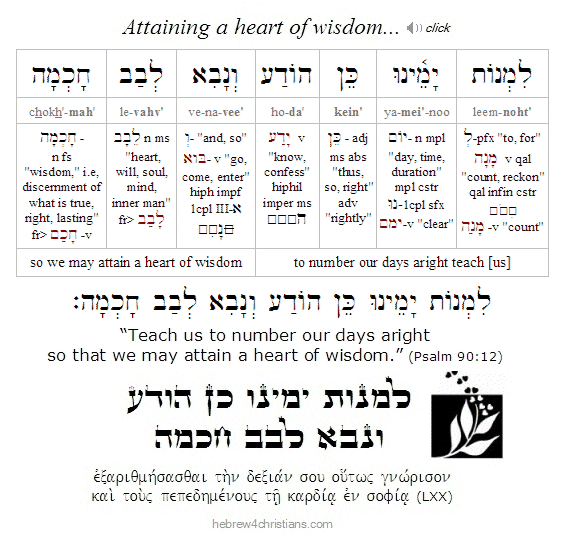 |
As followers of Yeshua, we are instructed to "redeem" (ἐξαγοράζω) the time, because the days are evil (Eph. 5:16; Col. 4:5). The Greek word used here implies exchanging the fleeting moments of the day (z'man cholef: זמן חולף) with the eternal consciousness (z'man nitzchi: זְמַן נִצְחִי) that we will one day stand before the Judgment Seat of Messiah and give account for the "length of our days" (Matt. 12:36-37).
May the LORD help us wake up and refuse to exchange the eternal treasure (otzar nitzchi: אוֹצָר נִצְחִי) of the Kingdom of God for the fleeting vanities of this world (havalim cholefim: הֲבָלִים חוֹלְפִים). As the late Jim Eliot succinctly reminded us, "He is no fool who gives what he cannot keep to gain what he cannot lose." אמן, עזור לנו אלוהים - "Amen, help us O God."
A heart of Surrender...
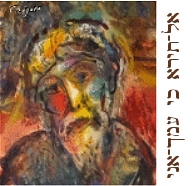
11.25.24 (Cheshvan 24, 5785) To be thankful for the good things in life is easy, but to be grateful for times of sorrow, hardship, and pain requires wisdom and the earnestness of faith. Such gratitude wells up from the conviction that everything that has brought you to the present moment -- including your wounds, heartaches, and troubles -- is for your good. "To every thing there is a season, and a time to every purpose under the heaven: A time to be born, and a time to die; a time to plant, and a time to harvest that which is planted... A time to weep, and a time to laugh; a time to mourn, and a time to dance" (Eccl. 3:1-4).
In the midst of these inexorable changes arises an inner ache of the soul that searches for meaning, truth, and hope. As it is written:"God has made everything beautiful in its time (אֶת־הַכֹּל עָשָׂה יָפֶה בְעִתּוֹ); He has also put eternity within their hearts, so that no one can find out the work that God does from the beginning to the end" (Eccl. 3:11). While no one can find out the "deep reasons" for why things happen the way they do, the heart of faith trusts that God's plan is truly good, even though his providence includes times of deep shadows as well as times of comforting light. God makes everything beautiful in its time....
Therefore we are admonished to "count it all joy" when we encounter trials of various kinds, for the testing of our faith produces perseverance. "Blessed is the one who endures temptation, for after he has proven to be genuine, he will receive the crown of life that the Lord promised to those who love him" (James 1:12).
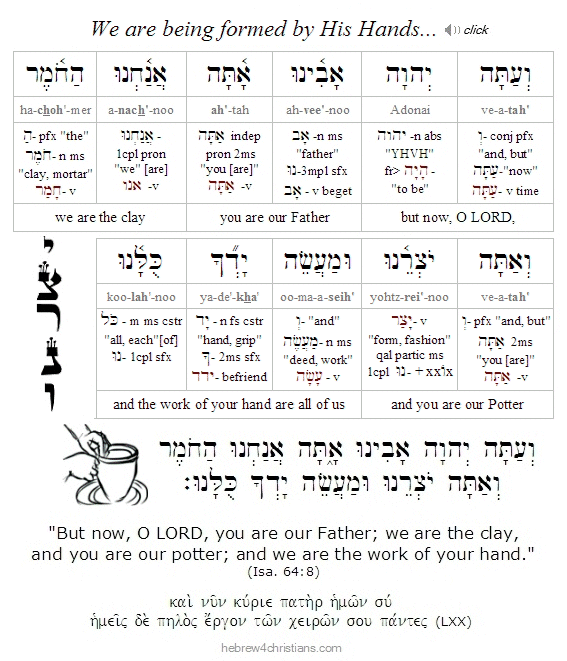 |
Thanksgiving and Sukkot...
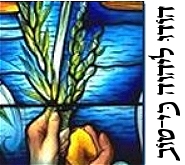
The Thanksgiving Day holiday occurs Thursday, November 28th this year... I am grateful to the Lord that you are a part of this ministry...
11.24.24 (Cheshvan 23, 5785) The American holiday of Thanksgiving (חַג הַהוֹדָיָה) likely has its roots in the Jewish tradition of giving thanks to God, and some historians believe that the early "Puritans" (or "Separatists") actually derived the idea for the holiday from the Biblical festival of Sukkot (i.e., "the feast of Tabernacles").
Before fleeing to the "New World," the Puritans lived for a decade among the Sephardic Jews in Holland, since Holland was considered a safe haven from religious persecution at the time. Since they were devout Calvinists and piestists, their religious idealism led them to regard themselves as "new Israel," and it is likely that they learned that Sukkot commemorated the people of Israel's deliverance from their religious persecution in ancient Egypt at that time. After they emigrated to the "Promised Land" of America, it is not surprising that these exiles may have chosen the festival of Sukkot as the paradigm for their own celebration. As the Torah commands: "Celebrate the feast so that your generations may know that I made the people of Israel dwell in booths when I brought them out of the land of Egypt: I am the LORD your God" (Lev. 23:39-43). The devout Puritans regarded their perilous journey to the new world as a type of "Exodus event" and therefore sought a Biblical holiday to commemorate their safe arrival in a land full of new promise...
It is interesting to note that the Hebrew word for "turkey" is tarnegol hodu (תַּרְנְגוֹל הוֹדו), literally, "Indian chicken," which is often shortened to hodu (הוֹדוּ). It is a happy coincidence that we customarily eat turkey on Thanksgiving, and this reminds us of the "thanks" connection: "Give thanks (hodu) to the Lord for he is good," for His love endures forever."
הודו ליהוה כי־טוב
כי לעולם חסדו
"Give thanks to the LORD for He is good;
for His love endures forever."
(Psalm 136:1)

Hebrew Lesson
Psalm 136:1 Hebrew Reading:
Note: For more on this subject, see "Thanksgiving and Sukkot."
Parashat Toldot - תולדת
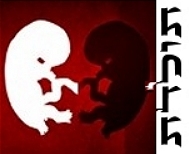 |
11.24.24 (Cheshvan 23, 5785) Shalom friends, and welcome to another week of studying some Torah with Hebrew for Christians. Since this is Thanksgiving Week, I want to express my heartfelt gratitude to all my visitors here. May the Lord bless you and give you his peace!
Recall that last week's Torah (i.e., Chayei Sarah) told how Abraham's servant Eliezer (אֱלִיעֶזֶר) sought a bride for Isaac from among Abraham's relatives living in Mesopotamia. In response to his prayer to the LORD, Eliezer was shown that Abraham's nephew's daughter Rebekah (i.e., Rivkah bat-Betu'el: רִבְקָה בַּת־בְּתוּאֵל) was chosen to be one of the four matriarchs of Israel (i.e., arba imahot l'Yisrael: אַרְבַּע אִמָּהוֹת לְיִשְׂרָאֵל).
This week's reading (i.e., parashat Toldot) continues the story by revealing that Isaac and Rebekah had been married for twenty years but were still without an heir to carry on the family line. Finally their prayers were answered and Rebekah conceived, though not without complications. When she inquired of the LORD about her travail, God told her that she was carrying twins that would be heads of two rival nations, but the younger child would in fact become the promised heir of the chosen people.
When the day arrived for Rebekah to give birth, the first child came out "red and covered with hair," so they called his name "Esau" (i.e., esav: עֵשָׂו, "hairy"); and then his twin brother came out with his hand grasping Esau's heel (i.e., akev: עָקֵב), so they named him "Jacob" (i.e., ya'akov: יַעֲקב), from the Hebrew verb (i.e., akav: עָקַב), meaning "to take by the heel; to displace; to supplant."
The Torah then says that Esau grew up to become a "crafty hunter" (i.e., ish yodea tzayid: אִישׁ יֹדֵעַ צַיִד), "a man of the field" (אִישׁ שָׂדֶה) while Jacob became "a wholesome man" (i.e., ish tam: אִישׁ תָּם) who "dwelt in tents" (יֹשֵׁב אֹהָלִים). Isaac favored Esau (וַיֶּאֱהַב יִצְחָק אֶת־עֵשָׂו); because he had a taste for game (כִּי־צַיִד בְּפִיו), but Rebekah favored Jacob (וְרִבְקָה אֹהֶבֶת אֶת־יַעֲקֹב) because she believed the prophecy given before the children were born that the younger would rule over the elder...
The portion then gives us a look at the spiritual life of the two boys. According to tradition, on the day of the funeral of their grandfather Abraham, Jacob was cooking lentil soup for Isaac, the traditional mourner's meal. Esau rushed in from a hunting expedition, exhausted and hungry. He then begged Jacob to give him some of "that red stuff" (i.e, ha'dom hazeh), but Jacob answered that he would give him some only if he would sell him his birthright (i.e., bechorah: בְּכוֹרָה, from bechor: בכור, "firstborn"). Esau hastily agreed to the terms and thereby regarded his birthright as being worth only a "bowl of beans" (on account of this incident, Esau was given the nickname of "Red" (i.e., אֱדוֹם "Edom"). In this manner the Torah describes how Esau "despised the birthright" (Gen. 25:34).
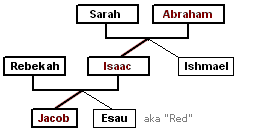 |
Years later, when Isaac was old and blind, Jacob (with Rebekah's help) tricked Isaac into conferring the blessing of the firstborn (בִּרְכַּת בְּכוֹר) upon him, thereby making Jacob the heir of the family, and not Esau. When the ruse was discovered, however, Esau sought to kill his brother, and Jacob was forced to flee his home, never to see his mother again...
Hebrew Lesson
Gen. 25:19 Hebrew Reading (click):
Walking by Faith...
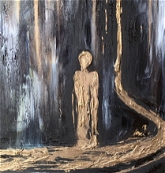
Shabbat shalom and keep pressing on, friends! Hang on! Don't give up! The Day approaches!
11.23.24 (Cheshvan 22, 5785) Sometimes the walk of faith is one of darkness. We wonder where we are. We wonder where God is. We pray. We struggle. We feel empty inside. We need to be careful here. Faith believes that God is the Center of our lives, regardless of how we may feel at the moment. God works in ways that we often cannot understand at the time. Like a sculpture that is unfinished, or a tapestry still being woven, we do not see the whole picture of our lives. It is vital, then, to trust that the Lord is leading the way, already present for us in the days ahead. He is on the other side of the next moment, calling us to look forward and to believe in the promise of his blessing and eternal life. As it is written: "Who among you fears the LORD? Who obeys the voice of His Servant? Who walks in darkness and has no light? Let him trust in the name of the LORD and rely upon his God" (Isa. 50:10). Amen. Hope overcomes all our affliction: "My flesh and my heart may fail, but God is the strength of my heart and my portion forever" (Psalm 73:26).
Hebrew Lesson
Psalm 73:26 reading (click):
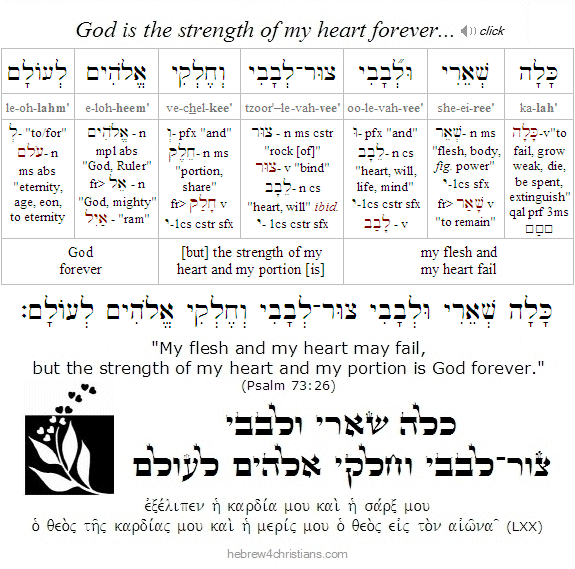 |
When Yeshua said, "Let not your heart be troubled... I go to prepare a place for you," he was assuring his friends that he had matters well under his control, and therefore they did not need to worry, since his passion rendered their salvation completely secure... The future is a "prepared place" for you, even if life in this world is often marked by testing and various refining fires. God has not promised to rescue us according to our own schedule, however, so if it appears that your prayers are not immediately answered, keep waiting in faith: "Rejoice, even if you have been grieved by various trials, because the tested genuineness of your faith -- more precious than gold that perishes though it is tested by fire -- may result in praise and glory and honor at the revelation of Yeshua the Messiah" (1 Pet. 1:6-7).
God works "all things together for good," and since the exercise of faith is for your good, he engineers all things to build your faith. "For my thoughts are not your thoughts, neither are your ways my ways, says the LORD" (Isa. 55:8).
Those who call upon the LORD trust not only in concealed good behind ambiguous appearances ("all things work together for good") but also in a future, real, substantive good that will one day be clearly manifest for us all... We fight the "good fight" of faith, which is a worthy struggle that eventually is realized for blessing. Meanwhile, may the LORD our God keep us from such depth of sorrow that leads to sickness, darkness and despair. Faith sees the invisible light, the truth of love that overcomes all powers of darkness, hate, and fear.
 |
Seeking what is Above...
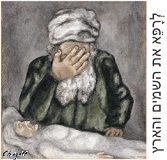
"A double minded man is unstable in all his ways." - James 1:8
11.22.24 (Cheshvan 21, 5785) Metaphysical assumptions are basic beliefs (or intuitions) about what things "really" are and how (or why) they exist, and they are implied whenever we communicate or say anything at all. All our language relies on assumptions about time, space, cause and effect, how we perceive things, and so on. This is an inescapable fact, and to even say that metaphysical language makes no "sense" is to say something metaphysical...
For instance, a "materialist" believes that it is "true" that "reality" is solely composed of "matter," and therefore human "consciousness" is the result of "organic" brain activity. The universe is a likened to a gigantic machine that operates according to ineluctable "natural laws." Notice that each of the things that a materialist believes assumes other things, and therefore invite further questions about their meaning and truth status. Materialism is a "religious" perspective, offering a "totalizing" narrative about what is ultimately real and why it exists.
A "theist" is a person who believes in God, though the word "God" must be defined carefully since there are various forms of "theism." Without getting into all the nuances, the Torah and Scriptures speak of a personal God, the LORD (יהוה), the Creator of all that exists, who is all-powerful, all-knowing, all-loving, and who became "embodied" as a human being to heal humanity from the sickness of death thereby imparting spiritual life in the Messiah. Metaphysically the universe is the result of divine design, human beings are endowed by God with both a body and a soul, and human consciousness is intuitively aware of logical order, moral truth (i.e., a "conscience"), aesthetic values, a need for connection with God, and so on.
God created us to ask the "big questions" of life (for example, "Who are we?" "Where did we come from?" "Why are we here?" "Where are we going?" and "What does it all mean?") so that we would seek and to find the meaning for our existence (Jer. 29:13). Honestly pursued, such philosophical questions will disclose an inherent dualism in our reflective consciousness wherein we seek an eternal happiness and ultimate good that transcends anything that may be found in this temporal world (Eccl. 3:11). Faith in the revelation of the Divine Presence therefore confesses that reality itself is "two-tiered," corresponding to two different realms of existence, namely, an "upper realm" of the immaterial and spiritual (i.e., heaven) and a "lower realm" of the material and physical (i.e., the natural universe).
Upon reflection we may sometimes feel lonely and bewildered in this duality, not knowing how to "mediate" or bring together the opposite poles of our experience... On the one hand life in this present world is surely fading away, and finitude, dissolution, and the "dust of death" seem omnipresent to our physical senses, nevertheless our hearts yearn for eternity, for unending life, and for the ideal of everlasting significance. We long for meaning, wonder, greatness, and the peace of unconditional love, yet we find ourselves trapped within a diseased and moribund world that is filled with thwarted dreams, painful losses, harrowing vexations, and death... We hunger and thirst for real life, for salvation from our misery, but the cosmological visions of mechanistic science reveal an immense emptiness that has no goal or end, no explanation for its existence, and therefore no meaning or real hope.
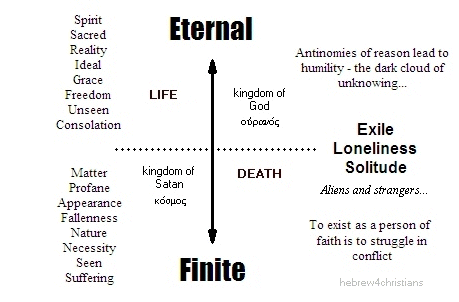 |
Ancient Greek philosophy regarded the soul (i.e., human consciousness) as "imprisoned" within the body, and therefore it advised meditating on intellectual ideals, "forms," and "essences," to transcend the chaos of fate and our natural passions. For them philosophy was really a kind of "recollection" whereby we return to the original Good that has been lost and is presently concealed by the illusion of mere appearances.
Now these ancient Greek philosophers understood the dualistic nature of reality (as far it goes), though of course the Torah had implied these matters long before the advent of Socrates, Plato, and Aristotle... After all, the Torah teaches the experience of dualism and ambiguity is by divine design. Upon earnest reflection the human heart begins to cry out for something more (Eccl. 3:11). Though we understand that we are creatures formed of the dust of the earth, we sense something of the divine within us; we inwardly hear an "echo from Eden" that reminds us of paradise lost... We shrink before our own powerlessness and insignificance yet we dare to believe in the eternal glories of love, beauty, justice, and everlasting life. We simultaneously see ourselves as both physical beings, restricted by time, history, and culture, as well as spiritual beings, transcending the fate of the natural by visions and dreams of the ideal, thereby sensing the glorious and the sacred. Neither of these "polarities" of the soul can be blended or synthesized, however, which leaves us in a state of tension wherein we cling to the vision of the Eternal in the midst of the fleeting shadows of this present realm (Rom. 8:4, Gal. 5:16-17).
Biblical faith refuses to "reduce" the significance, value, worth, and aspirations of the human heart into purely natural categories and terms, and therefore spiritual life constitutes a "protest" against any interpretation of reality that excludes, suppresses, denies, or minimizes the Divine Presence. Life in olam hazeh (this world) is corridor leading to the world to come. Our faith affirms that underlying "natural" phenomena is a deeper and higher reality that is ultimately real and abiding. There is an end or "telos" (goal) that sets the direction or Torah of our dualistic existence. Faith "sees what is invisible" (2 Cor. 4:18) and understands (i.e., accepts) that the "present form (τὸ σχῆμα) of this world is passing away" (1 Cor. 7:31). The heart of faith looks beyond this realm to behold a city whose designer and builder is God Himself (Heb. 11:10). "So we do not lose heart... For the things that are seen are turning to dust, but the things that are unseen endure forever" (2 Cor. 4:16-18). Yes, there is a dualism but God calls us to choose the upper world and to keep our focus there. As it is written, "A double minded man is unstable in all his ways" (James 1:8).
Abraham felt the "metaphysical divide" and homesickness embedded in the everyday language of this world. After his wife Sarah died, he sought a place to inter her body. When he met with some local inhabitants of Canaan, he referred to himself as a "stranger and a visitor" among them. This is because he chose to behold the stars of the vision, which is to say that he chose to identify with spiritual reality over the temporal. "Though I was called by God to come to this land, there is no place for me to lay my head. Yet I need a place to bury my dead. I am here but not really home. I look for a heavenly city whose builder and maker is God." Notice that Abraham was in the midst of the divide, "mediating" the temporal with the eternal and life in this world with the heavenly realm. Though he mourned for his wife, the text of the Torah notes a "diminished" spelling of the word for his mourning because he believed that the LORD would receive his beloved Sarah into his presence and that one day he would be rejoined with her in heaven. As Abraham learned in the sacrifice of his son Isaac, God's love is stronger than death and overcomes it by the power of His resurrection. Amen.
Hebrew Lesson:
Jeremiah 29:13 Hebrew reading (click):
The dualism of life shows up within our hearts as well, as we wrestle with our own faith and with "double-mindedness," that is, the ambivalence that results from not having our minds made up. On the one hand, we need to confess the truth of our radical sinfulness, our depravity, our brokenness, and so on, while on the other we must learn to know ourselves as the "beloved" and to find faith that God's blessing indeed belongs to us -- that Yeshua gave his life for us -- despite ourselves. We have to be willing to take God's new name for us and believe that God has transformed our deepest nature for eternal good. We have to be renamed from "Jacob" to "Israel," and yet we know ourselves as both... In other words, we must learn to "put on" the new nature and to "put off" the carnal reasoning of our former life. The answer for us is found in the word "miracle," as God in great mercy and compassion regenerates us, comforts us, and then guides our way back to the truth of his salvation. "The light of the body is the eye: if therefore your eye be single (i.e., focused), your whole body shall be full of light" (Matt. 6:22). The "pure in heart" are healed from double-mindedness by keeping focused on the Kingdom of God (Matt. 5:8; Col. 3:1-4).
 |
The Death of Sarah...
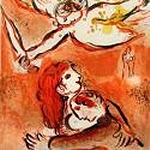
The following entry is related to this week's Torah reading, parashat Chayei Sarah...
11.22.24 (Cheshvan 21, 5785) Recall that Sarah gave birth to Isaac when she was 91 years old (Gen. 17:17, 21), and she later died when Isaac was 36 years old, at the age 127 (Gen. 23:1). And while the Torah does not explicitly state the cause of her death, we are told about her death following the dramatic episode of the sacrifice of Isaac (Gen. 22), and the midrash Tanchuma therefore links the two together by saying Sarah died from shock after learning about the ordeal of her son at Moriah. It was just too much for her heart to bear: "And a sword will pierce through your own soul also..." (Luke 2:35). Therefore Jewish tradition associates the cries of Sarah with the blasts of the shofar during Rosh Hashanah. The broken notes of the shofar are thought to recall her crying for her son...
Isaac was the first "Jewish baby" born to the world, the promised son, the miracle child and the heir of Abraham. As the firstborn son of God's promise, without him the whole world would fall apart, and there would be no salvation to come... So when Sarah heard that Isaac was offered at Moriah, her soul departed from her and she thought the world was falling apart. She prayed to God: "Let me die for my son; let me die in place of my son..." Sarah's love was so great it brought Isaac back to life from the dead.
Understand that we study Torah and the lives of the patriarchs because it is part of our great yerushah (יְרוּשָׁה), our heritage, in Messiah Yeshua... The Torah tells our story as the people of God; it is the context and framework of the entire Bible. As it says: "Listen to me, you who pursue righteousness, you who seek the LORD (שִׁמְעוּ אֵלַי רֹדְפֵי צֶדֶק מְבַקְשֵׁי יְהוָה): look to the rock from which you were hewn, and to the quarry from which you were dug. Look unto Abraham your father and to Sarah who bore you; for he was but one when I called him, that I might bless him and multiply him" (Isa. 51:1-2). Amen.
Note: For more information on this topic, see the "Akedah of Sarah" article.
Hebrew Lesson:
Isaiah 51:2a Hebrew reading (click):
What are you dying for?
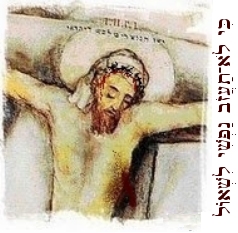
11.22.24 (Cheshvan 21, 5785) We might sometimes ask the question, "What am I living for?" though the question could be turned around to ask, "What am I dying for?" for indeed we are given precious and few days during our sojourn here, and every day we live is a day we are deciding that for which we will die. What we are willing to die for reveals what we believe is the reason for our lives....
If you stop and think about it, you realize that you "cannot not" exist; indeed you were "thrown" into this world apart from your conscious consent, and moreover that you cannot escape the inevitability of dissolution, suffering, death. Meanwhile, your life passes quickly as a fleeting vapor, as it says: "As for man, his days are like grass; as a flower of the field, so he flourishes: for the wind passes over it, and it is gone; and the place thereof remembers it no more" (Psalm 103:15-16).
Here today, gone tomorrow... but to what end? Where are you going during your short sojourn here on earth? Do you believe in the spiritual world? If you believe you are on your way to heaven, how are you living today that demonstrates your journey?
Will there be regret when you die? Will there be regret in heaven? Is it possible to lose a measure of blessedness in the world to come through disobedience, faithlessness, and sin? It is a dreadful thought, and many of us feel that much of our life has been regrettable, but how we come to "build" our lives make the difference for eternity: "For no one can lay a foundation other than that which is laid, which is Yeshua the Messiah. Now if any man builds upon this foundation with gold, silver, precious stones, or with wood, hay, stubble, each one's work will become clear; for the Day will declare it, because it will be revealed by fire; and the fire will test each one's work, of what sort it is. If anyone's work which he has built on it endures, he will receive a reward, but if anyone's work is burned, he will suffer loss; but he himself will be saved, yet so as through fire" (1 Cor. 3:15). "For we must all appear before the judgment seat of Messiah, that each one may receive the things done in the body, according to what he has done, whether good or bad" (2 Cor. 5:10).
Yeshua gave us parables admonishing us to make the most of our lives. The "Parable of the Soils" warns us to be receptive to God's presence and to bear fruit (Luke 8:4-8); the "Parable of the Talents" warns us not to squander our lives out of fear or complacency (Matt. 25:14-30). The tragic judgment of the indifferent steward was expressed by Yeshua this way: "From him who has not, even that which he has shall be taken away" (Matt. 25:29). The "Parable of the Rich Fool" warns us to be rich toward God (Luke 12:13-21), and so on.
But what about all the great promises of the Lord that he will remove our transgressions "as far as the east is from the west," and that he will cast our sins to the depths of the sea and remember them no more? The LORD says: "I, even I, am He who blots out your transgressions for My own sake, and I will not remember your sins" (Isa. 43:25). Indeed does not the New Covenant specifically promise us deliverance from our sins? Prophetically Jeremiah spoke on behalf of God: "For they all shall know Me, from the least of them to the greatest of them, says the LORD. For I will forgive their iniquity, and their sin I will remember no more" (Jer. 31:34). And does not the Cup of our Savior represent the blood of the New Testament which is shed for many for the remission of sins (Matt. 26:28)? Amen, yes indeed, the problem of our sins has been taken care of by Yeshua at the cross: "Most assuredly I say to you, the one who hears My word and believes in Him who sent Me has everlasting life, and shall not come into judgment, but has passed from death into life" (John 5:24). God has made us accepted in Yeshua: "In Him we have redemption through his blood, the forgiveness of sins, according to the riches of his grace" (Eph. 1:7).
So it seems there is a difference between being forgiven and being free of regret, for the latter is a feeling of mourning over lost opportunities, a sorrow that, in light of the truth of how wonderful and kind God is, more could have been done for him, that a life of deeper obedience, passion, and fellowship was possible for us but, for was left unlived... "But God, who is rich in mercy, for his great love with which he loves us, even when we were dead in sins, has made us alive together with Messiah - by grace you are saved - and has raised us up together, and made us sit together in heavenly places in Yeshua the Messiah, that in the ages to come He may demonstrate the exceeding riches of his grace in his kindness toward us through Yeshua our Lord" (Eph. 2:4-7). Amen, God's mercy and truth kiss....
When the unnamed woman from Magdala wept and washed his feet with her tears, Yeshua said to the those that were present, "I tell you, her sins, which are many, are forgiven -- for she loved much" (Luke 7:44-48). In other words, she was so lavish in her love because she deeply regretted that she had missed what was most important, what she desperately needed all along... She saw her sin as blindness to God's love... After all, why would she weep over her sins unless she loved him? And how could she love him unless he first revealed his love to her? (1 John 4:19).
Love and regret... It's a bit of a paradox, somewhat like God's commandment to Israel to blot out the name of Amalek so that they would never forget what Amalek did to them! And we will sing a new "Song of Lamb" in heaven that remembers how we were redeemed from our sins by Yeshua's shed blood upon the cross... "And they sung a new song, saying, 'You are worthy to take the book, and to open the seals thereof: for You were slain and have redeemed us to God by Your blood from every kindred, and tongue, and people, and nation" (Rev. 5:9). The scene of the "Lamb that was Slain" sitting upon the throne of God surrounded by innumerable souls who were clothed in white, waving palms, and crying out praise for God's salvation is dramatic and wonderful: "For the Lamb who is in the midst of the throne shall feed them, and shall lead them unto living fountains of waters: and God shall wipe away all tears from their eyes" (Rev. 7:17). And yet all of this glory came at the utmost expense of the dark cloud of the cross; the overwhelming passion; the excruciating agony, the blood poured out in intercession for the forgiveness of our sins...
All this indicates that though we will have remembrance of our sins, they will be remembered only in relation to the unfathomably great sacrifice of Yeshua as our Healer and the lover of our souls. We have peace with God. Ah, a bittersweet and beautiful brokenheartedness! We shall only know our sin in relation to the unending love and tender mercies of our Lord...
I should add that there is a place for godly sorrow, of course, and for genuine remorse over our sins. As we understand God's great desire and love for us, we begin to realize that the essence of sin is the refusal of His heart for us. The underlying issue with sin concerns the question of God's love. Simply abstaining from certain actions does not address the deepest need of the heart. It is not turning away from sin that matters as much as turning toward God. The forgiveness of sin is meant to lead us to the life of love.
So again let us ask ourselves: "What am I dying for?" In this world we have one life to live, a brief time wherein we can come to know God and learn to yield to his love. Every soul shares this same existential position: we are born; we suffer, we die, and then we will face judgment (Heb. 9:27). And though we will suffer and die, how we live today has profound implications for our eternal destiny. If we cling to our suffering and bitterness we will be locked into a prison of hell. Though we all will suffer and we will all die, the answer is not to unthinkingly rage at life for its apparent injustice, for that spreads hatred, bitterness, and despair. Nor are we to pretend that life and death are meaningless, or to seek escape from the vapor of our fears by drugs, sex, pop culture, etc., for these are not solutions to our eternal and spiritual tribulations. Every person needs to be healed from the real the sickness of soul, namely eternal death, and the remedy for this comes only and exclusively through Yeshua and his intercession for us, since there is salvation in no other name (Acts 4:12). His is the Name before whom every knee shall bow and every tongue confess (Phil. 2:9-11; Isa. 45:23). And He alone gives eternal life to those who trust in him (John 10:28). "For there is only one God and one Intercessor who can reconcile God and humanity -- the man Yeshua the Messiah -- who gave himself as a ransom for all" (2 Tim. 2:5-6). There is only one Savior, one Redeemer, and one Healer of the human heart, and that is Yeshua the LORD.
So how shall we then live? What can we do to heal a broken and dying world? Well first of all we must settle the matter and decide to live in the truth of Messiah: we "set the Lord always before us" (Psalm 16:8). Doing teshuvah is always the first step. Then, when opportunity arises, we can confide our heart's convictions with others; we can share our hope and healing with those who are hurting and lost. Our Lord commissioned us to be his representatives or ambassadors of life. We are given the inestimable privilege of sharing the way of salvation to others. There is no higher calling, friends. Physical doctors may heal the body, but only the Lord can heal the soul, and the Lord uses broken people who trust in him to speak words of life by means of the Holy Spirit. As we sojourn our days, the Lord asks us to humbly share our faith with those for whom he died upon the cross and to invite them to come to Him for life (Matt. 28:19-20). The apostle instructs us to "sanctify the Lord God in your hearts, and always be ready to give an answer to anyone who asks you the reason for the hope that is in you, with humility and respect" (1 Pet. 3:15). Helping another soul come to know God and to be reborn by the Spirit of God is the greatest joy we will share throughout eternity to the praise to our great God and Savior. Amen.
Hebrew Lesson
Psalm 63:3 reading (click for audio):
A Bride for the Promised Son...
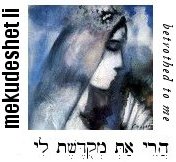
The following entry is related to this week's Torah reading, parashat Chayei Sarah...
11.22.24 (Cheshvan 21, 5785) Though he is not explicitly named in the account, the "elder servant" commissioned to find a bride for Isaac was undoubtedly Eliezer of Damascus (see Gen. 15:2). Eliezer (אֱלִיעֶזֶר), whose name means "my God [אלי] is help [עזר]," is regarded as a consummate example of a godly servant, a picture of the Holy Spirit (רוּחַ הַקּדֶשׁ) sent on a mission to find a bride for the Sacrificed Seed of Abraham (i.e., the Messiah Yeshua).
Eliezer dutifully departed on his mission and waited by the "well of water," interceding on behalf of righteousness... He prayed asking for a witness from heaven: "Let the young woman to whom I shall say, 'Please let down your jar that I may drink,' and who shall say, 'Drink, and I will water your camels' -- let her be the one whom you have appointed" (Gen. 24:13-14). Rebekah's response of kindness and generosity (i.e., chesed: חֶסֶד) to a tired wayfarer demonstrated God's choice. Note that the test concerned the inward character of the woman, not her status or beauty or other worldly factors. And since a single camel needs about 25 gallons of water and requires 10 minutes to drink, watering ten camels would require 250 gallons and at least a couple hours of work running back and forth to the well - no small task for anyone!
Eliezer's prayer to find a bride for Isaac (the very first recorded prayer of the Torah) did not appeal for a special sign or miracle but instead relied on the providential and "hidden hand" of God that governs the regular affairs of life (i.e., hashgachah pratit: הַשְׁגָּחָה פְּרָטִית). His prayer at the well relied on God to lead him to a chosen woman who, like his master Abraham, would extend compassion to a person in need. The Torah therefore reveals that far from being a mere coincidence or chance encounter, then, "before he had finished speaking, הִנֵּה רִבְקָה - hinei Rivkah! "behold Rebekah..." (Gen. 24:15). "Before they call I will answer; while they are still speaking I will hear" (Isa. 65:24).
Consider the character of the woman whom the LORD God chose to be the bride for Isaac, the heir of Abraham. Rebekah was willing to leave her family - all that she knew - based on an "otherworldly" promise. Her response to the invitation was simply: אֵלֵךְ - "I will go" (Gen. 24:58). Her courageous willingness was a characteristic of Abraham himself who was willing to leave his homeland in search of the greater things of God. Like Abraham, Rebekah chose to be ger ve'toshav (גֵּר־וְתוֹשָׁב) - a "stranger and a sojourner" - who left everything behind in order to become part of the chosen family. Truly Rivkah was "eshet chayil," a woman of valor.
Hebrew Lesson
Proverbs 31:10 reading (click):
The Torah of Abraham...
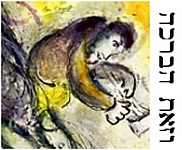
When R' Bunam was lying on his deathbed, his wife wept bitterly. Thereupon he said, "Why are you weeping? All my life has been given me merely that I might learn to die."
11.21.24 (Cheshvan 20, 5785) Shalom chaverim. Recently we read about Abraham's greatest trial of faith when God asked him to take his promised son and sacrifice him as a burnt offering. How are we to understand this test, and what might we learn from it? Abraham's obedience is a central lesson of course, and his willingness to sacrifice his son demonstrated his faith in God. But this willingness reveals the utmost level of surrender, a "faithful crucifixion" of his life that bore witness to the coming lamb of God who would be sacrificed to bring healing for the whole world.
The story of Abraham's "walk of faith" is one of testing and great perseverence. Though he had heard God's call to "lekh-lekha" (לךְ־לְך), "to go" to an unseen land of promise and blessing, there were many troubles along the way. After he made the long journey from Ur of the Chaldees and came to the land as directed by God, he immediately encountered a severe famine which forced him leave the land and go to Egypt in search of food. Unfortunately while in Egypt his wife Sarah was abducted into the Pharaoh's harem to be a concubine. After God plagued the king's house and warned him to "let my people go," the pharaoh hastily summoned Abraham and told to take his wife and go back to the promised land (prefiguring the later Exodus from Egypt under Moses). When Abraham and Sarah returned to the land of Canaan, his nephew Lot separated from them and moved to the Plain of Jordan, near Sodom and Gomorrah, to find more pastureland for his growing cattle and herds. Some time later a war broke out in the Plain and Lot and his family were taken captive by the conquering kings of the area. Abraham marshaled his clan and rescued his nephew from captivity. After this he was met by the mysterious "Malki-Tzedek," the king and priest of Shalem, who brought out bread and wine and blessed Abraham in the name of the Most High God, the Possessor of heaven and earth (אֵל עֶלְיוֹן קֹנֵה שָׁמַיִם וָאָרֶץ).
Some time later God appeared to Abraham in a vision to reaffirm his promise to make him into a great nation. After showing him the vast sweep of the stars in the night sky, God said "so shall your offspring be." Despite his years of apparently fruitless wandering, Abraham believed God and God accounted his faith as righteousness (Gen. 15:6). The LORD then renamed Abram, meaning "exalted father" to Abraham. meaning "father of a multitude." He also renamed Sarai (meaning "princess") to Sarah, appending the letter Hey (ה) to indicate his blessing and presence. God then made covenant with Abraham to inherit the land of Canaan forever; Abraham was 75 years old when he had this vision.
After he had lived in the land of Canaan for some time, Abraham began to wonder how God's promise to make of him a great nation would be realized. The years were passing by and he and Sarah remained childless. Perhaps Eliezer of Damascus, his chief servant, was to be his heir? Sarah, also eager for a child, decided to take matters into her own hands and ordered her servant Hagar, given to her by the Pharaoh in Egypt to be his concubine. Hagar became pregnant but Sarah soon became jealous. She treated Hagar so harshly that she ran away but later returned after she was met by an Angel who promised that her child would also become a great nation. Abraham was 86 years old when Ishmael was born (Gen. 16:1-16).
Nearly 25 years later, after the vision of the stars, when he was 99 years old, God appeared to Abraham using the name El Shaddai (אֵל שַׁדַּי), "the All-Sufficient One," and reaffirmed his promise that he would be the father of a multitude of peoples by establishing the covenant of circumcision (Gen. 17). Soon after this revelation Abraham was visited by the three angels, one of whom was the Angel of the LORD himself, who told Abraham that Sarah would indeed have a son within a year. Sarah laughed at the announcement, but the LORD affirmed his words (Gen. 18:1-15). The other two angels then left to go to Sodom, to determine whether it would be condemned to judgment, while Abraham spoke with the Angel of the LORD and interceded on behalf of the city. Nevertheless Sodom and its surrounding area was destroyed by fire and brimstone, though Lot and his daughters escaped (Gen. 18:16-19:20).
When Abraham was 100 years old, Sarah indeed gave birth to a son! They called his name "Isaac" (i.e., Yitzchak) as directed by the Lord (Gen. 17:9), a name which means "he laughs" a play on words that expressed the great joy of Abraham and Sarah over the miracle of their son (Gen. 21:1-7). Abraham circumcised his son when he was eight days old, as God had commanded. After Yitzchak was weaned, however, Sarah demanded that her servant Hagar and her son be removed from the family so that there would be no controversy about who the promised heir of Abraham truly was. In sorrow Abraham sent them away, though God told him that Ishamael would survive and become a great nation. The LORD reaffirmed to Abraham, however, that Yitzchak alone was the chosen heir through whom his descendants would come. "In Isaac your seed shall be called..." (Gen. 21:12).
The Torah is silent about the early years of Isaac, but many years later, when Abraham was 137 years old (and therefore Isaac was 36), he faced his greatest trial of faith when God asked him to sacrifice Isaac as a burnt offering on a mountain... Wait, what? Is this for real? After all his years of hope and struggle, would it all come down to this: the sacrifice of his beloved son? a "whole burnt offering" of his dreams, the holocaust of his vision?
And what about Isaac? When was he asked to become the sacrificial victim? Did he understand what was being asked? Did he have some earlier premonition? He was no longer a child but a grown man. Abraham needed Isaac to agree to become the sacrificial victim, but how could he explain all this to him without sounding insane? Apparently he did not object, though it must have greatly alarmed him. This test was not just for Abraham but for his son Isaac, too, and it was to Isaac's great credit that he willingly submitted to the request of his father to die on his behalf...
Perhaps you are tempted to think all this was a "charade" of sorts? That Abraham knew all along that Isaac wouldn't die, that God wouldn't allow this to really happen, and therefore he went along with just to play his part in the macabre drama? But there is no such indication given in the Torah. God's instructions were clear enough and unambiguous. Abraham would sacrifice, that is, slaughter his son upon an altar and then burn his body as a whole burnt offering. I do not think it was meant to be a "prophetic parable," because what sort of a test would that be? What sort of sacrifice? For his part, Abraham was ready to do God's will, no matter what was asked of him. The very next morning after God asked him to sacrifice his son Isaac, Abraham saddled his donkey and got things ready for the offering (Gen. 22:1-3).
Recall that the first "lekh-lekha" (לךְ־לְך) was a call to go to the "promised land" of God: "Go from your homeland (מֵאַרְצְךָ), and from your kindred (וּמִמּוֹלַדְתְּךָ), and from the house of your father (וּמִבֵּית אָבִיךָ), to a land that I will show you" (Gen. 12:1), and the second "lekh-lekha" was a call to go and annihilate the vision the promise of becoming the father of the nation: "Please take your son (קַח־נָא אֶת־בִּנְךָ), your chosen son (אֶת־יְחִידְךָ), whom you love (אֲשֶׁר־אָהַבְתָּ), namely Isaac (אֶת־יִצְחָק), and go to the land of Moriah (וְלֶךְ־לְךָ אֶל־אֶרֶץ הַמֹּרִיָּה) and offer him there as a burnt offering (לְעֹלָה) upon one of the mountains which I will show you" (Gen. 22:2). Go away from all you were - your history, your birthplace, your father's house ... and come to the place that transcends all that is natural and of this world, a place of resurrection and the world to come. In both cases there is a call to the unknown and the test to believe that God would lead him to the place of blessing, despite everything he faced (Gen. 12:2, Gen. 22:17). In the climactic test, however, God showed Abraham the cross of Messiah, the place where his Son would be bound and offered as a sacrifice for the healing of the nations. It reveals the heart of the Father who would give up everything, including his beloved Son, so that we may have eternal life.
According to the author of the Book of Hebrews in the New Testament, Abraham believed that God would raise Isaac from the dead after he completed the sacrifice: "By faith Abraham, when he was tested, offered up Isaac, and he who had received the promises offered up his only begotten son, of whom it was said, 'Through Isaac shall your offspring be called.' He considered that God was able even to raise him from the dead, from which, figuratively speaking, he did receive him back" (Heb. 11:17-19). Imagine Abraham binding Isaac's arms and feet while saying, "After the sacrifice, I will see you again: you will be brought back to life!" No matter how we may try to rationalize this, it is clear that Abraham accepted God's will - even if what was asked seemed terrifyingly preposterous, even insane...
They followed the cloud. After three days they reached the mountain, the place of the sacrifice. They left the others behind as they began their ascent. Isaac carried the wood that would burn his body. Abraham carried the knife and the torch. Together they built an altar of stones and arranged the wood for the fire. Abraham then asked Isaac to lay himself down on the altar as he bound the hands and feet of his son.
As Abraham silently looked upon the knife, all of his history, his hope, and his struggle was refracted back in the glint of the blade's edge. Was he willing to go through with this? Even if God would bring Isaac back from the dead, would he be able to plunge the knife into the heart of his promised child, the heir of his life? He steeled his resolve and carefully lifted the knife above his waiting son. Their eyes met and both took a deep breath just as Abraham was about to thrust the knife down. At the very last instant, the Angel spoke: "Abraham! Abraham! Do not lay your hand on the lad, or do anything to him; for now I know that you fear God, since you have not withheld your son, your only son, from me" (Gen. 21:11-12).
After a moment of utter shock, Isaac was released, unbound from death, and raised up to new life. For the Angel testified before heaven and earth that the sacrificial act was "fait accompli," an accomplished fact, and that Abraham had indeed offered up his only begotten son who had been raised from the dead. It was just then that Abraham saw the "ram caught in the thicket" that was to be sacrificed in Isaac's place. But why a ram instead of a lamb? Because when Abraham had said, "God will provide for himself a lamb" (אֱלֹהִים יִרְאֶה־לּוֹ הַשֶּׂה) this referred to the coming of Yeshua, the great Lamb of God, but the ram was provided for Abraham in place of Isaac for the sacrifice. The ram was not the lamb that God would provide "for himself" to atone for the sins of the world and reconcile his justice with his love, but rather a sacrificial ram that was provided for Abraham in place of Isaac. This seems to be the right understanding since later Abraham called the place of the altar at Moriah "Adonai Yireh" (יְהוָה יִרְאֶה), in reference to the Lamb God to come who was to be provided for by God himself in fulfillment of the prophecy (Gen. 22:8, Gen. 22:14).
The ashes of the sacrificed ram represented the dust and ashes of Isaac, and of Abraham as well. The "ashes of Yeshua" came from his passion upon the cross, and represent the atonement and exchange he made for the resurrection from the dead. God did indeed provided the Lamb - Adonai yireh ha'seh - and we will see this when we "ascend to the mountain" (Gen. 22:14). Yeshua later told the rabbis of his day, "Abraham rejoiced to see my day: and he saw it, and was glad." When they objected by saying that he was too young to ever have seen Abraham, Yeshua answered: "Truly, truly, I say to you, before Abraham was, I AM," which provoked them to try to stone him for blasphemy (see John 8:56-59).
Allow me now to consider whether Abraham might have been traumatized by the (near) sacrifice of his son. The sages say that when Sarah later understood what had happened, her heart gave out and she died. And Abraham's relationship with Isaac may also have been fractured as well. Did Isaac hear the voice of the Angel? The Torah does not indicate that he did. Perhaps Isaac was also deeply traumatized by the ordeal and needed some time apart from his father. Later on, after Abraham commissioned his chief servant Eliezer of Damascus to find a bride for his son, there is no recorded dialog between the father and son, and while Abraham bequeathed everything he had to Isaac, the last time Isaac saw his father was at Abraham's burial at Machpelah (Gen. 25:9). At any rate, the sacrifice at Moriah must have haunted Abraham during his remaining days, yet he pressed on in faith, later remarrying and having other children. Like the story of Job, from the whirlwind God's blessing will come...
Recall at the outset that I had wondered whether Abraham might have been tempted to protest God's will for life, and that leads to the related question of whether you have ever found yourself protesting the course of your life and inwardly wrestling to accept God's will... Do you struggle with the call to "take up the cross" as did Abraham - and follow Yeshua?
How much do you "need" to understand before you are willing to let go and surrender? Do you put God in the test - subconsciously demanding that he justify himself to you before you will obey? How did Abraham find the paradoxical strength to die to himself? How do we?
So much is beyond our control and we understand so little. We can either abhor all that happens that we cannot understand, or we can trust that God has a plan that, although inscrutable to us and sometimes seemingly cruel, is nevertheless the ordained way of our lives. Yes, "ordained," for nothing happens in our lives due to "random" forces or by chance, for the LORD God Almighty knows the beginning from the end, and all of reality is His story to tell. God is the Central Character of the thing called "life," and indeed He is the creative force and Author of all that exists. Faith believes that the story is about his vindication of love despite all the darkness, evil and shame that seeks to deny its fulfillment.
Reinhold Niebuhr's well known "Serenity Prayer" expresses the balance we need to walk in the present ambiguity and "already-not-yet" fulfillment of God's story. It begins, "God, grant me the serenity to accept the things I cannot change." That's most things of life. Nearly everything. "Who among you by being anxious can add a single hour to his span of life?" "Serenity," or inner peace (שָׁלְוָוה פְּנִימִית), first comes from "acceptance" (קַבָּלָה), that is, receiving whatever is the case (קבלה של הכל), and not fighting it, not lamenting over it, not negotiating with it - just willingly accepting it as something God has allowed. "Thy will be done." Whatever bothers us is likely out of our hands anyway, and it is tragically foolish to "play God" in any circumstance.
"God grant me the serenity to accept the things I cannot change," yes, that makes sense, but the prayer continues, "and [grant me] the courage to change the things I can." Though many things are indeed beyond our control, such as who our parents and ancestors were, when and where we were born, the state of the world we inhabit, and so on, some things are not. There are genuine choices we must make in life for which we are responsible and from which we cannot abstain. "Ought implies can" which means there is a moral order to reality and that we have the ability to make meaningful choices. We are born with a conscience; we have intuitive awareness of right and wrong, of good and evil. Choosing not to chose is itself a choice; saying you "can't help it" and making excuses by blaming circumstances is "bad faith." To decide means to "cut away" other options, and that requires courage because we don't know the effect of our choices with certainty. We are nevertheless accountable for whatever we choose, and our judgments and reasons that justify our choices imply that we are responsible for how we think, for our attitudes, our values, and so on. Faith provides the courage to trust in the unseen good rather than to allow fear to devour our souls.
The Serenity Prayer ends with the phrase, "and [grant me] the wisdom to know the difference." This is very practical. Some things you can't change and must accept; other things you can change and must choose. Wisdom is understanding what's in your power and what's not, and therefore knowing what you must accept (for the sake of inner peace) and what you must actively fight (for the sake of duties of your heart). Acceptance is based on necessity whereas courage is based on possibility; knowing the difference is wisdom.
"Faith is nothing else but a right understanding of our being - trusting and allowing things to be; a right understanding that we are in God and God whom we do not see is in us."- Julian of Norwich
Surely it takes wisdom to relate to God - for that is what we are talking about, really -- how to find peace by surrendering to his will, and how to find courage to take responsibility for whatever you decide to do. The life of faith is not easy and tests are inevitable. God designed it that way and we must accept that. Yet we must choose to keep hope alive despite our finitude, brokenness, and inability to fathom much of anything. At times we will experience respite and calm; at other times we will struggle and fight. Either way we need wisdom. As Job said Adonai natan, v'Adonai lakach: yehi shem Adonai me'vorakh: "The LORD has given, the LORD has taken away; let the name of the LORD be praised" (Job 1:22). Whatever happens, however, we call out to God for his blessing and help. We seek His face. We will not give up, even if we don't understand. And that is the Torah of Abraham, who courageously accepted everything and was set free by choosing to believe in the truth of God's love.
Hebrew Lesson
Jeremiah 29:11 reading (click for audio):
God's Pursuing Love...
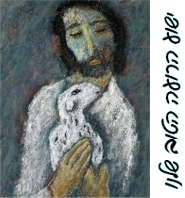
11.21.24 (Cheshvan 20, 5785) Where it says, "Surely goodness and kindness (טוֹב וָחֶסֶד) shall follow me all the days of my life" (Psalm 23:6), note the Hebrew verb translated "shall follow me" (i.e., יִרְדְּפוּנִי) comes from a root (i.e., radaf: רָדַף) that means "to pursue," as a hunter chases after his prey. In this connection the Baal Shem Tov once asked, "But why the need for pursuit? Does anyone flee from goodness and kindness so that these must pursue him?" And he answered: "Indeed they do. A person may flee from something he thinks is harmful, not knowing that it is heaven-sent and intended for his advantage."
This interesting interpretation suggests that we may try to protect ourselves even at the expense of receiving a blessing. Do we allow fear to rob us of the chance to grow? The sages comment that if we flee from what is good because we mistakenly regard it as evil, we should pray, as David did, that the hidden good should pursue us relentlessly. Amen. As David also prayed: "Who can understand his errors? Cleanse me from secret faults" (Psalm 19:12). The tragedy is that our secret faults often make us our own worst enemy.
At any rate, given the context of this beloved Psalm, it is clear that King David was sure that God's kindness would "hound" him as he made his way through this world - even in the dark places, even in "the valley of the shadow of death" (בְּגֵיא צַלְמָוֶת) - where God's rod and staff would comfort him and direct his way (Psalm 23:4). Amen, thank God for Yeshua our Good Shepherd (ישׁוע הָרוֹעֶה הַטּוֹב שֶׁלָנוּ) who lays down his life for his sheep (John 10:11). Praise God that He came to seek and to save the lost (Luke 19:10).
Hebrew Lesson
Psalm 23:6 Hebrew reading (click):
Our Times in His Hand...
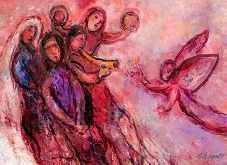
The following is related to our Torah reading for this week, Chayei Sarah...
11.20.24 (Cheshvan 19, 5785) Do you understand that in God's sovereign design and plan for creation, He breathed out a part of his very heart, soul, and strength to create you in his own "image and likeness," a reflection of his own self-existence and reality? This is the essential blessing each of us has been given. Rene Descartes' intuitive awareness of the inner witness of the soul: "I think therefore I am," echoes the אֶהְיֶה אֲשֶׁר אֶהְיֶה, "I am that I am," within our hearts. The LORD is the "God of the spirits of all flesh" (Num. 16:22) for "in Him we live and move and have our being" (Acts 17:28).
The moments of our lives, the ups and downs of our goings, the length of our days - and especially the purpose and end of our existence - are all in the hands of God, as it says: "In you I put my trust, O LORD; I said, 'You are my God; my times are in your hands" (Psalm 31:14-15). A person may "devise his own way," but it is the LORD that directs his steps.
If we consider our lives apart from God, however, all we see is wretchedness, limitations, shortness of days, and the absurd specter of death at the end of it all. Life always seems too short; the days fly past us like a dream, soon we are "cut off" and gone. When the moment of death occurs, many are lost to its eternal significance... They die unprepared.
On the other hand, when we trust that our lives are under God's providential direction, and we realize that our Heavenly Father "numbers the hairs on our head," then we can quiet our hearts and abandon ourselves to his care (Isa. 46:8-10; Psalm 103:19). As it is written: "Those who trust in you know your Name; for you do not forsake those who seek you, O LORD" (Psalm 9:10). And as the Apostle Paul preached to the Athenians, "God, who alone is Creator, the Lord of heaven and earth, has given life and breath to all people, and from one man has made every nation of people to live on the earth, having determined prescribed times and the boundaries of their habitations" (Acts 17:24-26).
For the believer there is no greater comfort than to trust that the LORD will work "all things together" for our ultimate good (Rom. 8:28). "Whoever lives and believes in me shall never die" (John 11:26). Yet there is a veil, an ordained obscurity. "God has made every thing beautiful in his time, and he has set eternity in people's hearts, so that no one can find out what he has ordained from the beginning to the end" (Eccl. 3:11). So while we know only "in part," as through "a glass darkly," we believe that the LORD goes before us and will always be with us (Deut. 31:8). And one day we shall see him "panim el-panim," face to face (1 Cor. 13:12). "Beloved, now are we the children of God, and it does not yet appear what we shall be: but we know that, when he shall appear, we shall be like him, for we shall see him as He is; and everyone that has this hope in Him is purified, even as he is pure" (1 John 3:2-3).
Χάριτι δὲ θεοῦ εἰμι ὅ εἰμι - "by the grace of God I am what I am" (1 Cor. 15:10). This is a radical axiom that should be foundational to our faith, namely that nothing occurs in our lives apart from God's will for our ultimate blessing. From small matters to big, from the seemingly insignificant to the momentous, from what seems hopelessly undone to the sheer miracle and glory of existence itself -- categorically everything, in every conceivable world, is under the sovereign hand of the One who works all things together for his glory and for our good. Amen. Yeshua "upholds all things" (φέρων τε τὰ πάντα) by the word of his power. "All things were created by him, and for him, and in him all things hold together" (ἐν αὐτῷ συνέστηκεν). He is the "Magnetic Center" of reality, its beginning and its end (Col. 1:16-17).
How could it be otherwise? For who can overrule the will of God our Creator and the LORD over all? "From eternity to eternity I am God. No one can snatch anyone out of my hand. No one can undo what I have done" (Isa. 41:13). "For the Lord of hosts has planned, and who can frustrate it? And as for His stretched-out hand, who can turn it back?" (Isa. 14:27).
Therefore do not be afraid. "For I know the thoughts that I think toward you, says the LORD, thoughts of peace and not of evil, to give you a future and a hope" (Jer. 29:11). As Yeshua said: "Fear not, little flock; for it is your Father's good pleasure to give you the kingdom" (Luke 12:32). Hallelujah! For the Lord our God, the Almighty, reigns!
Hebrew Lesson
Psalm 9:10 reading with commentary (click):
The Thirst of Hope...
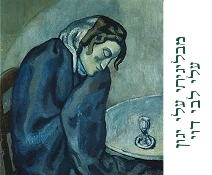
11.20.24 (Cheshvan 19, 5785) It's been difficult time over the last few years, and I appreciate your prayers. There have been family problems as I've told you before. My kids need your prayers. I have been waiting for the LORD through sleepless nights, the banality of gray days, punctuated by pain, sighs of heartsick hope, fearful whisperings, and loneliness. It sometimes feels like the "samsara" of the desert, a place of exile. There is no place I want to go anymore... I walk with a limp, friends. The sages say that our father Isaac went blind because the angel's tears fell into his eyes as he lay bound upon the altar... I wonder if he might have later asked himself what use is there to see any more of this world? But (surprisingly) God used his blindness to allow the blessing to be given to Jacob, after all.
Some wounds are incurable in this present life... I have felt swallowed up in grief and inexplicable sorrow from days before I knew my right hand from my left. Shame has been a constant companion; melancholy my muse. I cannot outrun myself. "Cursed be the day wherein I was born!" exclaimed both Job and Jeremiah (Job 3:3; Jer. 20:14). "If this is how you are going to treat me, please go ahead and kill me -- if I have found favor in your eyes -- and do not let me face my own ruin" said Moses (Num. 11:15). Elijah likewise prayed that he might die: "I have had enough, Lord," he said. "Take my life; I am no better than my ancestors" (1 Kings 19:4).
Of course personal suffering in this life is common enough, and no one is immune to it, though it is especially poignant, I think, to souls that seek God's presence and love above all things, for these people are bound to be misfits in this world of vanity and conceit. Soren Kierkegaard is such an example, and he once wrote: "What is a poet? An unhappy man who hides deep anguish in his heart, but whose lips are so formed that when the sigh and cry pass through them, it sounds like lovely music.... And people flock around the poet and say: 'Sing again soon' - that is, 'May new sufferings torment your soul but your lips be fashioned as before, for the cry would only frighten us, but the music, that is blissful."
Jewish philosopher Martin Buber spoke of the loneliness that results from Modern society, which he called an "It-world" that is marked by the prevalence of "IIt" rather than "IThou" relationships. The realm of the "institution" objectifies or "thingifies" people, and this bureaucratic "system" creates a sense of existential angst. Trapped in the "It-world," people begin to feel that life is meaningless, as they are numbered among the "faceless crowd" and are enthralled in a Kafkaesque prison of loneliness... The way out for Buber - and this is surely right - is to be in a life-transforming relationship with God, the ultimate "I-Thou" connection that will sustain our way despite the hardness of the "It-world."
Our Lord said: "Blessed are those who hunger and thirst for righteousness..." (Matt. 5:6). Yes, blessed are those who suffer such desperate need, who know inner emptiness, who are not made numb to the ache, and who cry from the heart for deliverance. Blessed are those who are in dread over themselves, who fall as one dead before the Divine Presence, who know they are undone, ruined, and dying for life... The great danger, spiritually speaking, is to become complacent, untouched by poverty of heart, to be lulled asleep, lost within a dream, made comatose, living-yet-dead. The gift of faith first reveals our own lostness and then imparts courage to live with ourselves despite ourselves as we seek God's healing and life...
"Blessed art Thou, LORD our God, who never leaves nor forsakes us, and who draws us close through hunger and thirst." Amen. We are truly blessed when we ache with heartfelt longing for the Divine Presence... This is not some form of masochistic spirituality. Feeling content, unconcerned, satisfied, numb, etc., may be a sign of a dreadful condition of heart. "You, God, are my God, earnestly I seek you; I thirst for you, my whole being longs for you, in a dry and parched land where there is no water" (Psalm 63:1).
Well I didn't intend to make this a long post, so I will close for now. I hope I didn't come across as being full of self-pity, friends. I know we all struggle and hurt at times. But please remember me in prayers, for I truly need them. And I pray that Hebrew for Christians will not be an "I-it" relationship for you, but one that helps you draw closer to the LORD and the "I-Thou" blessing of knowing him better. Amen.
Hebrew Lesson
Psalm 42:2 reading (click):
Truth of the Heart...
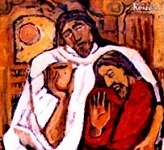
11.19.24 (Cheshvan 18, 5785) When Yeshua proclaimed, "Do not think that I have come to destroy the Law or the Prophets; I have not come to destroy them but to fulfill them" (Matt. 5:17-20), he was actually amplifying the message of both Moses and the prophets, though his interpretation was contrary to various "traditional" views of his day. "You have heard that it was said [in the law, or by your sages...] ... BUT I SAY unto you..." Wait. What did he say?
As a good Jewish teacher, Yeshua continually affirmed the inner meaning of the Torah, especially the Shema and the related obligation to love others (Matt. 22:36-40). In that regard His doctrine was surely a continuance of the Torah's foundational message. However, Yeshua clearly extended the reach of the Torah to include the inner heart attitude of the person. Observing the law was not a matter of adhering to various external codes of conduct but involved the rigorous self-examination of the heart and soul.
The law forbade murder, for example, but Yeshua extended the scope of the law to reach the intent of the heart: "You have heard it said (i.e., by Moses himself as he quoted the words of YHVH) 'You shall not murder...' but I say unto you that whoever is angry with his brother without a cause is liable to excommunication; whoever insults his brother is liable to punishment, and whoever calls his brother a fool is in danger of the fires of Hell" (Matt. 5:21-22). As someone once put it, murder is just anger "communicated really well..."
Likewise, the law forbade the act of adultery, but Yeshua did not focus on the external action but rather the condition of the heart: "You have heard it said, (i.e., by Moses himself as he quoted the words of YHVH) 'You shall not commit adultery.' But I say to you that everyone who looks at a woman with lust in his eye has already committed adultery with her in his heart." When Yeshua explained that the law's intent was to prevent even looking with lust upon a woman, then for all the more reason it should be obvious that we refrain from physical acts of adultery or fornication. They eye sees through the heart.... Dealing with the heart attitude behind the lustful look therefore obviates the need to forbid the outer practice of the flesh (and therefore fulfills the intent of the law against adultery).
In matters relating to 1) divorce (i.e., Deut. 24:1-4), 2) the taking of oaths (Deut. 6:13; 10:20; Num. 30:2; Exod. 20:16), 3) the exercise of retribution (Exod. 21:23-24, Lev. 24:19-20; Deut. 19:21), and 4) the obligation to hate one's enemies (Deut. 7:2, 13:15-17, 20:16, Psalm 137:9, etc.), Yeshua actually circumvented the written words of Torah by denying matters that were technically permissible according to the "letter of the law" (Matt. 5:31-47). We see this clearly in the case of divorce, for instance. When the Pharisees asked him whether it was permissible to put away one's wife (Deut. 24:1-4), Yeshua answered: "Because of your hardness of heart Moses allowed you to divorce your wives, but from the beginning it was not so" (Matt. 19:8). Note that this was a "concession" added by Moses that was not genuinely God's will, and indeed the rigor of Yeshua's interpretation superseded that of Moses himself, who permitted divorce as a concession to human frailty and evil. Indeed, in each of these examples (divorce, taking oaths, retaliation, tribal loyalty), Yeshua's interpretation was more demanding and rigorous than the laws written in the Torah of Moses.
By expounding the requirements of the law with such rigor, Yeshua was claiming equal authority with YHVH Himself (יהוה). After all, each antecedent clause, "You have heard that it was said..." referred to an explicit utterance made by God Himself at Sinai. Yeshua then authoritatively extended the reach of the commandment by identifying its underlying ethical intent. This is what he meant by "fulfilling" the Law, or reaching the goal of the Torah's message. The time of "circumcision of the heart" was at hand (Deut. 30:6). The message of the law was to be written on hearts of flesh, not tablets of stone (Jer. 31:33, 2 Cor. 3:3,6).
Like a flawless mirror, the law of God reflects back to us the truth of our moral and spiritual condition, and thereby reveals our need for deliverance from ourselves (that is, if we are willing to truly look and to be honest with ourselves). The "problem of the law" is that it is "weak" on account of human "flesh," and therefore remedy had to be sought through other means (Rom. 8:1-4). This is the ultimate gospel message itself - that God sent His Son to both save us from the just verdict of the law (through Yeshua's substitutionary sacrifice) and to provide the heart's means to serve Him in the truth (through the agency of the Holy Spirit, given to those who trust in Him).
Let's consider again Yeshua's thinking about adultery: "You have heard it said, 'You shall not commit adultery.' But I say to you that everyone who looks at a woman with lust has already committed adultery with her in his heart." The sin has to do with how the eye is used to see. The "way" of seeing is the crux of the matter, for that exposes the illicit desire hidden within. According to Yeshua, no thought is trivial or without spiritual importance. Every word we speak is a form of confession (Matt. 12:36-37). "To the one that has, more shall be given" is a spiritual law. The more you entertain evil thoughts, the more evil thoughts will be given, and the converse is true as well: the more you entertain good thoughts, the more ennobled you shall become. "As a man thinks in his heart, so is he." These are matters about our inner life. Yeshua teaches righteousness that "exceeds the righteousness of the scribes and Pharisees," the inner meaning of the "law" of God...
Some "religious" people want to measure their actions according to the "letter of the law," supposing that if they do not contradict the "legal language," they are innocent, regardless of their "private" thoughts or feelings which are deemed to be irrelevant to matters of fact. They approach the law of God like a tax accountant seeking to avoid an audit.
This legalistic approach lends itself to minimizing the responsibility we have for our inner thoughts and motivations, and thereby suppresses the deeper reason for the law itself. Someone may be technically innocent from committing an act of adultery though his heart be filled with lustful desire and infidelity, yet it is the evil desire that is impetus for the law in the first place. Intuitively we understand that evil thoughts and intentions lead to evil actions. This is called "premeditation," meaning that the person has at first thought about doing the action before it was done. It is a matter of cause and effect. To deny this is almost the definition of insanity.
A person may not literally steal from others but his heart be filled with covetousness and greed; another may say they would never murder someone, yet they refuse to forgive others, they allow anger to fester within them, and by means of resentment they effectively "destroy" others by cutting them off. You can think of other applications of these principles, but this should suffice to indicate that the inner life of the mind and heart really do matter, and that God is not indifferent to the moral character and integrity of our lives...
It is our duty, then, to control ourselves, to think clearly, and to focus on the good, true, beautiful, loving, and honorable. "Think on these things" (Phil. 4:8). Positively this means using the "good eye" by looking for what is healing and life-giving, while negatively this means repudiating evil and ugly thoughts, resisting the insinuations of the devil, and taking every thought captive to the truth of Messiah. In order to respect others, we must respect ourselves, and that means understanding that nothing is trivial and everything matters.
Hebrew Lesson
Psalm 51:6 reading (click):
We have a moral and spiritual duty to think clearly and not to abuse our minds (Phil. 4:8; Rom. 12:2). The LORD our God will help us to do this, as Yeshua said: "I will ask the Father, and he will give you a Helper (παράκλητος, someone "called to one's side"), to be with you forever, even the Spirit of Truth (רוּחַ הָאֱמֶת), whom the world cannot receive, because it neither sees him nor knows him" (John 14:16-17). The Spirit of Truth helps us "discern what is the will of God, what is good, acceptable, and perfect" (Rom. 12:2) and empowers us to take "every thought captive" to the reality of the Divine Presence (2 Cor. 10:4-5).
Followers of the Lord are commanded to love the truth and to think clearly about their faith. The ministry of reconciliation itself is defined as "the word of truth, by the power of God, through weapons of righteousness" (2 Cor. 6:7). Indeed, the word of truth (τὸν λόγον τῆς ἀληθείας) is a synonym for the "gospel of salvation" itself (Eph. 1:13; Col. 1:5; James 1:18). We are saved by Yeshua, who is the "way, the truth, and the life" (John 14:6). God commands all people to believe this truth (Acts 17:30-31; 1 Tim. 2:4). People perish because "they refuse to love the truth and so be saved" (2 Thess. 2:10-12). Therefore we see that the issue of truth -- and by extension thinking truthfully - is essential to salvation itself...
Finally, friend, a closing thought. Let us not despair by thinking that we will never change. We must simply "enter into" the presence of God in Yeshua. That is what "self-denial" really means: Turning to God to know his heart. And when we do, we receive a heart to know him in return... Let us "believe to see" the goodness of the LORD in our midst. Amen.
 |
Making the Dead Alive...
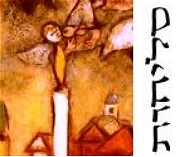
11.18.24 (Cheshvan 17, 5785) We must be careful not to confuse cause and effect in the realm of the spiritual. After the original transgression of Adam and Eve, death became the root problem of the human condition, so to speak, with indwelling sin as its fruit (i.e., the "works of the flesh"). It is this inherited "spiritual death" that causes sin. To focus on outward behavior without first of all dealing with the underlying problem of spiritual death is therefore a misstep. It is to clean the outside of the cup or to wash the outside of a tomb in a vain attempt to disguise the truth about our unclean and dead condition. The good news is not that God wants to make bad people good, but rather wants to make dead people alive... The cure for spiritual death is to be spirtually reborn and to partake of the resurrected life of Yeshua.
Following Yeshua is not a sort of "moral reformation" or self-improvement program to make us acceptable to God. Yeshua did not die on the cross so that we would become entangled in the old ways of being... No! He is Lord and Master and we find new life in His acts of deliverance done on our behalf and for our benefit. The temptation is always to go back to the law of sin and death (i.e., the principle of self-justification), but as Luther once said: "The sin underneath all our sins is the lie of the serpent that we cannot trust the love and grace of Christ and that we must take matters into our own hands."
"LORD, I need Thee every hour..." There never will be a time when we "get past" the need for God's grace given in Yeshua, since the only antidote to power of indwelling sin is the greater power of God's redeeming love within our hearts (1 John 3:8). The gospel is - not was - "the power of God for salvation (δύναμις θεοῦ ἐστιν εἰς σωτηρίαν) for everyone who believes" (Rom. 1:16); it is an ongoing source of power for our lives... Our identity is made secure in the finished work of the Messiah - we trust in His strength, not our own; it is "Messiah in you" that is the hope of glory (Col. 1:27). Just as we are given a new life entirely by means of God's grace, so we are also sanctified as we walk in that newness of life... "As you received Yeshua the Messiah the LORD, so walk in Him" (Col. 2:6). The focus is always on Yeshua and His righteousness and obedience... Every step of the way is a miracle and a wonder when we walk "in Messiah."
We walk "in Him," that is, in His strength, in His power, in His love... we don't walk "to" Him or attempt to climb the "stairway to heaven." Yeshua is the Way, the Truth, and the Life. He is the Bridge - sha'ar hashamayim (שַׁעַר הַשָּׁמָיִם) and the Divine Ladder upon whom the angels of God ascend and descend. We look to Him, not to ourselves for life. Because of the life of Yeshua within us, we are now able to bear fruit of the Holy Spirit as the Torah is written upon our hearts (Jer. 31:31). We are enabled to keep the Torah of Yeshua (תּוֹרָה יֵשׁוּעַ) because the life of Yeshua empowers us to do so...
Hebrew Lesson
Psalm 138:8 reading (click for audio):
Biblical Hebrew Wordplay...
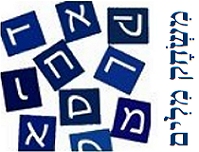
11.18.24 (Cheshvan 17, 5785) The Hebrew Scriptures are filled with various kinds of wordplay. In addition to some humorous play on words (i.e., puns), you will discover alliteration, acrostics, parables, similes, metaphors, theophorisms, hyperboles, gematria, and other literary devices present in the Hebrew text. Some scholars even suggest that the first two words of the Torah (i.e., בְּרֵאשִׁית בָּרָא / bereshit bara) were intentionally spelled using the same initial three letters (בּ.ר.א) for the sake of "alliteration" (i.e., repetition of sound). At any rate, examples of wordplay often appear on the surface-level of the texts. For example, "Adam" (אָדָם) is a play on the word adamah (אֲדָמָה, "ground"); Chavah (חַוָּה, "Eve") is a play on the word chai (חַי, "life"); Kayin (קַיִן, "Cain") is a play on the verb kanah (קָנָה, "to get"), and so on (see Gen. 2:7, 3:20, 4:1). Even the name "Jesus" (i.e., Yeshua: יֵשׁוּעַ) plays on the Hebrew word for deliverance or salvation (i.e., yeshuah: יְשׁוּעָה). Many other examples could be cited.
Of particular relevance to our recent Torah readings is the name Yitzchak (יִצְחָק, "Isaac"), which plays on the verb tzachak (צָחַק, "to laugh"). Some have said that tzachak is "onomatopoeic," that is, it imitates the sound of laughter itself. Appropriately enough, the root appears a number of times in the story of Isaac, though often with different connotations. The simple stem (kal) of tzachak conveys the idea of laughter, whether in joy or incredulity, though the stronger stem (piel) suggests more intense expressions, for example rejoicing, playing, and making love -- or (negatively) mocking, scorning, and deriding. In other words, the motive for laughter is only contextually understood. After all, there's a big difference between laughing at someone and laughing with them.
At any rate, God Himself named Isaac in response to Abram's laughter over the prospect of having a child in his old age. Here's some of the "back story." God originally called Abram to leave Ur of Mesopotamia for the land of Canaan (Gen. 12:1). When he arrived there, God appeared to him and promised that his descendants would inherit the land (Gen. 12:7). Abram was 75 years old at this time. Abram wandered through the land waiting for God's promise to be fulfilled. Some time later (but before the birth of Ishmael), God came to him in a vision and reaffirmed his promise that he would have a son "from his own loins" (Gen. 15:1-5). Abram "believed in the LORD, and He credited it to him as righteousness" (Gen. 15:6). The LORD then made the "covenant of the pieces" to seal the agreement to give the land of Canaan to Abram's descendants (Gen. 15:7-20). Ten more years passed, however, and Abram and Sarai were still childless. In a lapse of faith, Sarai urged Abram to sleep with her Egyptian maidservant, Hagar, in order to produce the family heir. Ishmael was born when Abram was 86 years old (Gen. 16:16).
Another thirteen years passed before God appeared to Abram to renew his earlier promise that he would become a "father of a multitude" (Gen. 15; 17:7). Abram was now 99 years old. To symbolize Abram's changed status, God changed his name from Avram ("exalted father" [from אָב, "father," + רָם, "exalted"]) to Avraham ("father of a multitude" [from אָב, "father" + המוֹן, "crowd"]). (Note that some scholars regard Avraham's name to mean "father of mercy" (from אָב, "father" + רחם, "womb"). Likewise God changed Sarah's name from Sarai (שָׂרַי, "princess") to Sarah (שָׂרָה) -- the exchanged Hey (ה) for the Yod (י) was given to indicate that the Divine Presence was to replace of the "hand" of Sarah's design. (Indeed, the root of Sarah's name (i.e., שׂר, "prince") later reappears when her grandson Jacob was renamed "Israel." The wordplay occurs in the phrase "for you have striven (sarita) as a prince (sar) with God and with men and have prevailed" (Gen 32:28)). God reaffirmed his promise to make Abram into a great nation and then gave him the commandment of brit millah (בְּרִית מִילָה, ritual circumcision) as a token or "sign" of the agreement. (There's another play on words here: Abraham's male descendants who refuse to "cut off" their foreskins would be "cut off" from the terms of the covenant).
Getting back to the wordplay on Isaac's name, when the LORD repeated his promise that Abraham would sire a son in his old age, he "threw himself on his face and laughed (וַיִּצְחָק) as he said to himself, "Can a child be born to a man a hundred years old, or can Sarah bear a child at ninety?" (Gen. 17:17). When Abraham attempted to recommend Ishmael as his heir, God said "No, but Sarah your wife shall bear you a son, and you shall call his name Yitzchak (יִצְחָק, "he laughs").... (Gen. 17:19). After this vision of the LORD, Abraham promptly circumcised himself along with his son Ishmael (Gen. 17:23-26).
Rashi says it was the third day after Abraham's circumcision when he was visited by the Angel of the LORD (מַלְאַךְ יהוה) accompanied with the two other angels. When Sarah overheard the Angel of the LORD say, "I will certainly return to you next year, and your wife Sarah shall have a son" (Gen. 18:10), she laughed (וַתִּצְחַק) within herself (lit, "at her insides") and thought, "Now that I am withered, am I to have enjoyment, my husband being so old?" (Gen. 18:12). The LORD (יהוה) then asked, "Why did Sarah laugh (צָחֲקָה)? Sarah denied it (לא צָחַקְתִּי, "I didn't laugh"), but the Angel of the LORD said, "No, but you did laugh" (לא כִּי צָחָקְתְּ).
Jewish tradition maintains that Abraham laughed in joy at the prospect of becoming a father, whereas Sarah (initially) shook her head in disbelief. Sarah underwent teshuvah, however, even before her conception (see Heb. 11:11), and after the miraculous birth of her son exclaimed in heartfelt joy: "God has made laughter (צְחק) for me; everyone who hears will laugh for me (יִצְחַק־לִי)" (Gen. 21:6).
After Isaac was weaned, however, Abraham held a celebration, but Sarah saw Ishmael mocking (מְצַחֵק, i.e., the piel participle of צָחַק, "to laugh") her son and demanded that he be sent away. This grieved Abraham greatly, but God reassured him that Ishmael would nevertheless become a great nation with numerous descendants (Gen. 21:11-13). The promise of being Abraham's heir belonged to Isaac alone, who was the miraculously given son that would bring laughter to the hearts of all those who believe...
A further example of wordplay on the name "Isaac" occurs when the Torah records how he fled to the Philistine city of Gerar to escape a famine in the land. Like his father Abraham, Isaac lied by telling people that his wife Rebekah was his "sister." The Torah records that his deception was detected when Abimelech saw him "playing" with Rebekah: יִצְחָק מְצַחֵק אֵת רִבְקָה אִשְׁתּוֹ / "Isaac was 'sporting' with his wife Rebekah" (Gen. 26:8). The verb translated "sporting" is the intensive (piel) form of tzachak (צָחַק, "to laugh"), and clearly suggests the idea of caressing and fondling -- i.e., making love.
Hebrew wordplay was also applied to Isaac's sons. When the twins were born, the first came out hairy and was named Esau (עֵשָׂו), perhaps from the word esev (עֵשֶׂב), "grass" or "weed" of the field), whereas the second came out with his hand on his brother's heel, and was named Ya'akov (יַעֲקב, "grappler," from the word עָקֵב, "heel"). Later, when Esau learned that Jacob had taken away his blessing, he exclaimed, "Is he not rightly named "heel holder" (i.e., יַעֲקב)? For he has taken me by the heel (יַּעְקְבֵנִי) these two times. He took away my birthright, and behold, now he has taken away my blessing" (Gen. 27:36).
Hebrew Lesson
Isaiah 7:9b reading (click):
Blessing of Confession...

[ "Nothing sets a Christian so much out of the devil's reach than humility." - Jonathan Edwards ]
11.18.24 (Cheshvan 17, 5785) "If we confess our sins, he is faithful and just to forgive us our sins and to cleanse us from all unrighteousness" (1 John 1:9). Not just this or that particular sin, mind you, but rather the whole constellation of attitudes, assumptions, and wayward thinking that brought us into exile in the first place. The Greek word "confession" (i.e., homologia: ὁμολογία) means bringing yourself naked before the Divine Light to agree with the truth about who you are. Indeed, the verb form "homologeo" (ὁμολογέω) means "saying the same thing" - from ὁμός (same) and λόγος (word). In biblical Hebrew teshuvah (תְשׁוּבָה) means turning back to God by turning away from what makes you lost in unreality and painful exile. God's love for us is the question, and our teshuvah our turning of the heart toward Him is the answer. Teshuvah is one of the great gifts God gives each of us the ability to turn back to Him and seek healing for our brokenness.
Hebrew Lesson
Proverbs 28:13 reading (click):
The Life of Sarah... חיי שרה
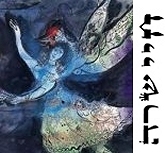
11.17.24 (Cheshvan 16, 5785) Shavuah tov, chaverim. Our Torah reading for last week (i.e., parashat Vayera) told how God was faithful to Abraham and Sarah by miraculously giving them a son (Isaac) in their old age. Nonetheless, Abraham faced his greatest test of all by being asked to offer up his promised child as a sacrifice on Mount Moriah, the place of the future Temple. On account of his willingness to obey, God blessed Abraham and promised that He would multiply Abraham's offspring as the stars of heaven and that in his seed (singular) all the nations of the earth would be blessed.
This week's Torah portion is called Chayei Sarah (חיי שרה), the "life of Sarah," though it begins (paradoxically) with the account of her death, and it tells how the first great matriarch of the Jewish people was buried in the Cave of Machpelah in Hebron, a burial site which Abraham had purchased from Ephron the Hittite (Gen. 23:1-20). Since the account of Sarah's death is given just after the account of the near-sacrifice of Isaac (i.e., the Akedah), some of the sages link the events together, suggesting that the shock of the near loss of her beloved son at the hand of her husband was just too much for her to bear.
Hebrew Lesson
Genesis 23:1a Hebrew Reading (click):
After Sarah was buried in Hebron, Abraham sought a wife for his son by commissioning his faithful servant Eliezer (whom Abraham had once thought would be his heir), to go among his relatives living in Mesopotamia to seek a bride for Isaac. Eliezer (i.e., אֱלִיעֶזֶר, lit., "My God will help") then set out on the 550 mile journey to Haran (also called the City of Nahor and the place where Abraham's father died), taking ten camels laden with gifts in search of a suitable woman. In answer to his prayer, as soon as Eliezer reached the city of Nahor he encountered Abraham's grand niece Rebekah drawing water at a well, where she graciously provided water for him and for his ten camels, thereby confirming that she was God's choice for Isaac.
Faith and Surrender...

The following is related to our Torah reading for this Shabbat, parashat Vayera...
11.16.24 (Cheshvan 15, 5785) Have you ever met a truly "surrendered" person? Someone who is completely yielded to God, happily unconcerned with their own will, delivered from all earthly fears and fully at peace with whatever happens?
I once knew such as person years ago when I was attending seminary. He was a missionary to Japan, soft-spoken, gentle, and fully awake to God's presence. You could sense his surrender in the little things, the petty inconveniences that come up -- not so much by what he said but by what he let pass him by. To an outsider he might mistakenly have been construed to be a shy or passive person, or a perhaps a man of Stoic resignation, but going deeper than superficialities it revealed that he was alive and awake to God's presence -- not in some self-serving way -- but the depths of quietness and serenity that attended his spirit.
Now let's consider the patriarch Abraham, surely the ideal example of a surrendered soul in all the Torah. Behold the man. Imagine the depths of his surrender! What was his secret of his strength? Everything he wanted in his life was embodied in his son who lay bound upon the altar. Isaac was Abraham's world. His dream. His hope. His religion. All of the promises of God were bound up in Isaac as the leather ropes that tightly bound his hands and feet. Abraham's life flashed before his eyes. His mind was spinning as he remembered the starry night sky and the promise, "So shall your seed be...."
It was all so incredible, impossible, and surreal. And yet it all led to this moment. The call to leave everything behind and go to an unknown land; the various tests he faced over the long years; the moments of unspeakable joy, of seeing God, hearing his promises, his laughter, his song; and moments of sorrow, loss, and fear. After it was all said and done, there was nothing left of him other than who he was in relation to the Lord, and nothing else -- not even his dearest hope and dream - mattered in comparison.
There was no fear in his heart as Abraham lifted up the knife that would slay all his worldly hope and dreams, no fear, because he had seen the LORD, he was already as one dead yet made alive in the presence of God, and that presence spoke a deeper truth than whatever worldly any circumstance could say (Rev. 1:17). Abraham "hoped against hope" because the deeper hope was beyond any worldly hope that might have been imagined. Abraham was lifted up into the countless stars again, in another realm, beyond the pale of whatever might be seen, and it was that vision that gave him courage to believe despite the apparent insanity of the situation.
But let's not forget the great surrender of Isaac, too, who willingly allowed himself to be bound by his father, their "hineini" love uniting them in God's presence. The midrash portrays Isaac asking his father to tighten the bonds that held him as their eyes locked in love for one another. The tears of Abraham fell from his eyes into Isaac's eyes; their well of tears filled by an unspeakable yearning.
We perhaps tend to pass by the story too quickly and "read back into" what had happened, how the Angel of the LORD intervened to stop the sacrifice and to provide the lamb to take Isaac's place, and we are surely amazed that God provided the lamb which Abraham lifted up for a burnt offering "in place of" his son (Gen. 22:13). It was then that Abraham was rejoined with "resurrected" Isaac, as if receiving him back from the dead (Heb. 11:17-19). Recall that Abraham reflected and called the place of sacrifice "Adonai Yireh" (יְהוָה יִרְאֶה), "the LORD who sees," or "the LORD who provides," and Moses commented that it is so called to this day: "In the mountain of the LORD it shall be provided" (Gen. 22:14), prophetically referring to the place where Yeshua was lifted up as the true Lamb of God.
This is of course the "gospel" of Moses, and we take note that Abraham offered there his "only begotten" son, the one whom he especially loved, for the sacrifice, and we further note that this is the first place in the Torah where the word "love" (אהבה), meaning "he will give" (א + הב), appears. There is a great peace when we let go of everything in our hearts (everything) and give ours lives over to the care of God.
But is it possible for mere mortals, those frail human beings among us who are filled with fear, doubt, and shame, to do such things? Some people trivialize the idea by thinking of surrender as a sort of "diet," or the self-abnegation of practiced denial. And while it's true there is a sort of denial involved in true surrender, it is not the self-denial of a Hindu yogi nor the resolve of a Stoic philosopher who gives up all worldly desire in order to find the courage to face one's fate.
Surrender is a paradoxical sort of "work" in that it is accomplished in the repose of trust, not in the strivings of the physical body. It is believing that whatever you really are is a witness to something Wonderful, beyond your understanding, and utterly worthy of your full attention. It is the "shalom from above," given freely as you look away from yourself to encounter something so strikingly beautiful and glorious that everything else becomes as "dust and ashes."
But what is surrender in practical terms? Is it an attitude of mind and heart that gives up whatever it may otherwise want? Well that may be a "negative" aspect or side of surrender, the "giving up" or "letting go" side, but full surrender goes beyond the idea of self-denial to enter into the truth of God's presence, and that marks the resurrection of heart to newness of life. So on the other side of denial, death, and harrowing loss is acceptance, life, and unspeakably great gain!
Surrender is a letting go of our illusions, our worldly desires, our attachments, and indeed whatever and however we may regard ourselves, in order to know God's love, strength, and sufficiency. It is really a form of "teshuvah," turning away from the darkness to the light, forgetting yourself in order to know yourself in relation to God's blessing and presence. Such surrender releases you from all manner of worldly fear as you are "transported" into the realm of divine beauty and truth. You are reborn by God's Spirit - the breath and atmosphere of God's love and grace suffuse your heart and inner life.
If you find yourself "stuck" to your attachments, whether they are ideals or dreams or even your vision of what God is like, you can pray and ask the Holy Spirit to release you from what holds your heart captive. When by miracle you surrender your will to God, letting God to be God, you will sense perfect peace that passes all your understanding. Amen, and may the LORD help us all find ourselves in the truth of his heart and will for whatever we may be.
Hebrew Lesson
Psalm 73:25 reading (click for audio):
A Quick Postscript:
We all struggle with surrendering fully to God, and if it were so easy Abraham would be otherwise unremarkable. Yeshua regularly admonished his disciples to have faith, and sometimes chided them for their unbelief: "Why are you fearful, O ye of little faith?" "O you of little faith, why did you doubt?" (Matt. 8:26; Matt. 14:31, etc.). This is a lesson of great contrast. Abraham's faith was so steady that he obeyed the call of God even when it seemed to make no sense... "He staggered not at the promise of God through unbelief; but was strong in faith, giving glory to God, being fully persuaded that, what he had promised, he was able also to perform" (Rom. 4:20-21). For this reason the Scriptures extol Abraham by calling him "the Father of the faithful" (Rom. 4:16-18).
The Work of Faith...
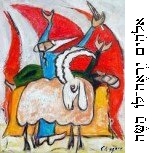
11.15.24 (Cheshvan 14, 5785) Our Torah for this Shabbat (i.e., Vayera) gives the account of the terrible test given to Abraham when God asked him to offer up his son as a sacrifice (see Gen. 22). The apostle James later said that Abraham was "justified by works when he offered his son Isaac upon the altar" (James 2:21), whereas the apostle Paul seemed to say just the opposite, that Abraham was not justified by works (see Rom. 4:1-3). So is there a contradiction here in our Bibles regarding the idea of "justification"?
To answer this first understand that when James said that Abraham was justified "by works" he was referring to the work of faith and certainly not to the works of the law (מַעֲשֵׂי הַתּוֹרָה), since the Torah explicitly prohibited human sacrifice (Gen. 9:5), and furthermore the Angel of the LORD restrained Abraham's hand during the great test of faith (Gen. 22:12) thereby indicating that it was not God's will (i.e., Torah). On the other hand, the apostle Paul's seemingly contrary statement that Abraham was not justified by works refers to Abraham's unwavering trust in God's promise that his descendants would be as numerous as the stars in the heavens (Gen. 15:1-6). There is no real contradiction, then, since the two apostles were referring to two different episodes in their discussion of justification. Faith and works are two sides of the same coin: true faith will show up in your life and character. As Yeshua said, "This is the work of God, that you believe in the One whom He has sent" (John 6:29).
The life of faith is inherently paradoxical, as Kierkegaard noted: "Ethically speaking, what Abraham planned to do was to murder Isaac; religiously, however, he was willing to sacrifice Isaac. In this contradiction lies the very anguish that can indeed make anyone sleepless. And yet without that anguish Abraham is not the one he is. Neither would faith be what it is." Although Abraham understood that God must be obeyed, he also understood that human sacrifice was immoral, and hence his struggle represented the collision between the imperative of reason and the imperative of faith. Choosing to heed the voice of reason (i.e., the "ethical," the "universal") over the personal voice of God created a state of "fear and trembling" and a sense of being unable to communicate his passion and mission to others.
"God cannot stand good works in the sense of earning merit. Yet good works are required. They shall be and yet shall not be. They are necessary and yet one ought humbly to ignore their significance or at least forget that they are supposed to be of any significance. Good works are like a child giving his parents a present, purchased, however, with what the child has received from his parents. All the pretentiousness which otherwise is associated with giving a present disappears when the child understands that he has received from his parents the gift which he gives to them." - Soren Kierkegaard (Fear and Trembling).
As Kierkegaard further commented: "Faith's conflict with the world is not a battle of thought with doubt, thought with thought. It is a battle of character. The person of faith is a person of character who does not insist upon comprehending everything. Now comes the conflict. The world insists that to believe what you cannot comprehend is not only blind obedience but obscurantism, stupidity, and so on. The world wants to alarm the believer against such foolishness. This is precisely why faith is a task for the person of character."
Hebrew Lesson
Isaiah 26:12 reading (click for audio):
Note: In the Book of Hebrews we read: "By faith Abraham, when he was tested, offered up Isaac, and he who had received the promises was in the act of offering up his only son, of whom it was said, "Through Isaac shall your offspring be named." Abraham considered that God was able even to raise Isaac from the dead, from which, figuratively speaking, he did receive him back" (Heb. 11:17-19). The Greek text for "from which, figuratively speaking, he did receive him back" (i.e., ὅθεν αὐτὸν καὶ ἐν παραβολῇ ἐκομίσατο; Heb. 11:19b) seems to suggest Abraham believed (beforehand) that God would do a miracle and bring his son back from the dead after being sacrificed, though, of course, saying this does not mean it was therefore "easier" for him to go through with the sacrifice or that it required anything less than a complete surrender of his will to do God's will... The key phrase in 11:19b, however, has to do with receiving Isaac back, and the language here means that he did receive him back from the dead "symbolically" or "figuratively" (i.e., as a "parable").
 |
The Sins of Sodom...

11.15.24 (Cheshvan 14, 5785) From our Torah reading this week (i.e., parashat Vayera) we read: "And the LORD said, 'The outcry of Sodom and Gomorrah is indeed great, and their sin is exceedingly grave...'" (Gen. 18:20). But what was the grave sin of Sodom and Gomorrah? Why did God destroy the two cities? Was it because the people there refused to show hospitality to the angelic visitors (as claimed by some), or was it because of some ongoing sin of the people?
Though the sin of Sodom undoubtedly included practices of sexual perversion (called "strange flesh" (σαρκὸς ἑτέρας) in the Book of Jude), such behavior was symptomatic of a nihilistic culture that glorified violence, despised moral authority, perverted spiritual truth, and condoned the exploitation of others. Throughout the Scriptures "Sodom" symbolically represents gross immorality, depravity, and inevitable judgment from heaven. For example, the prophet Ezekiel later wrote of Judah: "Behold, this was the guilt of your sister Sodom: she and her daughters had arrogance, abundant food, and careless ease, but she did not help the poor and needy. Thus they were haughty and committed abomination (תּוֹעֵבָה) before me; therefore I removed them when I saw it" (Ezek. 16:49-50). The New Testament refers to the fate of Sodom as "a fearful example of the everlasting fire of retribution" (Jude 1:7) -- the destructive result of spiritual anarchy, lawlessness, perversion, and the violence of indifference (2 Pet. 2:6-10).
There is real hope for those who seek to escape from the wrath to come by turning to God and trusting in his healing power of salvation, though it is only a "remnant" that will genuinely seek such deliverance (Matt. 7:14). Speaking of the final salvation of Israel, the Apostle Paul quotes Isaiah: "If the LORD of Hosts hadn't left us a few survivors, we'd be as desolate as Sodom, doomed just like Gomorrah" (Isa 1:9; Rom. 9:29).
In this connection it should be noted that the word "sodomy" involves any form of violence, perversion, exploitation, or lawless expression of sexuality regardless of gender... In general, it is more helpful to think of it as a code word for egregious sin, "in-your-face" spite toward God, and defiant immorality that celebrates spiritual anarchy, moral nihilism, and death... Adultery, fornication, sexual perversions, viewing pornography (i.e., the lust of the eyes), covetousness, gluttony, arrogance (idolatry), unbridled anger (rage), sloth, worshiping the values and ideologies of this world (i.e., political activism, godless scientism, the world's value system), and so on, all may be called "sodomy." Whenever we consider such things, it is better to look at how we are healed rather than what makes us sick.... The answer to the trauma of a sinful heart is to turn to God and ask for deliverance in the name of Yeshua.
Hebrew Lesson
Jeremiah 7:14 Reading (click):
The world and its "group-think" always calls for the abolition of the individual conscience. Like the people of ancient Sodom that repudiated God's moral authority so that they would be "free" to their indulge their selfish desires and "autonomy," so the world system today repudiates a person of real conviction and conscience. Indeed, the only thing regarded as "intolerable" in the devil's world is the objection that people have the supposed "liberty" to sin in whatever way they please. This godlessness is "anathema" to one who truly fears God, of course, since tolerating sin in a world ripe for judgment is a cowardly form of "collaboration" with the enemy (James 4:4). "Woe to those who call evil good and good evil, who put darkness for light and light for darkness, who put bitter for sweet and sweet for bitter! Woe to those who are wise in their own eyes, and who are shrewd in their own sight!" (Isa. 5:20-21).
The "original sin," that is, eating from the Tree of Knowledge of good and evil, meant that man sought to transcend God's will to determine what is valuable, true, beautiful, and so on. Man became autonomous, "the measure of all things." Such was the "logical" method of the German idealism of Kant and Hegel, which led to way for Karl Marx, Friedrich Nietzsche, and Adolf Hitler (and some present day politicians) to unleash their nightmares upon the earth. Understand that the deep untruth that lies behind cynical "postmodernism" expresses little more than the godless desire to control the world... Today, more than ever before, the world is like "Sodom," and therefore ripe for judgment from heaven.
And the judgment of God indeed came upon the moral anarchy of that realm... After the angels rescued Lot (and his immediate family), we read "then the LORD rained on Sodom and Gomorrah sulfur and fire from the LORD out of heaven. And he overthrew those cities, and all the valley, and all the inhabitants of the cities, and whatever grew on the ground" (Gen. 19:24-25). The sages note the word translated "overthrew" is vayahafokh (וַיַּהֲפךְ), which means "overturned," suggesting that besides the fire and brimstone that rained down from the sky, an enormous earthquake engulfed the plain, forming a crater filled with salt that became known as the "Dead Sea" (ים המלח).
For more on this see, "The Sins of Sodom: Further thoughts on parashat Vayera."
God's Sovereign Love...
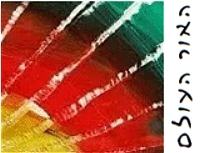
"He is the Almighty, the Possessor of all power in heaven and earth, so that none can defeat His counsels, thwart His purpose, or resist His will" (Psalm 115:3). - A.W. Pink
11.15.24 (Cheshvan 14, 5785) The Scriptures teach that in Messiah "we have obtained an inheritance, having been predestined (προορισθέντες) according to the purpose of the One who works all things according to the counsel of his will" (Eph. 1:11), which is to say that salvation is a gift from God (יְשׁוּעָתָה לַיהוָה) and not the result of our own efforts (Eph. 2:8-9; 2 Tim. 1:9; Titus 3:5). The LORD said to Moses, "I will be gracious to whom I will be gracious, and I will show mercy to whom I will show mercy" (Exod. 33:19), a phrase the Apostle Paul quoted from Torah when he said: "So then it (i.e., salvation) depends not on human will or exertion, but on God, who has mercy" (Rom. 9:16, John 1:13). In light of these things, examine your heart. Does this offend you? Does it bother you to think that you are essentially helpless to draw near to God by your own best efforts? "It is the Spirit that gives life; the flesh profits nothing" (John 6:63). Our Lord said that no one can come to Him - and therefore to the truth of reality apart from divine intervention: "No one is able to come to me unless he is "dragged away" (ἑλκύσῃ) by the Father" (John 6:44; Matt. 16:17).
How could it be any other way? Could we make a "stairway to heaven" to find God? No, God's love reaches out to us, seizes us, takes us captive, and then leads us to the Savior. The LORD chooses each one who are his; they are called the "elect" (ἐκλεκτός), and their faith is always a response (i.e., "teshuvah") to God's intervention. Now this may seem offensive because it seems to suggest that God chooses some people but not others, but that misses the point. You are given the real choice to believe in Yeshua to find life, and you are promised that whoever believes in Messiah will never be put to shame (Rom. 9:33; John 6:37; John 5:24, etc.). "Whoever will believe" means just that, and all who are invited may indeed come (2 Pet. 3:9; 1 Tim. 2:4; Ezek. 18:23). Therefore the Spirit of God cries out: "Seek the LORD while he may be found; call upon him while he is near; let the wicked forsake his way, and the unrighteous man his thoughts; let him return to the LORD, that he may have compassion on him, and to our God, for he will abundantly pardon" (Isa. 55:6-7).
Our great Savior calls out to all who are willing to hear, "Come to me, all who labor and are heavy laden, and I will give you rest. Take my yoke upon you, and learn from me, for I am gentle and lowly in heart, and you will find rest for your souls. For my yoke is easy, and my burden is light" (Matt. 10:28-30). Though it is a mystery, we are warned to "work out" (κατεργάζεσθε) our own salvation with fear and trembling, for it is God who "works in you" (ὁ ἐνεργῶν ἐν ὑμῖν) both "to will and to work" (τὸ θέλειν καὶ τὸ ἐνεργεῖν) his good pleasure" (Phil. 2:12-13).
Hebrew Lesson
Exodus 33:19b Hebrew reading:
The gospel is "the power of God for salvation" (δύναμις γὰρ θεοῦ ἐστιν εἰς σωτηρίαν) to everyone who believes, to the Jew first and also to the Greek" (Rom. 1:16). It is a miracle of being in a right relationship with God. We are pursued by his love, and he haunts us until we surrender to his will... During the High Holidays we read from the Book of Jonah, which is appropriate because like Jonah, we first must be "swallowed up" in the consciousness of our own helplessness before we realize we are undone, and that we are without remedy apart from God's gracious intervention and deliverance. We start there - in the "belly of the fish" - and later we are resurrected to go forth by God's mercy and grace. As we look to Yeshua, as we lean on him, God reveals more of himself to us. He gives us the grace and strength we need; he is always enough...
Abraham's Three Visitors...
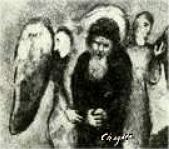
11.15.24 (Cheshvan 14, 5785) Shalom dear chaverim. Our Torah portion for this week, parashat Vayera, begins: וַיֵּרָא אֵלָיו יהוה / Vayera elav Adonai: "and the LORD appeared to him (i.e., Abraham) by the oak trees of Mamre, as he sat at the door of his tent in the heat of the day" (Gen 18:1). The midrash Bereshit Rabbah colorfully states that the phrase "by the oak trees of Mamre" (בְּאֵלנֵי מַמְרֵא) could be read as "in the oak trees," suggesting that God manifested Himself "as a tree," perhaps to recall Abraham's arrival into the land when he camped before a "teaching tree" (אֵלוֹן מוֹרֶה) in Shechem (see Gen. 12:6).
Rashi says it was the third day after Abraham's brit millah (i.e., circumcision) and God came (in a vision) to inquire as to his friend's welfare (this is regarded as a divine example of bikkur cholim (בִּקּוּר חוֹלִים), "visiting the sick"). During the vision, Abraham suddenly saw "three men" (שְׁלשָׁה אֲנָשִׁים) standing "above him." Who were these strangers? According to the Jewish sages, they were the archangels Michael, Gabriel, and Raphael disguised as Arab wayfarers. Each angel had a distinct mission. Michael came to announce that Sarah would give birth to a son; Raphael came to heal Abraham from his circumcision; and Gabriel came to overthrow Sodom (Bava Metzia 86b). After Abraham made a hasty (but doubtlessly sumptuous meal for his guests (and note, despite what the rabbis have said, meat and dairy surely may be eaten together, as it is written: "And he (Abraham) took butter and milk and the meat (חֶמְאָה וְחָלָב וּבֶן־הַבָּקָר) he prepared and set it before them (the angels, including the Angel of the LORD) and they ate" (Gen. 18:8). Yum! kosher cheeseburgers!).
According to Jewish tradition, when Abraham said, "My Lord (אֲדנָי), if I have found favor in your sight, do not pass by your servant" (Gen. 18:3), he was not speaking to the three visitors (as might be inferred from casual reading of the text) but rather was addressing the LORD Himself. (As a point of Hebrew grammar, Rambam notes that the Hebrew vocalization of the word Adonai (אֲדנָי) with the qamets vowel refers to God; whereas if it's vocalized with a patach (i.e., אֲדנַי) it refers to others, i.e., "sirs.") In other words, when Abraham saw the three strangers, he is said to have interrupted the vision of God and asked permission to take leave of the LORD: "My Lord, if you would, please do not go away from your servant." This interpretation has led to the Talmud's statement that showing hospitality to strangers (i.e., hachnasat orechim / הַכְנָסַת אוֹרְחִים) is more important than even welcoming the Shekhinah (Shabbat 127a). On the other hand, Rashi notes that the literal flow of the narrative suggests that Abraham was addressing the angels by requesting that they (plural) stay. In this case, the verse would be rendered, "My lords (אֲדנָי), if I have found favor in your sight, do not pass by your servant" (Gen. 18:3).
The most accepted Christian interpretation has been that the chief Angel was a pre-incarnate appearance of Yeshua the Messiah (i.e., a "theophany"). Understood in this light, the first verse of the portion, "and the LORD appeared to him" is immediately connected with the vision of the three archangels. In other words, the LORD appeared to Abraham as one of these angels, namely, the Angel of the LORD (מַלְאַךְ יהוה) accompanied with two others (Michael and Gabriel). This explains why it is written that the LORD (יהוה) stayed back with Abraham after the other two angels left for Sodom (Gen. 18:22). (Note that the patriarch Jacob later referred to the LORD (יהוה) as מַּלְאָךְ הַגּאֵל אתִי מִכָּל־רָע / "the Angel who redeemed me from all evil" (Gen. 48:16), just as he earlier had wrestled with a "Man" whom he later identified as God (Gen. 32:30)).
The dialog gets somewhat confusing, however, since it is unclear at times just who is speaking in the narrative. For instance, after graciously providing the three guests with a meal (meat and dairy!), the visitors (plural) asked where Sarah was (וַיּאמְרוּ אֵלָיו / "they asked him..."), but then then the Angel of the LORD said, "I will certainly return to you next year, and your wife Sarah shall have a son" (Gen. 18:10). Most of the Jewish sages (i.e., Rashi, Maimonides, etc.) understand this to be the Shekhinah "Voice of God" that was interjected into the conversation, though the text suggests this came directly from one of the angels, not from a "disembodied Voice" among the oakes of Mamre. At any rate, the purpose of the question was to confirm God's promise (originally given to Abraham in Gen. 17:16) to Sarah herself.... When Sarah heard this, she laughed within herself (lit, "at her insides") and thought, "Now that I am withered, am I to have enjoyment, my husband being so old?" (Gen. 18:12).
When the LORD (יהוה) repeated Sarah's inward thoughts to the others present, however, He omitted some of her words so that Abraham would not feel ashamed: "Why did Sarah laugh, saying, 'Shall I indeed bear a child, now that I am old?' Is anything too wonderful for the LORD?" (Gen. 18:13). The midrash says that the LORD overlooked her reference to Abraham being "too old" for the sake of shalom bayit (family harmony) and to refrain from lashon hara (evil speech). Perhaps some of this exchange was meant to reprove Sarah for disbelieving her husband's faith about a having future son. The sages note that when Abraham first heard the news about an heir "from his own loins," he laughed joyfully, but Sarah later laughed derisively... The Angel continued: "At the appointed time I will return to you (אָשׁוּב אֵלֶיךָ), about this time next year, and Sarah shall have a son" (Gen. 18:14). It should be noted here how the miraculous conception of Yitzchak - the promised "only begotten" son (בֵּן יָחִיד) who was to be sacrificed at Moriah - was meant to foreshadow the miraculous conception of Yeshua and His later sacrifice for our sins....
After reaffirming the promise of the coming heir to Sarah, the angels set out to finish their mission. Abraham escorted them on their way. The chief Angel (i.e., the Angel of the LORD) then rhetorically asked his angelic companions, "Should I hide from Abraham what I am about to do (i.e., go to Sodom), seeing that Abraham shall surely become a great and mighty nation, and all the nations of the earth shall be blessed in him? For I know him (כִּי יְדַעְתִּיו), that he will command his children and his household after him, and they shall keep the way of the LORD (דֶּרֶךְ יהוה), to do charity and justice (לַעֲשׂוֹת צְדָקָה וּמִשְׁפָּט); that the LORD may bring upon Abraham that which he has spoken of him" (Gen. 18:17-19). Note that this is the only place in Torah where the "way of the LORD" (i.e., derekh Adonai) is explicitly defined.
Abraham was destined to be the father of a multitude of nations (אַב־הֲמוֹן גּוֹיִם) - and the land promised to him included the cities of Sodom and Gomorrah and the adjacent plain. Moreover his nephew Lot dwelt in Sodom with his family. The LORD went on to say that "because the outcry against Sodom and Gomorrah is great and their sin is very grave, I will go down to see whether they have done altogether according to the outcry that has come to me. And if not, I will know." The "outcry" has been interpreted to mean the cries caused by violence, and in particular, of the brutal murder of a young girl who dared to help a poor man by giving him bread. According to midrash, it was this girl's cry that "broke through" to heaven and moved the LORD to investigate the matter personally. The LORD's "going down to see" has been interpreted to mean descending from the attribute of mercy to that of judgment. The midrash (citing Ezekiel 16:49) states that the sin of Sodom was primarily because of their pride and their refusal to give charity.
According to midrash, Abraham was perplexed about the generation of the Flood and thought it was impossible that there were not ten or twenty righteous people on the earth at that time. Because of this, he felt compelled to question and to negotiate with the LORD. Would God destroy the righteous along with the wicked? Perhaps Noah thought the decree of the world's destruction was irreversible, but in this case, God told Abraham that His verdict was not sealed, and that emboldened him to intercede on behalf of Sodom. Abraham's chesed (חֶסֶד), his goodness and compassion, prompted him to "draw near" to the LORD as an advocate on behalf of others. Would God's anger cause Him to indiscriminately stamp out the righteous along with the wicked? May it not be so! The wrath of God is the manifestation of His attribute of justice, but what about his attribute of mercy? Surely the Judge of all the earth will do what is right (הֲשֹׁפֵט כָּל־הָאָרֶץ לֹא יַעֲשֶׂה מִשְׁפָּט); surely the reputation of the LORD was at stake!
Abraham began his plea bargaining with 50 righteous (10 for each of the surrounding cities) and went down to 10. Some of the sages say that he did not fulfill his mission since he did not beg that no matter what the circumstance, Sodom should not be destroyed. As it is written in Proverbs: צַדִּיק יְסוֹד עוֹלָם / "The righteous (even one) is an everlasting foundation" (Prov. 10:25). Moses had interceded on behalf of Israel after the sin of the Golden Calf, even asking God to take his life for the sake of God's pardon of his people. Likewise Yeshua went to Cross and died for the sinful and wicked. Abraham appealed to God to spare the righteous. After learning there were none, he no longer negotiated on their behalf.... A midrash, however, states that Abraham did not pray for fewer than 10 righteous men because he believed that if there were less than this, God would destroy the entire world (as He did with Noach and his family, which totaled eight souls). Ultimately, however, God saved Lot and his daughters on the merit of Abraham's intercession ("God remembered Abraham" - Gen. 19:29). In other words, though God might judge the world, He always makes a way of escape for those who are righteous.
Hebrew Lesson
Gen. 18:25b reading (click):
Love's Reason for Being...
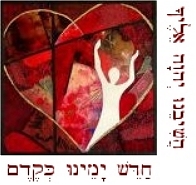
The following might seem a bit "out there" in terms of ideality, but gather what you can glean and, with God's help, may you apply its message to your own inner life...
11.14.24 (Cheshvan 13, 5785) During an intense bout of sickness that nearly took her life, Julian of Norwich said that God showed her a "little secret" about an ordinary hazelnut. As she considered the vision of the hazelnut, she wondered, "What may this be?" and God answered her heart's pondering: "It is all that is made..."
Julian then realized that the secret of the thing was not found in what it was, but in how it had its being. "In this little thing I saw three properties. The first is that God made it, the second is that God loves it, and the third, that God keeps it." She then reasoned that if something exists, it is because God loves it into being, and therefore everything that exists is what it is because of the love of God who sustains and upholds it. What makes something real is God's love, for love is the ground and context of all that exists.
This simple yet profound thought applies to our own lives as well. "What is he indeed that is Maker and Lover and Keeper?" We can only know who we really are in God's love for our souls. And we see God's love for us in the passion of the Lord Yeshua who clothed himself in our likeness to touch and to mediate the cry of our hearts before the Father. Amen, Yeshua is the one who brings us into God's heart, "Between God and the soul there is no between."
"I saw that He is to us everything that is good: God is our clothing that wraps, clasps and encloses us so as to never leave us, being to us everything that is good." Amen. God loves us with an everlasting love; his love draws us unto his heart.
Hebrew Lesson
Deut 33:27a reading (click for audio):
Shepherd of your soul...

11.14.24 (Cheshvan 13, 5785) Whenever you feel oppressed by sorrows, heartache, or fears, affirm with solemn assurance: "The Lord cares for me." Cast your burden upon Him and he will hold you up. Refuse to stagger beneath the weight of earthly fears...
God cares for you. This is the message of the gospel, after all; this is the meaning of the cross itself: God Himself cares for you...
Consider the one who personally bore your very sins and terribly suffered in anguish for you to be fully forgiven and accepted by Heaven: This beloved one will never forsake you, but indeed forever lives to make intercession for you (Heb. 7:25). Be bold, therefore, to avail yourself before the throne of mercy, where we are given grace to help in time of need.
The Lord has not forgotten you; he will never leave you nor forsake you. He who feeds the birds of the air and tends the lilies of the field will surely provide for your needs. All who belong to him are forever made secure by the indomitable glory of his perfect love.
Let us then resist the whispers of despair. Affirm the greatness of God who watches over your way as the Good Shepherd of your very soul. Even if you are in distress, affirm the greatness of God and confess the truth of His love for you. Overlook the present moment to find refuge in his promise.Trust him to bind up your wounds and heal your broken heart. God is your strength and song! Do not countenance any thought that his grace is not present for your need and troubles. God is forever faithful; his promises are sure; the one who has begun a good work in you will perfect it: press on in confidence of your Shepherd's care...
Hebrew Lesson
Psalm 23:1-3 reading (click):
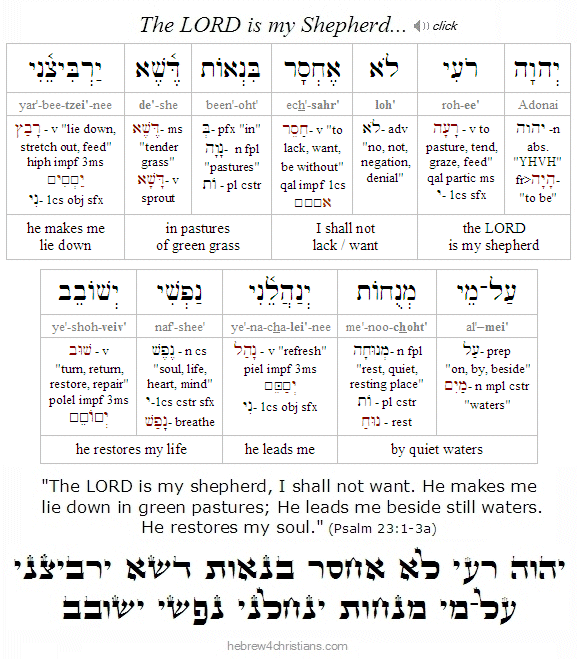 |
The Heart of Sacrifice...

Undoubtedly Abraham's most dramatic test revealed the heart of a father willing to give up his beloved son, and the heart of the beloved son willing to be sacrificed on behalf of his father's will... Together they walked on, united in resolve and one in their passion.
11.13.24 (Cheshvan 12, 5785) "And Abraham took the wood of the burnt offering and laid it on Isaac his son. And he took in his hand the fire and the knife. So they went both of them together" (Gen. 22:6). Isaac was about 37 years old at this time and needed to understand what was being asked of him: "And Isaac said to his father Abraham, "My father!" And he said, "Here am I, my son." And he said, "Behold, the fire and the wood, but where is the lamb for a burnt offering?" (Gen. 22:7). This is the first word of dialog recorded over the three day journey... It is hard to imagine Isaac's pathos during this exchange. Abraham replied, "God will provide for himself the lamb for a burnt offering, my son." So they went both of them together (Gen. 22:8). Notice that the Hebrew could be read: "God will provide for himself the lamb for the burnt offering -- my son!" (ירְאֶה־לּוֹ הַשֶּׂה לְעלָה בְּנִי) - making it plain that Isaac would be offered upon the altar. The Torah then repeats the phrase, "and they both walked on together," indicating that Isaac had accepted his sacrificial death in obedience to his father's will...
"And when they came to the place of which God had told him, Abraham built the altar there and laid the wood in order and bound Isaac his son (וַיַּעֲקד אֶת־יִצְחָק בְּנוֹ) and laid him on the altar, on top of the wood" (Gen. 22:9). According to the Talmud, Isaac asked his father to make the knots on his hands and feet tighter - not out of fear that he would change his mind and begin to resist - but in order to encourage his father to offer the sacrifice properly (Bereshit Rabbah 56:8). Like the Suffering Servant who would come after him, Isaac "set his face like a flint" to fulfill God's will (Isa. 50:7).
Hebrew Lesson
Genesis 22:8 reading (click for audio):
Isaac kept his eyes directed toward heaven as he lay tightly bound and motionless upon the altar. He awaited the final blow and wanted it to fall with trust and obedience within his heart. It was to be a shared sacrifice between the beloved son and his father. Finally "Abraham stretched out (שׁלח) his hand and took the knife to slaughter (i.e., לִשְׁחט, from shechitah) his son" (Gen. 22:10). The Talmud says that when Abraham "stretched out" his hand, he briefly looked at the knife to determine if it was ritually fit, and this delay was the precise moment when the Angel of the LORD (מַלְאַךְ יהוה) called out to him from heaven and said, "Abraham, Abraham!" (Gen. 22:11). (Note the repetition of the name "Abraham" during this second call.) According to various midrashim, when Abraham put his knife to his son's neck, Isaac's soul departed from him, but it returned when the Angel of the LORD said, "Do not lay your hand on the boy or do anything to him, for now I know that you fear God, seeing you have not withheld your son, your only son, from me" (Gen. 22:12). Abraham then immediately released Isaac and recited the blessing, "Blessed are You, LORD, who revives the dead" (בָּרוּךְ אַתָּה יהוה מְחַיֶּה הַמֵּתִים).
"I believe in You, O Holy One, though at times there no longer seems any reason for believing..." Here is Abraham, who counted the stars in hope, who trusted God for an heir, a promised son - and from this son another, and from that another, and another, until he envisioned his descendants "as the dust of earth" (Gen. 13:16; 15:5-6), and yet here is Abraham lifting up his knife to sacrifice his son, his beloved child, his promise, his future, his dream. Remember that Abraham did not know the end of the story before it began, and therefore his faith attested: "Though he slay me, I will trust in him."
Some people tend to "explain away" the passion of Abraham and Isaac by quoting the New Testament verse: "He [Abraham] considered that God was able even to raise him [Isaac] from the dead, from which, figuratively speaking, he did receive him back" (Heb. 11:19) -- as if this would make the sacrificial act any easier! Again we must bear in mind that neither Abraham nor Isaac knew "the end of the story" before they chose to obey God. As I've mentioned before, simply "knowing about" God is not the same thing as personally trusting Him with your life... This is the distinction between emunah (אֱמוּנָה) and bittachon (בִּטָּחוֹן). Simply knowing about God can lead to a sense of "distance," to theological abstractions, to dogmas and creedal formulas. Rabbi Bechaya put the distinction this way: "Everyone who trusts has faith, but not everyone with faith trusts." Bittachon is an intuitive awareness of the personal love of God for your life, coupled with complete trust that He cares for you (Rom. 8:28). It is an expectation that the love of God is for you, too, despite the test.
For more on this crucial subject, see:
The Call from Above...
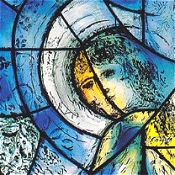
"I have come home at last! This is my real country! I belong here. This is the land I have been looking for all my life, though I never knew it till now..." - C.S. Lewis
11.13.24 (Cheshvan 12, 5785) It is said that the tzaddikim (righteous ones) are "doubly called" by God: "Abraham, Abraham" (Gen. 22:11), "Jacob, Jacob" (Gen. 46:2), "Moses, Moses" (Exod. 3:4), "Samuel, Samuel" (1 Sam. 3:10), "Saul, Saul" (Acts 9:4), and so on, to indicate that the LORD calls to both the soul in this world but also to the soul in heaven. When God told Abram to "get out of your land," he called him to focus on heavenly places to find his identity there. "Seek ye first the kingdom of God..." (Matt. 6:33). Thus David says, "I shall walk before the LORD in the land of the living" (Psalm 116:9), which means all his deeds would be done for the sake of heaven. The earth then becomes the "land of the living," or "the land that I will show you," as Abram was told (Gen. 12:1). Likewise, followers of Yeshua no longer find their identity in this world but rather through their spiritual union with the resurrected LORD (Gal. 2:20; 6:14; Eph. 1:3; 2:6)... Therefore we are told to "seek the things that are above (τὰ ἄνω ζητεῖτε) where the Messiah is seated at the right hand of God; focus your thoughts on the things above - not on things here on earth - for you have died, and your life has been hidden (κέκρυπται) with Messiah in God. Then when the Messiah, who is your life, appears, you too will appear with him in glory" (Col. 3:1-4).
So have you heard the "upward call of God in Yeshua the Messiah" (Phil. 3:14)? This "upward call" (τῆς ἄνω κλήσεως) is the invitation from above, the sound of the heavenly Voice, beckoning you to enter the "high country" of the world to come. As Yeshua said, "I am from above (ἐγὼ ἐκ τῶν ἄνω)." Our true identity is not found in this world and its vain philosophy. The cross brings these things to an end, as we "cross over" from the realm of the dead to the realm of life (Gal. 6:14). Can you say: "I have been crucified with Messiah. It is no longer I who live, but Messiah who lives in me. And the life I now live in the flesh I live by faith in the Son of God, who loved me and gave himself for me" (Gal. 2:20)?
The great commandment is always Shema - listen - and heed God's Voice: "And your ears shall hear a word behind you, saying, "This is the way, walk in it," when you turn to the right or when you turn to the left (Isa. 30:21). At any given moment of our day, then, we can attune ourselves to hear the "upward call" and come "boldly before the Throne of Grace" (Heb. 4:16). The world knows nothing of this realm and is enslaved by appearances and the delusions of this realm, olam hazeh. As Yeshua said, "To you it has been given to know the mysteries of the kingdom of heaven, but to them it has not been given" (Matt. 13:11). The Spirit always says, "Come, my people, enter your chambers, and shut your doors behind you" (Isa. 26:20). The LORD beckons: "Call to me and I will answer you, and will tell you great and hidden things that you have not known" (Jer. 33:3). And I looked, and behold, a door standing open in heaven! And the first voice, which I had heard speaking to me like a trumpet, said, "Come up here, and I will show you..." (Rev 4:1). The repeated or "double call" of heaven is the voice of love. The Beloved calls out to the beloved: "Arise, my love, my beautiful one, and come away" (Song 2:10, 2:13).
Hebrew Lesson
Isa. 30:21 reading (click for audio):
Healing the Divided Self...

11.12.24 (Cheshvan 11, 5785) There's an old story of the ancient philosopher Thales of Miletus who fell into a well while he was contemplating the heavenly bodies. All his grand intellectual aspirations resulted in a pratfall of humility. Kierkegaard likewise tells the tale of notable professor who, in the pontification of grand ideas of the cosmos, was oblivious to a drop of sweat that dangled from his nose. And there have been times in my life when I have meticulously studied Scripture and was so engrossed in theological matters that I somehow forgot that God was really present! In such moments, if I were suddenly interrupted, I would likely fall into a moment of peevishness and irritation. It would be comical if it weren't so sad and disappointing, and yet there is a message in the pain that should not be missed....
What do we do with our inconsistencies, those "lapses" of faith that expose what we are actually believing at the time? These are gaps or incongruities between what we might say is true and what our behavior otherwise reveals. For instance, we may say that we trust God with our lives, and aver that we believe that the Almighty works all things "together for our good," but inwardly we are filled with impatience, anxiety, and even dread. We are vaguely conscious of our dissimulation at times; we feel the tension that something is not right about us; we sense that we are not who we want to think we are. We may even suspect that we are inwardly divided, unstable, and afraid of what is hidden within our deepest hearts. But we tolerate our pretenses. We may ask ourselves "what would Jesus do?" and then find reasons to excuse ourselves; we may affirm: "When I am weak, then I am strong," and then "think twice" in fear over circumstances that we do not understand...
So how do we deal with this contradiction between what we are and what we ought to be? How do we reconcile what "is" with what "ought" to be? In other words, how do we "practice what we preach?" We all experience the "gap" between the real and the ideal not only in the social and political world around us, but also - and more profoundly - as duplicity within our own hearts. Alas, how can we no longer be "two-souled' or double minded? How can we be set free from the influence of the "shadow self"?
These are not questions about theology or doctrine, but about emotional and spiritual maturity, that is, they are matters of personal character. When Yeshua said that the truth would set you free, he didn't mean that you would find freedom by studying theology as much as by undergoing transformation of the heart. Theology is important, of course, but primarily as a means to the greater end of knowing God "bekhol levavkah," with all your heart, "bekhol nafshekha," with all your soul, and "bekhol me'odekha," with all your might. The essential reason for learning about God is be in heartfelt relationship with him, after all, and that will lead to transformation of the way we live - that is, how we think, talk, and make decisions. Spiritual truth is "existential." How we live life reveals what we truly believe.
When we are born from above, we are given a new nature, and the "seed" of eternal life is implanted within the soul. Heart transformation, however, comes through time, as a matter of undergoing "reproof" and "correction." This is sometimes called the process of "sanctification," which means walking uprightly in the way of holiness. The Lord is likened to a potter and we are as clay in his hand (Isa. 64:8). As I mentioned the other day, life on the "potter's wheel" can be messy, unsettling, and sometimes excruciatingly hard, but it is God's sovereign work to form your life according to his design and purposes....
God gives us the Scriptures to help us know his heart, as it is written: "All Scripture is inspired by God and profitable for doctrine, for reproof, for correction, and for training in righteousness" (2 Tim. 3:16). Here we note that the Hebrew word for "reproof" is tochechah (תּוֹכֵחָה), from a root (יכח) that means to test or judge the quality of something. God's reproof reveals the gap between our behavior and his standard of moral and spiritual truth, and when we are reproved by God, we understand how we fall short of his will. The Hebrew word for "correction" is mussar (מוּסָר), from a root (יָסַר) that means to chasten or punish, though always with the aim of developing godly character. God will sometimes allow us to undergo affliction, for instance, to teach us patience or humility. "Training in righteousness" means being instructed, as a child, in what is upright, true, and honorable.
Narrowing the gap between what we say that we believe and how we actually live is an ongoing process for us in this life. The world, the flesh, and the devil are forces that weigh us down to keep us profane and fallen, but God provides his Spirit and he instructs us to walk in the victory of faith. If we ignore or rationalize the gap, however, that is, if we allow the inner conflict and dissonance to become deeply rooted within our souls, we run the risk of becoming either self-deceived or embittered over the struggle. Bitterness is especially dangerous because it can result in abandoning the life of faith altogether (Heb. 12:15).
The test of faith is a matter of the heart more than the head. Things such as fear, pride, or ungodly desire can overrule our profession of faith, and we "forget" our calling before the Lord. The battle is found within the heart. Courage and moral allegiance is more powerful than intellectual conviction regarding matters of temptation.
The inner conflicts are real. The battle is for our souls. Many of us have truly felt or experienced the glories of God's love, and we want to believe and to walk in the light of that love... So we try various things to know God or recapture our hope. We study, read, think hard, pray, attend services, and so on. But as we try again to be spiritual or religious or self-assured, we may become bound, weary, and feel like a failure... We suspect that we have failed God, failed ourselves, and failed others. We go dark, ashamed, and anxious, but we try yet again, and again, until we are distraught and in agony of heart.
Yet this cycle or undulation is part of the test of faith, this agony of trying and failing, encountering our shadowy duplicity of heart, descrying yet again what we really are on the inside, and crying out for deliverance from our faithlessness, our hypocrisy, our fecklessness, and our despair... Paradoxically, because we cannot help ourselves, we continue trying, lamenting, confessing, and persevering - despite ourselves - and in the lament of the struggle to be who God says we are, we begin to surrender to a deeper heart or way of being - broken, humbled, brought face to face with our powerlessness and need - and it is then that we discover the healing hand of God is at work...
"You do not know what spirit you are of..." (Luke 9:55). Yeshua's words imply that each of us has the responsibility to know ourselves (γνῶθι σεαυτόν), and to learn to endure (and overcome) the natural motives and focus of our hearts. We collide with the truth of our spiritual condition in the midst of our daily frustrations, as we experience conflict, opposition, and the inner groan that arises from pressures and disappointments. Spiritual growth means learning to transcend our negative reactions, to stop cursing our conflicts, and to awaken to the blessings that surround and pervade our way. It requires a miracle.
If we are able to find the courage, our failures and brokenness may be used by God to purify the intentions of the heart by helping us to be more honest with ourselves. We begin to realize that we are more vulnerable than at first we thought; that our faith is not as strong as we imagined, and that our motives are often mixed and unconscious. Illusions are striped away; idols crumble; deeper levels of selfishness are uncovered; and the gap between our words and our deeds is exposed yet again... It is one thing, after all, to intellectually think about faith or to idealize spirituality, but it is quite another to walk out faith in darkness. Yet it is only there, in the rawness of heart, that we discover what we really believe and how our faith makes traction with reality...
There is a "hidden blessing" (ברכת סוד) that comes from our troubles. When we learn to accept that we are accepted despite ourselves, we find God's Presence and can breathe in his peace and love, despite the sorrows and grief of our lives. When we come to the light, and do not deny the truth about our condition, we can honestly ask the Lord for healing (Heb. 4:16). When we seek for the good - and even bless the struggle - we express our trust that God is using our trials to help us grow and to bring beauty from our ashes (2 Cor. 7:10). "O Lord, I need you for everything, every last thing. Please meet my great need for You, for without you I am nothing." Amen, "turn us back to you, O LORD, so shall we be turned..." (Lam. 5:21).
Contrary to the assumption that the life of faith should always be triumphant, we all inevitably will experience various setbacks, pratfalls, troubles and challenges in our lives. This does not mean that God does not care for us however, because on the contrary, this is by his design; a plan supervised by God's love and blessing, and the afflictions we therefore encounter are part of his work for our good (Rom. 8:28; Heb. 12:6). We descend in order to ascend. It make seem counterintuitive, but the heart of faith gives thanks for all things - the good as well as the evil (see Job 2:10). We affirm: "This too is for the good," yea, even in the midst of our struggle, no, even more -- precisely in the midst of our struggle -- for this, too, is for our good. Faith is the resolution to trust in the reality of God's goodness even during hard times when we feel abandoned or lost (see Isa. 50:10). The Lord uses the "troubles of love" (יִסּוּרֵי אַהֲבָה) for our good - to wake us up and cling to him all the more, since this is what is most essential, after all...
God forbid we should give up now, friends. Faith "sees the unseen" and believes that the day of our ultimate healing draws near. You are in good hands as the Lord forms your soul for the glory of his purposes... Stay strong and keep your hope alive. !מחיל אל חיל
Hebrew Lesson
Psalm 86:11 reading (click for audio):
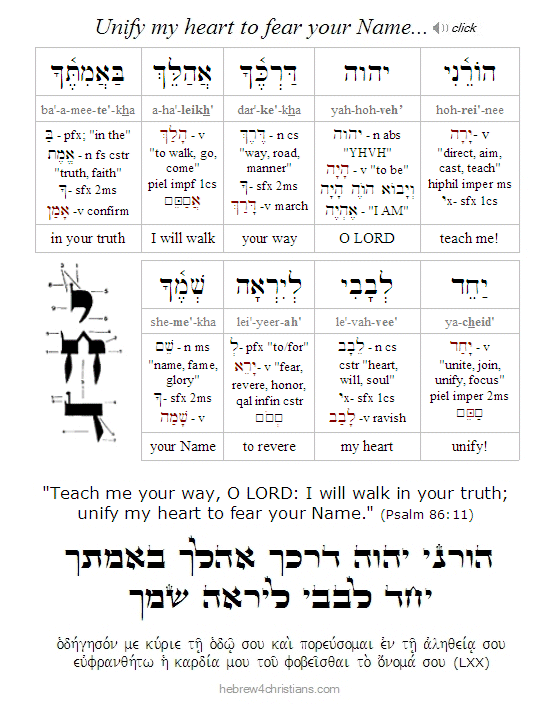 |
Forget not His Love...
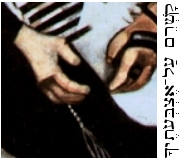
"We ought to give the more earnest heed to the things that we have heard, lest at any time we should drift away..." - Hebrews 2:1
11.12.24 (Cheshvan 11, 5785) If something is truly worth saying, it is worth saying more than once... We learn by repetition. Consider how Yeshua retold his parables and messages throughout his ministry. God knows we are dull of heart and full of ourselves and therefore he says: וזכרת את־יהוה אלהיך- "Now remember the LORD your God!" and "Take heed to yourself, and keep your soul diligently, lest you forget the things that your eyes have seen, and lest they depart from your heart all the days of your life" (Deut. 4:9). Likewise the Shema teaches us to rehearse Torah "diligently" - again and again - so that our lives are imbued in its language and its significance (Deut. 6:4-9). When we sit in our house, when we walk by the way, when we lie down, and when we rise up -- in every place and at every time -- we are to remember the truth and thereby walk before the Living God.
"Take heed to yourself..." This warning underscores the danger we face of "forgetting" God, of losing sight of the truth of reality, and thereby lapsing into the realm of the profane... We must, therefore, foster within us a state of ongoing vigilance that regards the greatness of God in the midst of our daily lives. "Give us this day our daily bread." Your life, your being, and your very existence come from God, but forgetting this leads to "tohu va'vahu," a life of vanity and chaos. Therefore practice God's presence; believe to see the goodness of the LORD in the land of the living. The language God uses bespeaks his imperative passion for us: "Do not forget me! Keep your heart open to my Presence! Know me in all your ways..."
Hebrew Lesson
Deut. 4:9a reading (click):
Eyes of the Heart...
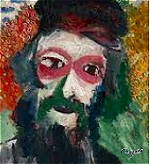
"Turn around and believe that the good news that we are loved is better than we ever dared hope, and that to believe in that good news, to live out of it and toward it, to be in love with that good news, is of all glad things in this world the gladdest thing of all." - Buechner
11.11.24 (Cheshvan 10, 5785) Yeshua told us: "Blessed are those who have not seen and yet have believed" (John 20:29). Despite the struggle of this life - our sorrows, pains, and even death itself - we believe in God's love and promise for us, even if we do not presently see the fulfillment of our hope, just as Abraham believed the promise that he would be the father of an innumerable multitude long before he saw any sign of its fulfillment. Abraham "believed the impossible" and "hoped against hope" (παρ᾽ ἐλπίδα ἐπ᾽ ἐλπίδι), meaning that hope moved within him even though there was nothing to see in the realm of the natural -- he believed in an unseen good; he trusted in the One who gives life to the dead and who "calls into existence the things that do not exist" (Rom. 4:17).
The Scripture comments: "He did not weaken in faith when he considered his own body, which was as good as dead (since he was about a hundred years old), or when he considered the deadness of Sarah's womb. He did not stumble over the promise of God through unbelief but was strong in faith, and gave glory to God, fully persuaded that God was able to do what he had promised, and that is why his faith was counted to him as righteousness" (Rom. 4:19-22).
Likewise we are called to believe in an unseen good, an unimaginably wonderful destiny for our lives, as it says, "Things no eye has seen, nor ear heard, nor mind imagined, are the things God has prepared for those who love him" (1 Cor. 2:9). Faith does not use natural reason or the evidence of the senses to see the unseen, but it "believes to see" through "eyes of the heart" to know the hope of God's calling and to attain the blessing (Eph. 1:18). Faith in God's love comes from a different source and has a different means of apprehension than human wisdom, so that no matter how things might appear in this fallen world, the LORD God may be known and trusted to work all things for our ultimate good. "Blessed are those who have not seen and yet have believed." Amen.
Hebrew Lesson:
Psalm 27:14 reading (click):
Parashat Vayera (וַיֵּרָא):
God Provides the Lamb...

11.11.24 (Cheshvan 10, 5785) Our Torah reading for this week (Vayera) is very dramatic and extraordinarily prophetic. Among other things (including the miraculous birth of Isaac, the fiery judgment upon Sodom and Gomorrah, the fate of Hagar's son Ishamel, and so on), the reading includes what I have called the "Gospel according to Moses," that is, Moses' account of how the patriarch Abraham was tested by God to offer his "only begotten son" (בֵּן יָחִיד) Isaac as a whole-burnt offering sacrifice on Mount Moriah -- the place of the future Temple. This astonishing story is referred to as the Akedah (עֲקֵדָה), or Akedat Yitzchak (עֲקֵידָת יִצְחָק) - the "binding of Isaac" (Gen. 22:1-18). As Abraham lifted up his knife to slay his beloved son, at the very last moment, the Angel of the LORD (מַלְאַךְ יהוה) stopped him from going through with the sacrifice, and a ram "caught in a thicket" was offered as the vicarious substitute. Upon offering the sacrifice Abraham named the sacred location Adonai-Yireh (יהוה יִרְאֶה), "the LORD will provide/see" (from the 3ms imperfect of the verb ra'ah (רָאָה), "to see").
The binding of Isaac perfectly illustrates both the principle of sacrificial love and the principle that we must first unreservedly believe in that love in order to understand the ways of the LORD. Those who believe in Yeshua further understand the Akedah as a foreshadowing of the ultimate sacrifice the heavenly Father would give on our behalf. Unlike Abraham, God the Father actually offered His only begotten Son (בֵּן יָחִיד) at Moriah in order to make salvation available for all who will believe (John 3:16-18; 1 John 4:9). As Abraham himself confessed: אֱלהִים יִרְאֶה־לּוֹ הַשֶּׂה / Elohim yireh-lo haseh ("God will provide for himself the lamb"). Later Yeshua told the leaders of Israel that Abraham had "seen His day" and understood the deeper meaning of the Akedah sacrifice (John 8:56).
Hebrew Lesson
Genesis 22:8a reading (click):
As I've mentioned over the years, the very first occurrence of the word love in the Scriptures (i.e., ahavah: אַהֲבָה) refers to Abraham's love for his "only" son who was to be sacrificed as a burnt offering on Moriah (the very place of the crucifixion of Yeshua), a clear reference to the gospel message (Gen. 22:2; John 3:16). Some scholars have noted that the word ahavah comes from a two-letter root (הב) with Aleph (א) as a modifier. The root means "to give" and the Aleph indicates agency: "I" give (i.e., the Father gives). Love is essentially an act of sacrificial giving... The quintessential passage of Scripture regarding love (αγαπη) in the life of a Christian is found 1 Corinthians 13: "Love seeks not its own..."
Whereas the Akedat Yitzchak foreshadowed God's provision for the coming Temple, the Akedat Yeshua (i.e., the crucifixion of Yeshua at Moriah) was the altar where the justice and chesed (love) of the Father fully met (Psalm 85:10). For more on this incredibly rich subject, please see the articles, "The Passion of Isaac" and "The Sacrificed Seed."
Hebrew Lesson:
Genesis 18:1 reading (click):
Promised Son of Abraham...
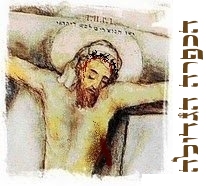
This entry continues from last week's Torah portion, Lekh-Lekha. I share this to connect with our Torah reading for this coming week (Vayera) in order to make evident the larger themes and threads of the Torah and how they are connected with the blessing of our Messiah Yeshua....
11.10.24 (Cheshvan 9, 5785) In the "Gospel in the Garden" I considered the very first prophecy given in the Torah, namely, God's promise that through the "seed of the woman" would come one who would slay the serpent and crush the kingdom of Satan (Gen. 3:15). This prophecy is sometimes called the proto-euangelion ("first gospel"), since it constitutes the starting point of all subsequent redemptive history revealed in the Scriptures. In a sense this promise forms the "womb" for the whole course of God's redemptive plan for the human race. The first prophecy of Torah clearly anticipated the coming of the Savior of mankind and a cosmic battle between good and evil: "... he (i.e., the Savior/Messiah) will crush your head (ראשׁ), and you (i.e., the serpent/Satan) will crush his heel (עָקֵב)."
It is likely that Eve initially believed that her firstborn son Cain (קַיִן) was the promised Seed himself. After all, the miracle of birth surely came as a great shock to her, and Eve's faith in God's promise that through her seed would come the deliverer was doubtlessly upon her heart at this time. When Eve called her son "Cain" (wordplay from the verb kana (קָנָה), "to get"), she was expressing her faith in God's promise: קָנִיתִי אִישׁ אֶת־יהוה / kaniti ish et-Adonai, "I have gotten a man - namely, the LORD" (Gen. 4:1). Eve's faith was obscured by the translators, however, who rendered the Hebrew as "I have gotten a man with the help of the LORD" (i.e., they inserted the idea of "help" and translated the particle et (את) as "with" rather than as the direct object marker for the verb). The ancient Jewish targums, however, agree with the original Hebrew. For example, Targum Yonatan reads: "I have gotten a man - the Angel of YHVH." Surely Eve, the first mother of humanity, was endowed with great wisdom from God, especially after she turned to Him in repentance after her disobedience. The straightforward reading of her words, then, expressed her hope that the LORD Himself would be made a man....
Despite her hope that Cain was none other than the God-Man and promised Deliverer, Eve's hopes were dashed when it became clear that her son was of the seed of Satan (1 John 3:12). His younger brother Abel (הֶבֶל) was a shepherd who evidenced faith in the promise of the coming redeemer by offering blood sacrifice (Gen. 4:3-5). Abel was persecuted and finally murdered by his brother Cain "because his own deeds were evil and his brother's righteous." Their spiritual conflict is indicative of the ongoing warfare between the "sons of darkness" and the "sons of light."
The murder of Abel necessitated that the coming seed would descend through another child, and therefore the Torah describes the birth of Seth (שֵׁת, lit. "appointed"), the third son of Adam and Eve. The Scriptures further state that it was the descendants of Seth who "began to call upon the Name of the LORD" (לִקְרא בְּשֵׁם יהוה), indicating that they had faith in God (אֱלהִים) as the Compassionate Covenant Keeper (יהוה) who would redeem humanity by means of the coming seed. Seth called his firstborn son Enosh ("man"), perhaps in the hope that his child would be the promised Savior (interestingly, bar enosh (בַּר אֱנָשׁ), or "Son of Man," is the name for the Savior (Dan 7:13).
The Torah then traces the genealogy (toldot) of Seth through ten generations (from Adam), until his descendant Noach (נחַ) is described as the only tzaddik (righteous man) remaining in the earth (for more on the genealogy, see parashat Noach). The promise of the coming seed would therefore come through Noah, since his family alone survived the great flood. Now Noah had three sons, but it was through Shem (שֵׁם) that the "line of the Messiah" would come. According to midrash, Noah announced his blessing near the end of his life. When he said, "Blessed be the LORD, the God of Shem" (בָּרוּךְ יהוה אֱלהֵי שֵׁם), he prophesied that the coming redemption would come through the line of Shem, not through Canaan or Japheth. Notice that the phrase, "he shall dwell (יִשְׁכּן) in the tents of Shem," is often thought to refer to Japheth, though the Hebrew grammar is ambiguous. Does the "he" in this case refer to Japheth or to the LORD? A viable translation would be "and He (i.e., the LORD) shall dwell in the tents of Shem," meaning that the LORD would dwell among the Shemites, and by extension, that the promised Seed would come from this line. In this sense, Noah's blessing to Shem was a prophecy of the coming Redeemer through Shem (similar to Jacob's blessing of Judah as the chosen tribe). Since the LORD is the "God of Shem" (יהוה אֱלהֵי שֵׁם), and the prophecy states that one day He (i.e., God) would "dwell in the tents of Shem," the Torah indicates that the coming Redeemer (הַגּוֹאֵל) would come from the Shemites, of whom the great patriarch Abram (אַבְרָם) descended.
The Torah identifies Abram as the tenth generation from Noah (including Noah), and therefore the twentieth from Adam. God called Abram out of Ur of Chaldea to begin a pilgrimage of faith to the land of promise (Heb. 11:8-10). The story of Abram is highly prophetic of the coming Messiah, and the promises given to him foretell of the advent of Yeshua in unmistakable ways. After the Akedah (i.e., the sacrifice of Isaac), God promised that "in your seed (זֶרַע) shall all the nations of the earth be blessed, because you have obeyed my voice" (Gen. 22:18). In light of the New Testament, the faith of Abraham - and especially the faith demonstrated by the Akedah - prefigured the justification of the nations through faith. Therefore we read: "And the Scripture, foreseeing (προοράω) that God would justify the nations by faith, proclaimed the gospel (προευαγγελίζομαι) beforehand to Abraham, saying, "In you shall all the nations be blessed" (Gal. 3:9). It is noteworthy that Abraham received this promise as a Gentile, since he was yet given the commandment of brit milah (circumcision) as a token of Jewish identity. Abraham was therefore uncircumcised when he believed the good news of the coming redemption of mankind (Rom. 4:10-12). Therefore the Apostle calls Abraham the father of faith for those Gentiles who would later believe the good news of redemption in Yeshua. "So then, those who are of faith are blessed along with Abraham, the man of faith" (Gal. 3:9; Rom. 4:16).
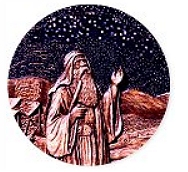
Genesis 22:18 clearly states that the blessing would come through Abraham's "seed" (זֶרַע). The Apostle Paul clearly identifies this seed with Yeshua: "Now the promises were made to Abraham and to his offspring. It does not say, "And to offsprings," referring to many, but referring to one, "And to your offspring," who is Messiah" (Gal. 3:16). In other words, the promises were made first to Abraham but also to the coming Messiah. This is yet another example of a "dual aspect" prophecy, since it pertains to Abraham and his chosen offspring (i.e., Isaac (not Ishmael), Jacob (not Esau), Judah (not Reuben), David (not Jesse's firstborn), Solomon (not Adonijah), etc.), but also to the coming Messiah who would redeem fallen humanity from the curse brought about through Satan (John 8:56). Abraham was chosen by God, in other words, to "deliver" the promised Savior to the world. "Salvation is from the Jews," of course (John 4:22), but the blessing of Abraham's promised Seed was ultimately meant to be bestowed upon all people, so that one day the Kingdom of God would be manifest within the sons and daughters of Adam (Gal. 3:14). This is also why Malki-Tzedek, the "priest of the Most High God," was the one who was appointed to bless Abraham, since he prefigured a priesthood that predated the one given later to the Levites through the office of Moses (Heb. 7:1-21).
The original curse of death and the division symbolized by Babel would be reversed through the sacrificial death, burial, and resurrection of Yeshua the Messiah: "And they sang a new song, saying, 'Worthy are you to take the scroll and to open its seals, for you were slain, and by your blood you ransomed people for God from every tribe and language and people and nation, and you have made them a kingdom and priests to our God, and they shall reign on the earth" (Rev. 5:9-10).
Hebrew Lesson
Genesis 22:18 reading (click for audio):
Father of the Faithful...

11.10.24 (Cheshvan 9, 5785) Abraham is called the "father of all who believe" in the miracle of the Promised Seed (הזרע הבטיח), that is, in the Coming Deliver who would bring redemption and healing to the whole world (see Gal. 3:16; Rom. 4:1-5:1). The Torah states that God chose Abraham because he would faithfully teach his children to guard "the way of the LORD" (דֶּרֶךְ יְהוָה), by trusting in God's acts of "righteousness and justice" (צְדָקָה וּמִשְׁפָּט) that He would perform according to his promise (Gen. 18:19). God regarded Abraham as faithful to retain His promise, and therefore He would manifest salvation (יְשׁוּעָה) through his descendants.
The "way of the LORD" refers to Yeshua, who is "the way and the truth and the life" (הַדֶּרֶךְ וְהָאֱמֶת וְהַחַיִּים), the Promised Seed that would crush the head of the serpent in the battle for our redemption (Gen. 3:15). Abraham's faith was directed toward the Deliverer to come, as Yeshua said: "Abraham rejoiced to see my day; and he saw it and was glad" (John 8:56). Likewise we guard the way of the LORD as our father Abraham did namely, by trusting in God's promises given to us in Yeshua our Messiah.
We are chosen to embody the same heart, vision, and mission of Yeshua our LORD, to exist as "extensions of his presence" in this world, and therefore we are also called to walk uprightly, as he walked... Indeed, the Hebrew word derekh (דֶּרֶךְ), usually translated as "way," metaphorically refers to the journey, manner, or course of your life. Because God is tov v'yashar (good and upright), he teaches his children to be yesharim (יְשָׁרִים), i.e., those who walk uprightly. Indeed, the way of the LORD (דֶּרֶךְ יהוה) is "to do acts of charity and justice" (לַעֲשׂוֹת צְדָקָה וּמִשְׁפָּט) (Gen. 18:19). This is the "straight way" (derekh ha-yashar), or the "narrow path" that leads to life (Matt. 7:14).
טוֹב־וְיָשָׁר יְהוָה
עַל־כֵּן יוֹרֶה חַטָּאִים בַּדָּרֶךְ
"Good and upright is the LORD
therefore will he teach sinners in the way." (Psalm 25:8)

Hebrew Lesson
Psalm 25:8 reading (click):
Note that the verbal clause "he will teach" (i.e., יוֹרֶה) used in this verse comes from the root yarah (ירה) -- the same root used in the word "Torah" (תּוֹרָה). Because the LORD is good and upright, He gives us Torah (direction) for our lives. God educates us for eternity by imparting to us moral and spiritual truth. As King David taught, "Happy is the man who delights in the Torah of the LORD and meditates upon it day and night" (Psalm 1:1-2).
Blessing the Jewish People...
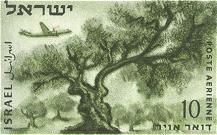
The following is related to our Torah portion for this Shabbat, parashat Lekh-Lekha...
11.09.24 (Cheshvan 8, 5785) Do you have a Jewish heart? If you say that you love the "LORD God of Israel" (יהוה אֱלהֵי יִשְׂרָאֵל) -- and it's clear that the LORD God of Israel loves the Jewish people -- it follows that you likewise will love the Jewish people (see Deut. 7:6-8; 14:2; 2 Sam. 7:23-24; 1 Kings 8:53; 10:9; 1 Chron 17:20-21; Isa 43:1-3; Jer. 31:31-37; Ezek. 36:24-28; Rom. 11:1-2;11:28; Hos. 11:1-11, etc.). After all, the LORD Yeshua is called מֶלֶךְ הַיְּהוּדִים / melech ha-Yehudim: the "King of the Jews" (Matt. 2:2, 27:11, etc.), and the very term "Mashiach" [i.e., "Christ"] is a regal term denoting the anointed King of Israel.
Christians who pray to "Jesus Christ" are really praying to Yeshua as the anointed King of the Jews... And one day (very soon) Yeshua will indeed return to Jerusalem, the "City of the Great King" (Matt 5:35), to assume the throne of David and complete the redemption originally promised to the Jewish people (Zech. 12:1-13:1; 14:1-9, Ezek. 37:12-14, etc.). God will prove faithful to ethnic Israel, friends, and to deny this is to radically question God's faithfulness to the "Church." Indeed, let me say this as plainly as I can: Churches or teachers who claim that God has abandoned ethnic Israel are directly impugning the credibility of the Gospel message itself. Yes, it's that serious of an issue...
Note the verse in our Torah reading that says, "I will bless those who bless you, but the one who discounts you will be cursed" (Gen 12:3). Why is this the case, chaverim? The answer is found in the second half of the verse: "For in you all the families of the earth shall be blessed" [i.e., through the advent of your Seed, the Messiah]. We cannot impugn the promises of God given to the Jewish people without likewise impugning God's promises given to us in Messiah. To say that God is "done with the Jewish people," or to consign them to a dark fate, is to disregard them, to curse them, and that results in reciprocal judgment from heaven.
Hebrew Lesson
Genesis 12:3 reading with comments (click):
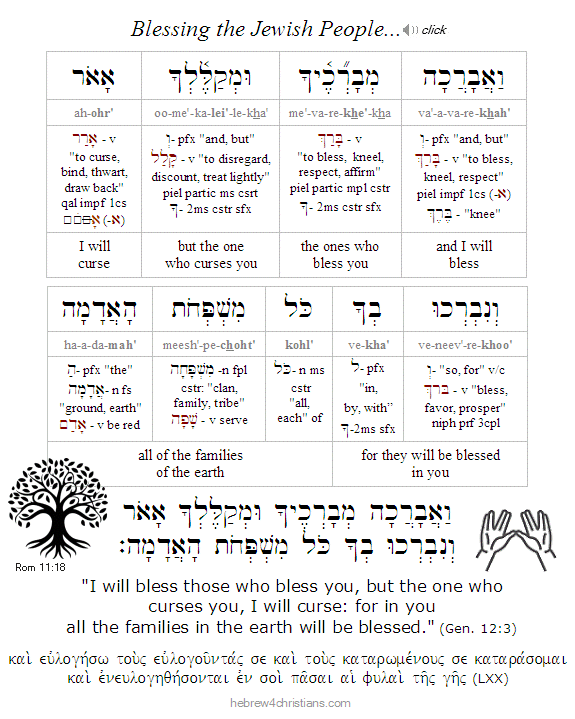 |
The physical descendants of Abraham are called בָּבַת עֵינוֹ (bavat eino), the "pupil of God's eye" (Zech. 2:8), a term of endearment that the LORD uses for no other nation on earth. Indeed the very habitations of the nations were established based on the number of the children of Israel (see Deut. 32:8). The Scriptures declare that the LORD will never abandon His original covenant people but will yet choose them for His Name's sake (Isa. 14:1). The church has not replaced Israel in God's redemptive plan but is merely "grafted in" to the original "root" of Israel. "Remember," Rabbi Paul warns, "it is not you who support the root, but the root supports you" (Rom. 11:18). "Blessed be the LORD God of Israel From everlasting to everlasting! And let all the people say, "Amen!" (Psalm 106:48).
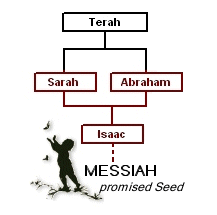 |
Note: Please don't regard the "curse" mentioned in Genesis 12:3 to suggest that God is somehow vindictive, petty, etc. No, the reason the curse befalls those who reject God's plan for Israel is because Israel was the means God chose to bring salvation to the world: Yeshua was born the King of the Jews who came to ransom all those who trust in him from the curse of spiritual death (Gal. 4:4, Rom. 3:2, John 4:22). The reason God can't bless people who hate the Jewish people or Israel is because that would mean he would bless those who hate the truth, who spurn salvation, and who love darkness... The same God who promises us life and healing in Yeshua is the one who promised never to cast of Israel or to eternally disown the Jewish people. To paraphrase C.S. Lewis, God cannot give us a good apart from himself, since there literally is no such thing.
Related Topics:
Righteousness of Heart...
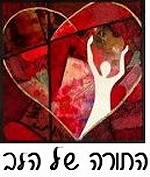
11.09.24 (Cheshvan 8, 5785) From our Torah reading for this Shabbat (i.e., Lekh-Lekha) we learn about the resolute faith of Abram who, despite his old age, trusted that God would make his descendants as numerous as the stars in the night sky: "And the LORD brought him outside and said, "Look toward heaven and count the stars, if you are able to number them." Then the LORD said to him, "So shall your offspring be. And he trusted in the LORD, and He regarded it to him as righteousness" (Gen. 15:6).
Abram "staggered not" at the promise of God, and therefore God imputed to him righteousness (צְדָקָה), a term understood here to be divine esteem and grace. After all, what could Abram do in the face of seeming impossibility? There was nothing he could do to bring about such a miracle. The New Testament comments: "He did not weaken in faith when he considered his own body, which was as good as dead (since he was about a hundred years old), or when he considered the barrenness of Sarah's womb" (Rom. 4:19). It was in a state of utter powerlessness and complete helplessness that Abram retained hope and thereby received the promise by faith. "For he was beyond hope, yet in hope he trusted that he would indeed become a father to many nations, in keeping with what he had been promised, 'so shall your offspring be'" (Rom. 4:18).
Understand that 400 years before the law was given at Sinai, the LORD regarded the faith of Abram as the essence of the righteousness later prescribed by the laws of Torah. Therefore the very First Commandment of the Ten Commandments is simply: Anochi Adonai Elohekha (אָנכִי יְהוָה אֱלהֶיךָ): "I AM the LORD your God" (Exod. 20:2), which repeats the call to trust God before everything else, since it is complete surrender to the love and grace of God that justifies us, as it is written: "to the one who does not work but trusts in the One who justifies the ungodly (i.e. the helpless), his faith is counted as righteousness" (Rom. 4:5).
Where the LORD says "Look toward heaven and count the stars, if you are able to number them," we note the Hebrew word "count" (סָפַר) may also mean "recount," "interpret," or "explain"... This is the same word used in the famous verse, "The heavens declare (מְסַפְּרִים) the glory of God" (Psalm 19:1). The idea here would be not merely that Abram would have lots of descendants, but they would shine in brilliance against the backdrop of the darkness. Abram's children would be lights upon the earth, declaring the truth of God and enlightening the darkness of mankind. "And those who are wise shall shine like the brightness of the sky above; and those who turn many to righteousness, like the stars forever and ever" (Dan. 12:3). In the same way, Yeshua said: "let your light shine before others, so that they may see your good works and give glory to your Father who is in heaven" (Matt. 5:16; 13:43).
O precious LORD, may your light shine within us always....
Hebrew Lesson
Genesis 15:1b reading (click for audio):
|

































